#this isn’t even about 1 person in particular because I’ve seen this happen multiple times
Explore tagged Tumblr posts
Text
Sick of finding out the creator of an amazing book series, cartoon series, anime, etc.. Or artists, musicians, writers, etc. in general
is/was a terrible person…
Especially when the morals in their work completely contradicts what they actually stand for irl…
Bonus points if the fandom is terrible as well…
Why is this such a common thing??
#nat speaks#fandoms#the series be like: *always love yourself however you turn out to be*#then you find out the creator is a massive transphobe#and the fandom regularly sends death threats to each other#this isn’t even about 1 person in particular because I’ve seen this happen multiple times
2 notes
·
View notes
Text
“but I thought about how I needed to say this”
a.k.a. yet another meta dissection of The Apology. I actually wrote most of this up on Friday night based on the original Japanese (@pikahlua has an excellent translation up here, and I also used @hanashimas’ translations as a reference as well), but I wanted to wait until the official release, though that turned out to be a mixed bag to say the least lol.
I would also recommend reading @pikahlua and @class1akids’ breakdowns of this scene (here and here, respectively), because they are excellent, and because if any scene deserves to have as many meta breakdowns written about it as possible, it’s this one.
anyway so here goes.

Caleb did a more accurate job with this than the fanscan, even if he did try his best to take us out of the seriousness of the moment by throwing in that swiss cheese line lol. anyway so there are two things I want to talk about here. the first is the line about Izuku not remembering, which I thought was a nice touch. of course he doesn’t remember what Kacchan said back then. he wasn’t exactly in the soundest emotional state after seeing one of the people he cares about most taking a near-fatal blow that was meant for him. I’d be shocked if he remembers anything about the aftermath (including the way he flew into a mindless rage afterwards) right up until the point when he entered the OFA Interstellar Party Void with Tomura. anyway, so I thought that was a nice callback.
and speaking of emotional states, the other thing I wanted to talk about is the part that Caleb got right which the fan scanlation didn’t. “but I had more to say.” in other words, “stop trying to win on your own” wasn’t just a one-liner; it was meant to be the beginning of a much longer speech. “there were other things that I needed to say.”
like, can we just stop and talk about that for a second. because basically what this means is that in that instant, when Kacchan pushed Deku out of the way and got impaled, his one and only thought was that he needed to apologize to Deku. his life was presumably flashing before his eyes, he had no idea if he was going to survive or not, and the only thing on his mind was how urgently he needed to make things right with his former childhood friend.
moving on!
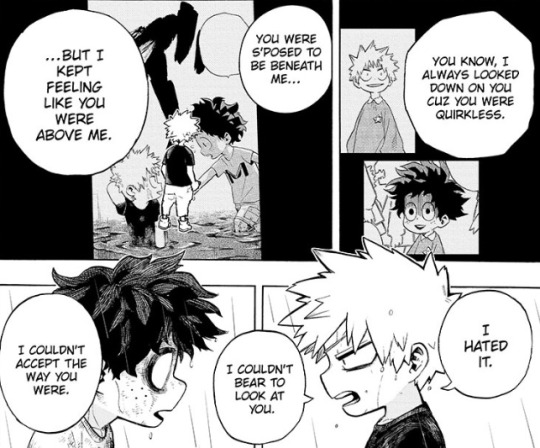

so I have a confession to make, which is that I am relieved to see Katsuki describing this as the reason why he bullied Deku, as opposed to Horikoshi trying to retcon it into some sort of “secretly he was just trying to protect him and keep him out of harm’s way because he was worried” thing, which ngl would not have gelled very well with me. the thing is that I’m really not a fan of the whole “Kacchan Did Nothing Wrong” mentality that some fans seem to have. like, I have seen all sorts of convoluted attempts to find excuses for Katsuki’s shitty behavior, but in my view those attempts undermine what I love about his character in the first place. Katsuki is such a great character specifically because he is not perfect. his redemption arc is so compelling because he was such a giant asshole at the start. he was completely at fault, and he acknowledges this, and takes full responsibility for it. and that is fucking fantastic.
his arc is so great because it doesn’t rely on garnering sympathy by giving him a Tragic Past, or by trying to foist the blame for his behavior over on someone else. it’s an arc that acknowledges that redemption isn’t something you achieve by making people feel sorry for you; it’s something you have to earn by actively working to change and do better. and by forgoing the “misunderstood/tragic past” route, Horikoshi is making a statement that anyone can go down the wrong path, but that more importantly, anyone can also choose at any time to turn away from said path. there is only one requirement for doing so, and that is realizing that you’ve done wrong, and deciding that you want to change.
anyway, so in chapter 284 Kacchan of course had that whole speech about Deku not taking himself into account, and mentioned how that made him want to keep his distance. and a good chunk of fandom took this to mean that Katsuki’s bullying was actually a misguided response to Deku’s reckless tendencies -- sort of an “if I show him how weak and powerless he really is, I can get him to accept the reality that he’s quirkless, and that being a hero will just get him hurt or killed” type of thing. and I won’t lie, for a good while I was wondering myself if Horikoshi was really going to go down that route. and like I said, I am honestly relieved that he didn’t. not only for the reasons stated in the previous paragraph, but also because the message that would have sent -- that there are certain circumstances in which bullying can almost be excused because the bully had Good Intentions and was just trying to save the other person from themselves, and so it Wasn’t That Bad, Actually -- is all kinds of fucked up to say the least. so yeah, I’m glad we ended up steering well clear of that.
(ETA: this post was long enough already so I edited out the 3 additional paragraphs I originally wrote analyzing the dialogue from 284. but just to be clear, I’m not trying to imply that Kacchan worrying about Deku’s recklessness is a retconned thing that Horikoshi only threw into the story recently, because there are multiple instances throughout the story where he clearly is worried and in total denial of it. but I firmly believe those feelings are not what led to the bullying. they’re two separate things. Kacchan worrying about Deku is what prompts him to yell at him in chapter 1 when Deku comes to save him. but it’s not what incited him to burn his notebook and taunt him earlier in that same chapter. that action had a much meaner and more selfish motivation behind it, and I’m glad Horikoshi didn’t try to change it up last minute, because it wouldn’t have felt right.)
thankfully as of this chapter I think we can safely cross that out as a possibility, as we’re given the true explanation straight from Katsuki himself. and the truth is that he bullied Deku out of insecurity and jealousy and fear and intolerance. there was nothing noble about it. there were no good intentions concealed in his actions. there are no justifications given, no excuses offered, and no mitigating circumstances to be considered, other than the fact (which neither he nor Horikoshi bring up) that he was and is still a child, and that children make mistakes.
it’s an explanation that challenges many of fandom’s ideas on who is and isn’t eligible to be redeemed. there is no Ozai in Katsuki’s backstory. there’s no great tragedy that he spent a lifetime trying to rise above. the only villain in Katsuki’s story is Katsuki himself. the only darkness that he has to overcome is his own. and it’s challenging, because I think many people believe the only way someone can be redeemed for doing bad things is if bad things happen to them in return. but what Horikoshi is saying here is that that’s not the case. bad doesn’t erase bad. and the one and only way to truly earn redemption is by doing good.
and that’s what makes this such a phenomenal scene for me. by not shying away from Katsuki’s flaws and failings, and having him take full responsibility for them, Horikoshi keeps the apology from being self-serving, and underscores the true depth of Katsuki’s character development. the level of self-awareness he has here is something most people can only dream of. which is very fitting, as that’s perhaps the most important takeaway from his character arc -- that it’s only by acknowledging your own weaknesses and flaws that you can learn to overcome them and reach your full potential.
one last thing to point out here, which is that in the panel where Katsuki finally acknowledges his terrible treatment of Deku, Deku is not even visible. instead, Horikoshi drew the panel from a perspective that makes it appear that Katsuki is addressing this particular line not just to Deku, but to all of his classmates.

again, he shows him taking full responsibility and admitting his wrongdoings in front of the people whose opinions and approval he cares about most. and just to clarify in case there’s any confusion from Caleb’s translation, Kacchan’s wording makes it very clear that he wasn’t just “mean” to Deku, but that he full-on bullied him (he uses the same verb -- “ijimeru” (苛める) -- that he did back in chapter 284). there’s no attempt to downplay his actions here.
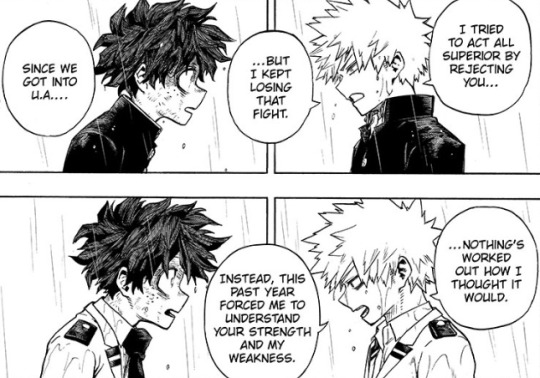
moving on now, this chapter also reaffirmed another thing about Deku and Kacchan’s relationship which I was glad to see revisited -- Kacchan’s unwavering belief in Deku’s ability. this is one of those paradoxical things about their relationship which I’ve always been fascinated by, but which is also kind of hard to explain, because I don’t want it to come off like I’m trying to put a positive spin on something which was unequivocally awful. like, please don’t think I’m trying to say that Katsuki’s bullying of Deku was in any way a good thing. but that being said, there’s also a strange irony at play here, which is that Katsuki’s jealousy and insecurity also betray the fact that even at his very worst, he never once underestimated Deku. he has always believed in Deku’s strength, even when that strength pissed him off and made him afraid and uneasy.
no one else -- not All Might, or even Deku’s own mom -- believed from the get-go that Deku could become a hero. but Katsuki never once counted him out, even when he was calling him a pebble in his shoe. he confesses here that even though he “tried to act superior by rejecting [Deku]”, in truth he was never able to shake the feeling that Deku was above him. long before he ever understood the concept of “win to save”, he knew instinctively that there was a strength in Deku’s heart that couldn’t be measured, and which had the potential to surpass even his own strength. and I’ve always felt that this was so important, because it’s the one aspect of their early relationship that hinted that on some level, however subconscious, Katsuki held the same type of faith in Deku that Deku always held in him. it was one of the few things that hinted at there being a possible path towards reconciliation one day. and it paved the way for the most important shift in their relationship to date, when Katsuki finally realized who Deku got his quirk from, and responded not with resentment or spite, but with acceptance.
moving on, I also really love the way we see them portrayed at the different stages of their childhood throughout this speech, and how it perfectly lines up with the dialogue. from small children (when Katsuki talks about his insecurities first manifesting), to middle schoolers (when he talks about the bullying), to high schoolers (when he talks about the past year and everything he’s learned at U.A.). Horikoshi really didn’t have to go that hard, but he did, and that’s why we love him.
and then we finally get to That Part.
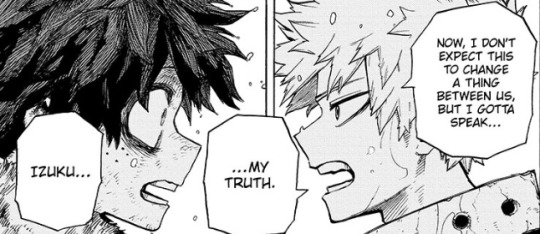
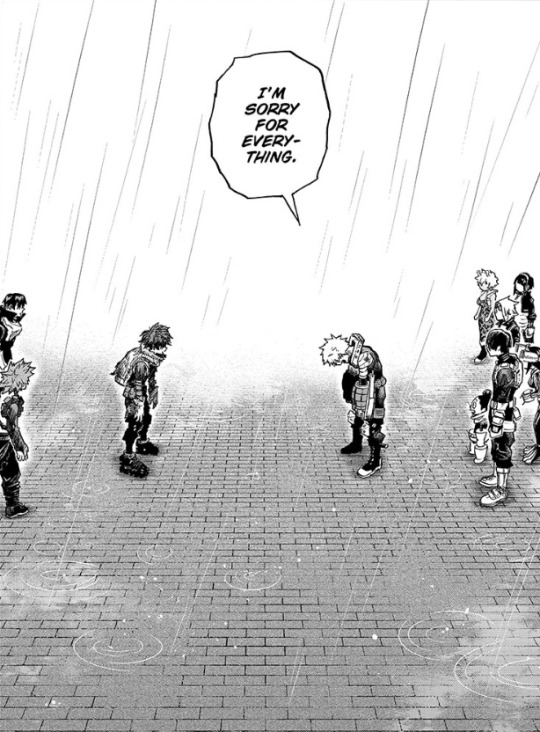
where do I even start with this there are so many things omg.
the bow. this is the one and only time Katsuki has ever bowed to anyone of his own volition as far as I recall. and this absolutely is a bow, just to be clear, even though his form is straight-up garbage (very Kacchan-esque, with his feet and arms spaced apart because he’s still a punk after all). this is Kacchan showing more humility and respect than he’s ever shown to anyone else in his entire life.
regarding “Izuku”, I actually have mixed feelings about this to tell the truth. I think it was a good call here because it was incredibly effective in setting the tone and showing just how serious Kacchan is. however if he continues to use “Izuku” rather than “Deku” from here on out, that would give the impression in hindsight that all his past usage of “Deku” really was meant as an insult, which would undermine some of my favorite scenes. I would really like to believe that since DvK2 or thereabouts, Kacchan has (mostly) been using “Deku (affectionate)” rather than “Deku (useless loser)”, lol. but if he switches to the “nicer” name on a permanent basis following his apology, it implies that the previous nickname was indeed being used cruelly. and so honestly I hope this was just a one-time thing, because I do think that in Katsuki’s mind, the name “Deku” hasn’t been meant as a slight to him for a long time now.
“my truth/this is what I truly feel” -- the word Katsuki uses in Japanese is honne (本音), and if you’re familiar with the concept of honne/tatemae, that’s the same “honne” he’s talking about here. it means that he’s casting aside all of his walls and facades and expressing what he truly feels. and of course, one of the fascinating things about Katsuki’s character is that he’s the exact opposite of most people in that he chooses to put his meanness on full display to the public, and ironically it’s the kindest parts of himself which he tends to keep the most carefully guarded and hidden away. this also means that while his rage and anger are very often insincere and put on just for show, those relatively few occasions where he lets his humanity truly shine through are pretty much 100% genuine, as is the case with this one here.
and Deku’s face says it all when it comes to how powerful those moments can be as a result.
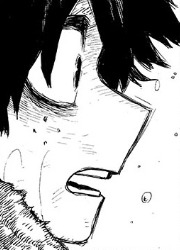
and this, right here, is why it wasn’t enough for Katsuki to atone solely through his actions, and why he needed to actually say the words as well. it’s not that the words are more important; obviously the actions are far and away the most important part, and carry far more meaning. but the reason why Katsuki needed to say the words as well is simply because Izuku needed to hear them. needed to, and deserved to, because this is one of the most important people in the world to him.
and so he deserves to know that the relationship isn’t just one-sided, and that he is just as important to Kacchan as Kacchan is to him. he deserves to know that Kacchan understands how horribly he treated him, and that he’s sorry for it. and he deserves to know that Kacchan, without any expectation of it changing their relationship -- meaning that he will continue to feel this way regardless of what Izuku says or does from here on out -- cares about him. now more than ever, with AFO out there doing everything in his power to make Izuku feel as alone as possible, this is something that he really, really needed to hear.

so this part has some interesting wordplay which neither Caleb’s translation nor the fan scanlation was really able to get across. basically, in the Japanese version, when Katsuki talks about “those ideals”, Horikoshi uses the kanji for “ideal”, but pronounces it as “All Might.” obviously the meaning of this isn’t too hard to decipher, as we all know how much both boys admire All Might. to them, he absolutely is synonymous with the Ideal. so this is a way of showing that respect they both have towards him, even as Katsuki goes on to point out the one fatal flaw that All Might was never able to overcome.
and speaking of interesting wording, as others have noted, at this point in his speech Katsuki switches from “temee” (which he was using earlier during the “your strengths and my weaknesses” part) to “omae” (“omae” being a less insulting word for “you”, though still very manly and tough-sounding), which is definitely a big deal. though fwiw this is not the first time he’s used “omae” for Deku (he switches to it briefly right after DvK2, when he tells Deku “you had the strongest guy lay the groundwork for you -- don’t lose”, and then later when they’re walking back to the dorms and he says he’ll learn and get stronger by watching everyone around him just like Deku did). it’s definitely a good choice on Horikoshi’s part though, as it makes this last part of the speech sound more earnest and sincere.

just a quick note, he does indeed use a plural pronoun here, as in “the obstacles that you can’t overcome, we will overcome.” but as @pikahlua pointed out, the “we” here is ambiguous -- it could either mean “we” as in class 1-A -- “we will overcome them for you” -- OR it could mean “we” as in all of them -- class 1-A and Deku. “we will overcome them together.” idk about you, but I know which one gets my vote.
anyway, and so this is the line that finally wins Deku over and allows him to let go of his fears, however briefly. what I love about this is Kacchan’s utter conviction. one thing that Caleb’s translation doesn’t quite get across is Kacchan’s use of the word morenaku -- “without exception” -- when he talks about how they’re going to save everyone and win. it echoes that same sentiment he showed back during the Joint Training arc -- that it’s not a perfect victory unless they save everyone. every last person. and he explicitly lists Deku among their number, just so there can be no doubt.
and Deku’s response to this (or at least his thoughts, since he’s not really able to get many words out) pretty much brings everything full circle here.

he acknowledges that everyone else has gotten ahead of him. which is especially meaningful given who he’s standing directly across from. because for most of the series, as we all well know, it’s been Kacchan who was woefully lagging behind Deku in the character growth department. but now Deku himself is acknowledging that not only has Kacchan finally caught up at last, but that he and the others have surpassed him. which is only temporary, I should add, as I have zero doubt that Deku will catch up again soon. but the fact remains that just as Deku’s rapid increase in strength and skill left Kacchan scrambling to keep up earlier in the series, Kacchan’s extraordinary character development has now left Deku in that same position. as All Might once put it, “when he’s starting at level one, and you’re already at level 50, it’s only natural that you’ll be growing at different rates.”
and what’s so wonderful about this though is that the two of them are finally approaching that point where they’ve both caught up to each other and are finally starting to level out. Deku is a full-on badass, and Kacchan is out here talk-no-jutsuing with the best of them. the two of them have been chasing and chasing after each other this entire time, and now they’re finally just about ready to meet in the middle at long last, with each of them fully embodying both of those two crucial aspects -- win, and save.
just about. because Deku still needs some help catching up. but seeing as help has already been offered -- and accepted -- I can’t imagine it will be very long now, and I can’t wait to see him finally overcoming those fears and doubts with his friends by his side. it’s going to be such a powerful moment.
and last but not least,
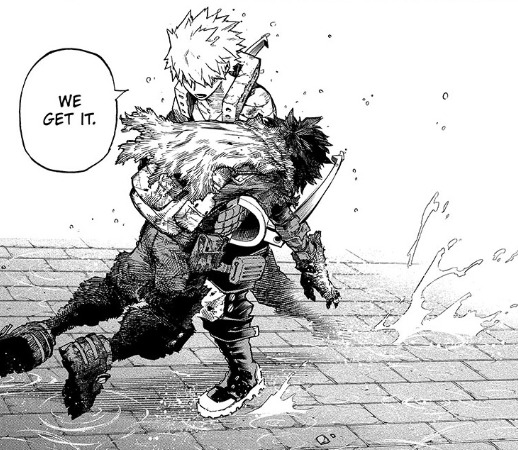
or, as I prefer,
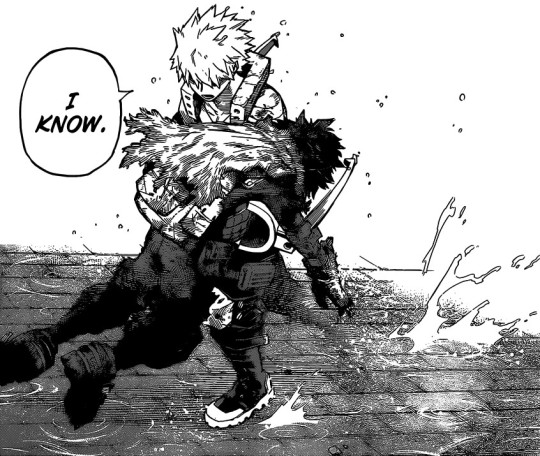
you had one job, Caleb. flkjsdlk.
but at least this provides a good opportunity to note that unlike the “we’ll help you handle it” line earlier in the speech, here the phrasing is left up to interpretation, as he doesn’t use a pronoun. so it could be “we know”, or, as the fan scanlation put it, “I know.” or it could be both. regardless, it’s good stuff.
anyway, and so Deku passes out, and in the process Horikoshi gives us one last parting metaphor, just in case anyone still thinks Kacchan is all talk because they haven’t been paying attention for the past 322 chapters (more likely than you think). once again, Katsuki’s actions speak louder than his words (even his nice words) ever could: he is literally there to catch Deku when he falls.
so that’s it! my sincere thanks to anyone who actually read through all of my endless ramblings about this scene which I have been waiting for since day one. props to Horikoshi for taking on an impossibly difficult task, and pulling it off with all of the emotion and care and nuance that I’ve come to expect from his writing. imo he delivered on every single level with the exception of the aftermath, which I don’t consider to have actually happened yet. Deku’s part of this is definitely a “to be continued.” but yeah, as far as Kacchan’s part goes, 10/10. so fucking proud of this kid.
#bnha 322#bakugou katsuki#midoriya izuku#bakudeku#bnha meta#bakugou meta#deku meta#bnha#boku no hero academia#bnha spoilers#mha spoilers#bnha manga spoilers#makeste reads bnha
563 notes
·
View notes
Text
@lansplaining encouraged me to finish this random meta nobody asked for, so let's talk about Meng Yao, Meng Shi, and 孟母三遷 (mèng mǔ sān qiān), a proverb about good parenting.
A warning: this is super long (even for me!) and is less quality meta and more my ADHD brain jumping around a maze of loosely related ideas. Proceed with caution!
Let me start by briefly going through why I decided to write this, because it’s important. In haunting Meng Shi’s tag in my starvation for Meng Shi content, I’ve multiple times come across the idea that Meng Shi pushed Meng Yao too hard, that she should’ve been more careful with teaching him to seek his father’s approval at any cost, and that she was too naïve. I’ve never reblogged this kind of post because 1) I personally think it’s rude to go out of your way to ramble about how much you disagree with someone on their own post and 2) if this was an isolated incident I wouldn't care either way, so I didn’t want to direct this rant at anyone in particular. It’s more to do with a tendency, primarily (as far as I can tell) from fans who haven’t had much contact with Chinese culture, to oversimplify Meng Shi and make her relationship with Meng Yao slightly disturbing, and I think part of it is due to CQL basically cutting out her entire storyline (so fans simply don’t have info about her to assess her fairly) and part is due to misunderstanding what a good parent is supposed to act like in the context of Ancient China.
[Of course, Ancient China is not a very useful historical concept, not any more than “ye olde Europe” - things change a lot based on time and place - but you know. It’s fantasy. Extremely broad trends are okay in this case.]
Anyway, the idea behind the posts I mentioned is, basically, that Meng Shi (usually through no fault of her own) is to blame for Meng Yao’s obsession with power, since his desire for approval was inherited from lessons she taught him. Just to start with, I’d argue that Meng Yao isn’t power-hungry as much as he craves security and respect, but that’s a different meta. Let’s assume that she really did teach him to be Like That. Was she wrong to do so? I’m not looking for “does that make for a happy, well-adjusted childhood?” or “would you raise your own son as Meng Shi did?” - I’m trying to figure out, would she have been considered a bad mother in the context of the society she lived in? I don’t think she would’ve.
It is surprisingly hard to find texts about the obligations of parents in Ancient China. Their main obligation is to raise filial children, but I feel like that’s not very useful: whether or not parents are good parents, children are expected to be filial, so a child being filial really says more about the child than about the parent. Maybe the parent completely missed the mark and society at large was what taught the child to be filial!
We can assume, of course, that parents were to raise good people, and that by learning what a good person looked like, we could figure out whether the parent was successful, but once again, I feel like that’s pinning things on the outcome, not on the process - the best of parents can end up with an awful kid and vice versa.
While thinking about all this, it took me a frankly embarrassing amount of time to remember the story of Mother Meng and Meng Zi, but once I did, it wouldn’t leave my mind - in part because the Meng here is the exact same Meng of Meng Shi and Meng Yao (yay! fun if useless parallel!), and in part because this is a story about how a woman can successfully raise a son by herself.
Okay, so important note: one of the most influential ancient Chinese thinkers is Meng Zi (孟子 Mèng Zǐ), who is known in the West as Mencius. If you've never heard of him - he's perhaps second in importance only to Confucius. When Mencius was still a young child, his father died, so he was raised by his mother, who is usually known only as Mother Meng (in Chinese, 孟母 Mèng Mǔ.)
Mother Meng's story is told in Biographies of Exemplary Women (列女傳 Liènǚ Zhuàn), which for around 2000 years beginning around the 18th century BCE, was the most commonly used book used to educate women. The book is divided into sections, each one showing a different way women could be honorable and good. Mother Meng's story is told in the Maternal Models section (母儀傳 Mǔ Yí Zhuàn.) The story has a few parts, some of which I'll quote, always from Kinney's 2014 translation.
Before I go on to quote it, though, I'd like to establish that Mother Meng's story is so, so famous that even if Meng Shi had never read this particular book, I'm almost certain she would've been familiar with at least the outlines of Mother Meng's story. I'm not cherry picking a suitable chapter from the book, I'm literally going with the most famous story in it because Meng Shi would be most likely to know this one if she knew no other story.
Okay, the first part of the tale takes place when Mencius is a young boy and Mother Meng is a widow raising him.
The mother of Meng Ke of Zou [a different name for Mencius] was called Mother Meng. She lived near a graveyard. During Mencius’ youth, he enjoyed playing among the tombs, romping about pretending to prepare the ground for burials. Mother Meng said, “This is not the place to raise my son.” She therefore moved away and settled beside the marketplace. But there he liked to play at displaying and selling wares like a merchant. Again Mother Meng said, “This is not the place to raise my son,” and once more left and settled beside a school. There, however, he played at setting out sacrificial vessels, bowing, yielding, entering, and withdrawing. His mother said, “This, indeed, is where I can raise my son!” and settled there. When Mencius grew up, he studied the Six Arts, and finally became known as a great classicist. A man of discernment would say, “Mother Meng was good at gradual transformation.”
According to the translator's footnote, "gradual transformation" is "a childrearing technique, whereby a child is morally formed through daily exposure to correct models of behavior."
From this story comes the proverb 孟母三遷 (Mèng Mǔ sān qiān) - "Mother Meng moved three times." It's come to mean that a parent - especially the mother of a male child - should spare no efforts to provide an environment that will give their child a good education, paying particular attention to what models are surrounding them.
I'm sure I don't need to say if Meng Shi was at all familiar with this proverb (and she would probably be), she must have been very stressed out over literally raising her son in a brothel. (Here I must mention sex workers in ancient China were often essentially owned by the brothels, so literally "moving three times" wasn't really an option for Meng Shi even if she could miraculously pick up another trade.) Meng Shi did however at least try to surround Meng Yao with the accomplishments appropriate for the son of a cultivator:
Xiao-Meng, are you still learning those things lately? [...] The things your mom wants you to learn, things like calligraphy, etiquette, swordsmanship, meditation… How are those things going? [...] His mom’s raising him as a young master of a wealthy family. She taught him how to read and write, bought him all those swordsmanship pamphlets, and even wants to send him to school.
Meng Yao actually talks a little bit about “those swordsmanship pamphlets” in the only time in canon he directly shares memories about this mother:
Lan XiChen, “Your [guqin] skills are also considered quite fine outside of Gusu. Were they taught by your mother?”
Jin GuangYao, “No. I taught myself by watching others. She never taught me such things. She only taught me reading and writing, and bought a handful of expensive sword and cultivation guides for me to practice.”
Lan XiChen seemed surprised, “Sword and cultivation guides?”
Jin GuangYao, “Brother, you haven’t seen them before, have you? Those small booklets sold by the common folk. First jumbled sketches of human figures, then deliberately mystified captions.”
Lan XiChen shook his head, smiling. Jin GuangYao shook his head as well, “All of them are scams, especially to fool women like my mother and ignorant children. You won’t lose anything by practicing them, but you definitely won’t gain anything either.”
He sighed in a rueful way, “But how could my mother have known this? She bought them no matter how expensive they were, saying that if I returned to see my father in the future, I had to see him with as much competence as possible so that I don’t fall behind. All of the money was spent on this.”
See what’s happening? Meng Shi cannot physically take Meng Yao to cultivators, but she spares no efforts in giving him the closest thing she possibly can -- figuratively, we might say she moved three times.
Of course, these booklets don’t work, but as Meng Yao says, how could she have known this? The cultivation world is very closed off - think of how the entire Mo household gathers to see Lan juniors, and how Wei Wuxian mentions once that “Cultivation families, in the eyes of common folk, are like people favored by God, mysterious yet noble.” Not just noble, but mysterious. That tracks, too - I mean, they live in inaccessible households and mostly leave to night hunt or visit each other, neither of which is an activity that would allow commoners to get much more than an occasional glimpse of them.
Now, if Meng Shi doesn’t even know that a pearl for Jin Guangshan was just a trinket, if she doesn’t know even the wealth of a major sect, how can she read booklets and decide whether that’s genuine cultivation or not? All that she sees is a chance for Meng Yao to be surrounded by the ideas and skills of the people she wants him to emulate - cultivators - and therefore she does everything she can to get him that chance. Mother Meng moved three times.
Okay, but maybe the argument is not “Meng Shi shouldn’t have pushed Meng Yao to cultivation” but rather “she should’ve pushed him, just not too hard." To that, I present another tale from Mencius' childhood:
Once, when Mencius was young, he returned home after finishing his lessons and found his mother spinning. She asked him, “How far did you get in your studies today?” Mencius replied, “I’m in about the same place as I was before.” Mother Meng thereupon took up a knife and cut her weaving. Mencius was alarmed and asked her to explain. Mother Meng said, “Your abandoning your study is like my cutting this weaving. A man of discernment studies in order to establish a name and inquires to become broadly knowledgeable. By this means, when he is at rest, he can maintain tranquility and when he is active, he can keep trouble at a distance. If now you abandon your studies, you will not escape a life of menial servitude and will lack the means to keep yourself from misfortune. How is this different from weaving and spinning to eat? If one abandons these tasks midway, how can one clothe one’s husband and child and avoid being perpetually short of food? If a woman abandons that with which she nourishes others and a man is careless about cultivating his virtue, if they don’t become brigands or thieves, then they will end up as slaves or servants.” Mencius was afraid. Morning and evening he studied hard without ceasing. He served Zisi [a great scholar whose grandfather was Confucius] as his teacher and then became one of the most renowned classicists in the world.
Notice that Mother Meng moved three times to ensure Mencius would have the highest of aspirations - to become a scholar. But just aspiration isn’t enough. Not by any means. Now that Mencius is actually studying, Mother Meng is willing to take an extreme action to ensure he's taking it seriously. Mencius doesn't have a father to smooth his path to success. He has to learn that aspiring to greatness isn't enough. He'll have to put in the effort as if his life depended on it. And if he doesn't persist in his hard work, everything he's done thus far will be useless. Sounds like a lesson imparted on young Meng Yao, doesn’t it?
A lot of fandom rage towards Meng Shi would apply to China's Best Mom Contender, Mother Meng. She gives her son big dreams, and teaches him how to go about achieving them in a society where failing is easier than succeeding. Yes, it's fair to say that Meng Shi taught Meng Yao to refuse to settle for anything less than being “Jin Guangshan's son, a respected cultivator.” Yes, it's also fair to say that she probably didn't allow him much time to play like children his age did. But unfortunately, in the world of MDZS, poor children probably wouldn't get to play anyhow, the difference is that they'd usually be working, not studying. Studying is a privilege! It’s a privilege Meng Yao could not afford but was given to him anyway, through his mother’s many sacrifices. We can even say that while she was alive, Meng Shi was trying to ensure Meng Yao would one day have a better life, at the expense of a fun childhood - and that's very Mother Meng of her, whatever our modern Western sensibilities might have to say about that.
Finally, I’d skip other tales (which show Mother Meng and an adult Mencius) and go straight to the poem that ends the Mother Meng section:
The mother of Mencius
Was able to teach, transform, judge, and discriminate.
With skill she selected a place to raise her son,
Prompting him to accord with the great principles.
When her son’s studies did not advance,
She cut her weaving to illustrate her point.
Her son then perfected his virtue;
His achievements rank as the crowning glory of his generation.
I’d like to focus on the last verse - “His achievements rank as the crowning glory of his generation.” All that Mother Meng wanted was for Mencius to not completely ruin his life, but he became great. You can so very easily see a parallel with how Meng Shi hoped Meng Yao would be a cultivator but he became Jin Guangyao, Chief Cultivator, styled Lianfang-zun, one of the Three Venerable, hero of the Sunshot Campaign.
Of course you can say “Jin Guangyao did many Very Wrong Things to get there, though!” Which, sure, okay, fair point. How many and how wrong depends on which canon we're discussing, and your own interpretation, but there’s no version of the story in which Jin Guangyao is 100% an innocent child uwu. But blaming that on Meng Shi is just... straight up weird? I don’t see anyone going “If Jiang Fengmian hadn’t adopted Wei Wuxian, he’d never have dared become Yiling Laozu!” and that’s pretty much the same logic. Would street kid Wei Wuxian have invented a new type of cultivation if he had never been taken in by the Jiang? Probably not, but raising undead armies is very much not something Jiang Fengmian could’ve predicted. In the same way, how could Meng Shi have predicted that teaching her pre-adolescent son “You are the son of a cultivator, act like one and earn your place in society” would’ve ultimately resulted in innocent deaths? How could she predict “You’re not destined to having the same horrible life I did, you can get something better than this” was a bad thing to teach? I quite honestly don’t know.
Finally, I'd like to point towards a much flimsier evidence that Meng Shi did great as a parent. And that is Meng Yao’s love. Nie Huaisang at some point comments Meng Shi is someone who Meng Yao "cherishes more than his life," and I think his assessment is correct.
Even putting aside the fact he built a whole temple to get his mother to reincarnate into a better life, and even putting aside how he refuses to flee the country without her remains, there's still crystal clear evidence that Meng Shi must've done something right. Because a lifetime of people using his mother to bully him doesn't seem to have made Meng Yao resent her. Had their relationship not have been very strong, odds are he'd feel bitter and/or ashamed of her. That doesn't seem to be the case. He's attached to her even decades after her death.
I want to be very careful with equating mutual affection with good parenting, though. When I was a rather rebellious teenager, my mother (in typical Chinese fashion) used to say that parents and children don't have to love each other as long as they're dutiful to each other, by which she meant that a parent-child relationship isn't informed by warm and fuzzy feelings, but by whether you'd be willing to do anything for each other. Specific to my case, she meant "I don't care if it makes you hate me, you will do as you're told because that's what's best for you." (That may also be the reason why people more familiar with Chinese culture see the Jiang family less as outright abusive and more as #complicated, but that's another meta.)
Whether your kid wants to hug you every time they see you is of no consequence to traditional Chinese thought - raising them to be the best they can is all that matters, because at the end of the day, you won't be around forever, but you can definitely set up your kid's life so that it goes smoothly and virtuously. How that's accomplished varies depending on many factors, but to have the goal be "I want my child to love me" rather than "I want to raise my child right" would've been considered selfish as hell.
So even if all that Meng Shi had given Meng Yao had been stern lessons about the need to go get his birthright, she would've still have been considered a good mother!! In fact, she would've been doing everything she was supposed to do, under extremely difficult conditions! (Remember the importance of environment? That Meng Yao grew up to want to be a cultivator despite having probably never even met one speaks wonders about Meng Shi's childrearing powers!!)
But just based off how over the top Meng Yao's filal dutifulness is, I'd go a step further and say that even as she did the impossible, she was also loving enough to inspire genuine affection. This is complicated because children who have present fathers could expect their mothers to be tender with them. The first century BCE text 禮記 Lǐ Jì or The Classic of Rites says that:
Here now is the affection of a father for his sons - he loves the worthy among them, and places on a lower level those who do not show ability; but that of a mother for them is such, that while she loves the worthy, she pities those who do not show ability - the mother deals with them on the ground of affection and not of showing them honour; the father, on the ground of showing them honour and not of affection.
But when the father figure is lacking for any reason, the mother must abandon her tenderness because someone must guide the child, and without a father, the role falls to the mother. A single or widowed mother had to be very careful to not smother their children with affection and raise useless, spoiled kids, or so it was thought. (The presence of Qingheng-jun and Lan Qiren is why Madame Lan can be so affectionate with the Lan boys, by the way - if she was raising them by herself she would've been expected to be much more practical. AUs where she just gets her kids and runs away could do very cool things with this idea. But I digress!)
Where was I? Oh, okay. Because Meng Yao seems to not just respect, but actively miss her, it seems that Meng Shi somehow managed to deal with her son on the ground of both honor and affection, to paraphrase.
So basically, all things considered, it seems not only would Meng Shi have been considered a great mom (if people could look past her being a prostitute, anyway) but she also went above and beyond the bare minimum. She truly spared no efforts on any front to make sure her son had everything your average gongzi would have - someone to teach him and someone to love him, access to education and confidence in his birthright. That she couldn't actually make him a cultivator, that she couldn't actually raise him in a proper home with no one being cruel to herself or him - that's immaterial. Even Mother Meng couldn't control what her neighbors did, only what she taught her son! The key point is Meng Shi tried. She did everything she could to educate her son right. You couldn't ask more of her, and quite honestly, you should probably be asking less.
Of course we can't err on the other extreme and say she was Perfect. Given MXTX only ever writes flawed characters, we can safely assume that if we'd known more about Meng Shi, we would've seen many flaws. Indeed, just the fact she didn't teach Meng Yao the guqin when he apparently wanted to learn it might point to some conflict we don't know enough to speculate about (maybe she focused too much on cultivation when Meng Yao's interests lay elsewhere? Maybe she wasn't able to sufficiently shelter him and he felt it'd be a burden to ask her to teach him anything? Maybe maybe maybe, go wild with your fics.) Nevertheless, I would never hold a female character to a higher ideal than a male character - if the male cast of MDZS can be a hot mess and still be admirable for what they're trying to do, then so can Meng Shi.
At the end of the day, when I look at Meng Shi - and I've made myself a document with all the references to her in the novel canon so I could easily contemplate her life and character - all I see is a woman every bit as determined and resourceful as her son, willing to do everything it took to raise her little boy into the sophisticated and ambitious man he became.
Finally, here's a fun little parallel that I'm 100% sure was unintentional but I still love. I said Meng Shi couldn't have moved three times. She couldn't, but I think maybe she taught her son he was worth moving three times for. Qinghe Nie. Qishan Wen. Lanling Jin. Isn't that super fun to think about?
Alternatively, tl;dr: Oh My God I Can't Believe We're Blaming Women For The Actions Of Their Adult Children In The Year Of Our Lord 2k21, Meng Shi Was Doing Her Best, Chill!
#drinking game#take a shot every time i say 'finally'#this post refused to let me get to the end of it lol#i think because i'm extremely salty about fanon stage mom meng shi#(to not say tiger mom meng shi which crosses into outright racism. but i'm giving people the benefit of the doubt)
164 notes
·
View notes
Note
This is not in any way aimed at anything you've done, just a gripe, but... I am not a huge fan of the multiple times now I've seen what happened to Laverne Cox be framed as "trans men need to once again shut up and start caring about the RIGHT people" when it comes to trans men talking about Elliot Page. Like, people talking more about a thing that's been MUCH more widely publicized is not some kind of conspiracy on the part of trans men to not care about trans women jfc. (1/2)
idk, it's just another thing on the long list of intercommunity issues and news being spread in such a way that blames trans men specifically for taking too much of the spotlight or something, and social media's horrible tendency to educate through guilt trips. Like, damn, I didn't know, don't call me a bad ally or accuse me of talking over trans women for not knowing stuff. (2/2)
Yeah, I have seen the same one or two posts multiple times from multiple people I follow with a guilt-trip for transmascs specifically- or for people who dare care about transmascs, & Elliot Page in general. And I mean...
Laverne Cox was attacked on November 28th; four days ago. I posted about it on Twitter when I heard the news on November 29th; three days ago. Elliot Page came out yesterday, on December 1st. That is three days that people were silent about Laverne Cox, even before Elliot Page came out. I understand that this isn’t a lot of time, but it’s not as if the attack on her was “overshadowed” or “brushed aside” because of Elliot Page. It was already happening.
It does, absolutely, have a lot to do with transmisogyny and racism. It also has a lot to do with the stories themselves.
An attack on a trans woman of color is interesting to news outlets that want to talk about why transmisogynistic and racist hate crimes are wrong and bad, and how/why trans women of color are oppressed. It’s in the best interest of those who want to ignore this violent bigotry to erase the incident entirely.
A public transition of a well-known actor is interesting to everyone who has any kind of opinion on trans people, trans men, lesbians, nonbinary people, transitioning in general, pronouns... etc. It’s in everyone’s best interest to use it to further their opinions and agenda. It’s a lightening rod for conflict and debate, which means many, many more people on all sides are going to hear about it.
It’s also changed the status quo; we haven’t ever had a well-known transmasc celebrity before.
One is not more or less important than the other. I’m personally concerned about Laverne Cox; she was the only public trans figure I knew about for a long time, and it’s meant a lot to me. I know why this happened and what it means, and it’s horrifying and sad and I wish I had better tools to help. For now, I’ve posted what I’ve seen on the issue.
We’re also seeing a huge surge of transphobic and misogynistic bigotry against transmascs, as a direct & immediate result of Elliot Page coming out. These are things we need to speak up against, things we need to protect ourselves from, and ideas being made public that we are personally impacted by.
I, personally, have a vested interest in making sure people don’t believe I’m a “lost lesbian”. I have to speak up about that.
We can care about both things. We don’t need to choose between caring about one kind of trans person or the other. Transmascs in particular do not need to feel guilty about being happy to have some representation, or for defending ourselves against transphobia.
740 notes
·
View notes
Text
Why all the white guys in whump?
I got Inspired by a post asking that question, and here we are. Warning: long post ahead.
I think it’s due to a combination of factors, as things frequently are.
The preference for / prevalence of white male characters in fandom is well-known and has been examined pretty thoroughly by people already.
What’s worth noting for discussing this tendency in whump in particular is that the ‘whump fandom’ itself is not a ‘fandom’ in the traditional sense of being made of fans of one single source narrative (or source setting, like a particular comics fandom, or the Star Wars extended universe) with pre-existing characters. Although subsets of traditional fandoms certainly exist within the larger whump fandom, a lot of whump is based on original, ‘fan’-created characters.
So, given the tendency of ‘traditional’ fandoms to create stories disproportionately centered on white male characters due to the source material itself being centered on white male characters (and giving more narrative weight to them, characterizing them better, etc), if we say hypothetically that the whump fandom is split say 50/50 between ‘traditional’ fandom works and original whump works, you’d expect to see a higher number of works focused on white men than the demographics of the ‘traditional’ fandom’s source work would predict, but not as extreme of a divergence between the source material & the fanworks as the one you’d see if whump fandom were 100% based on popular media.
However, that doesn’t quite seem to be the case. Whump stories and art remain focused on overwhelmingly male and frequently white characters, which means that the tendency of the fandom to create stories disproportionately centered on white male characters cannot be ONLY explained by the source material itself being centered on white male characters (and giving more narrative weight to them, characterizing them better, etc).
And, having established the fact that whump writers & artists presumably have MORE control over the design of their characters than writers & artists in ‘traditional’ fandoms, we have to wonder why the proportions remain biased towards men, & white men in particular.
—
The race thing is pretty simple in my opinion. Mostly, it’s just another extension of the fanbase’s tendency to reflect the (predominantly US-American, on tumblr) culture it exists in, which means that, in a white-centric culture, people make artworks featuring white people.
There’s also the issue of artists being hesitant to write works that dwell heavily on violence towards people of color due to the (US-American) history of people of color being violently mistreated. I’ve actually seen a couple of posts arguing that white people SHOULDN’T write whump of nonwhite characters (particularly Black characters) because of the history of actual violence against Black bodies being used as entertainment, which means that fictional violence against Black people, written by white people, for a (presumed) white audience, still feels exploitative and demeaning.
I'm not going to get into all my thoughts on this discussion here but suffice to say that there's probably an impact on the demographics of whump works from authors of color who simply... don't want to see violence against people of color, even non-explicitly-racialized violence, and then another impact from white authors who choose not to write non-white characters either due to the reasons stated above, or simply due to their personal discomfort with how to go about writing non-white characters in a genre that is heavily focused on interpersonal violence.
Interestingly enough, there’s also a decent proportion of Japanese manga & anime being used as source material for whump, and manga-styled original works being created. The particular relationship between US-American and Japanese pop culture could take up a whole essay just by itself so I’ll just say, there’s a long history of US-Japanese cultural exchange which means that this tendency is also not all that surprising.
—
GENDER though. If someone had the time and the energy they could make a fucking CAREER out of examining gender in whump, gender dynamics in whump, and why there seems to be a fandom-wide preference for male whumpees that cannot be fully explained by the emphasis on male characters in the source text.
I have several different theories about factors which impact gender preference in whump, and anyone who has other theories (or disagrees with mine) is free to jump in and add on.
THEORY 1: AUTHOR GENDER AND PERSONAL EXPERIENCE.
Fandom in general is predominantly female, although these days it might be more accurate to say that fandom is predominantly composed of cis women and trans people of all genders. However, pretty much everyone who isn't a cis man has had to contend with the specter of gendered violence in their real personal life. Thus, if we posit whump (and fandom more generally) as a sort of escapist setup, it's not hard to see why whump authors & artists might willfully eschew writing female whumpees (especially in the case of inflicted whump), because (as in the discussion of people of color in whump above), even violence towards women that is explicitly non-gender-based may still hit too close to home for people whose lives have been saturated with the awareness of gender-based violence.
THEORY 2: SICK OF SEXY SUFFERING.
Something of an addendum to theory 1, it's worth noting that depictions of female suffering in popular media are extremely gendered (in that they specifically reflect real-life gender-based violence, and that said real-life violence is almost exclusively referenced in relation to female characters) and frequently sexualized as well. There's only so many times you can see female characters having their clothes Strategically Ripped while they're held captive, being sexually menaced (overtly or implicitly) to demonstrate How Evil the villain is, or just getting outright sexually assaulted for the Drama of it all before it gets exhausting, especially when the narratives typically either brush any consequences under the rug, or dwell on them in a way that feels more voyeuristic and gratuitous than realistic and meaningful. All this may result in authors who, given the chance to write their own depictions of suffering, may decide simply to remove the possibility of gendered violence by removing the female gender.
THEORY 3: AUTHOR ATTRACTION.
I'll admit that this one is more a matter of conjecture, as I haven't seen any good demographic breakdowns of attraction in general fandom or whump fandom. That said, my own experience talking to fellow whump fans does indicate that attraction to the characters (whether whumpers, or whumpees) is part of the draw of whump for some people. This one partially ties into theory 1 as well, in that people who are attracted to multiple genders may not derive the same enjoyment out of seeing a female character in a whumpy situation as they might seeing a male character in that situation, simply because of the experience of gendered violence in their lives.
THEORY 4: ACCEPTABLE TARGETS.
The female history of fandom means that there's been a lot more discussion of the impacts of depicting pain & suffering (especially female suffering) for personal amusement. Thus, in some ways, you could say that there is a mild taboo on putting female characters through suffering if you can't "justify" it as meaningful to the narrative, not just titillating, which whump fandom rarely tries or requires anyone to do. This fan-cultural 'rule' may impact whump writers' and artists' decisions in choosing the gender of their characters.
THEORY 5: AN ALTERNATIVE TO MAINSTREAM MASCULINITY.
Whump fandom may like whumping men because by and large, mainstream/pop culture doesn't let men be vulnerable, doesn't let them cry, doesn't let them have long-term health issues due to constantly getting beat up even when they really SHOULD, doesn't let them have mental health issues period. Female characters, as discussed in theory 2, get to ("get to") go through suffering and be affected by it (however poorly written those effects are), but typically, male characters' suffering is treated as a temporary problem, minimized, and sublimated into anger if at all possible. (For an example, see: every scene in a movie where something terrible happens and the male lead character screams instead of crying). So, as nature abhors a vacuum, whump fandom "over-produces" whump of men so as to fill in that gap in content.
THEORY 6: AMPLIFIED BIAS.
While it's true that whump fandom doesn't have a source text, it's also true that whump fans frequently find their way into the fandom via other 'traditional' fandoms, and continue participating in 'traditional' fandoms as part of their whump fandom activity. Bias begets bias; fandom as a whole has a massive problem with focusing on white male characters, and fans who are used to the bias towards certain types of characters in derivative works absolutely reproduce that bias in their own original whump works.
—
I honestly think that there is greater bias in the whump fandom than anyone would like to admit. Maybe I'm wrong, but it seems as though whump fans avoid introspection and discussion of the issue by bringing up the points I talked about in my previous theories, particularly discomfort with depictions of female suffering for amusement.
However, I think that, as artists, we owe it to ourselves and one another to engage in at least a small amount of self-interrogation over our preferences, and see what unconscious or unacknowledged biases we possess. It's a little absurd to argue that depictions of women as whumpees are universally too distressing to even discuss when a male character in the exact same position would be fine and even gratifying to the person making that argument; while obviously, people have a right to their own boundaries, those boundaries should not be used to shut down discussion of any topics, even sensitive ones.
Furthermore, engaging in personal reflection allows artists to make more deliberate (and meaningful) art. For people whose goal is simply to have fun, that may not seem all that appealing, but having greater understanding of one's own preferences can be very helpful towards deciding what works to create, what to focus on when creating, and what works to seek out.
—
GENDER ADDENDUM: NONBINARY CHARACTERS, NONBINARY AUTHORS.
Of course, this whole discussion so far has been exclusively based on a male-female binary, which is reductive. (I will note, though, that many binary people do effectively sort all nonbinary people they know of into 'female-aligned' and 'male-aligned' categories and then proceed to treat the nonbinary people and characters they have categorized a 'female-aligned' the same way as they treat people & characters who are actually female, and ditto for 'male-aligned'. That tendency is very frustrating for me, as a nonbinary person whose gender has NOTHING to do with any part of the binary, and reveals that even 'progressive' fandom culture has quite a ways to go in its understanding of gender.)
Anyways, nonbinary characters in whump are still VERY rare and typically written by nonbinary authors. (I have no clue whether nonbinary whump fans have, as a demographic group, different gender preferences than binary fans, but I'd be interested in seeing that data.)
As noted above with female characters, it's similarly difficult to have a discussion about representation and treatment of nonbinary characters in whump fandom, and frankly in fandom in general. Frequently, people regard attempts to open discussions on difficult topics as a call for conflict. This defensive stance once again reveals the distaste for requests of meaningful self-examination that is so frequent in fandom spaces, and online more generally.
—
TL;DR: Whump is not immune to the same gender & racial biases that are prevalent in fandom and (US-American) culture. If you enjoy whump: ask yourself why you dislike the things you dislike— the answer may surprise you. If you create whump: ask yourself whose stories you tell, and what stories you refuse to tell— then ask yourself why.
#eposting#whumpinions#whump#whumpblr#whump community#essay#i wrote this so yall all have to read it lol#but seriously the next person who implies that a nonbinary person is just 'woman-lite' or 'man-lite' is going to Die By My Fucking Sword#mine
232 notes
·
View notes
Note
What are the differences between the original and localization?
Hmm, that’s a very simple question with a pretty lengthy answer! I did answer some similar questions in the past, but that was a long time ago, much closer to when the localization was first released. There are probably a lot of people whose main experience with the game has only been with the localization, and who don’t really know or remember those differences anymore.
For that reason, I’m going to go into kind of a “masterlist” of things that were changed in the localization in this post. This will be very long, but I really want to explain the whole story behind the localization and its differences from the original to people who might only be hearing about this for the first time. I’m going to cover full spoilers for the game obviously, so be careful when reading!
Also, please feel free to share this post around, as I think it contains a lot of information that might be interesting to people who’ve only experienced the localization!
Before I really get into it though, I want to stipulate that the differences I’m covering in this post are mostly going to be things that I believe could’ve been handled or translated better, not every single line that was changed verbatim in the game. This is because a localization’s purpose is incredibly different from a literal translation.
Where a literal translation seeks to keep as much of the original authorial intent as possible and has the leeway to explain various Japanese terms and cultural specifics to the readers in footnotes or a glossary, a localization is usually much more targeted towards a specific target audience, usually one more unfamiliar with Japanese culture or terminology. As a result, some things in a localization are occasionally changed to make them more understandable to a western audience.
So, for example, I’m not going to fault the localization for changing Monosuke’s extremely heavy Kansai accent in Japanese to a New York accent in the English dub. It’s much easier for western players to immediately grasp that, “hey, this guy has a very specific regional accent that the other characters don’t,” and it works really well as a rough equivalent. Similarly, localization changes like changing a line here or there about the sport of sumo to be about the Jets and the Patriots also helps get the point across to players quickly and easily without having to explain an unfamiliar sport to western players in-depth before they can get the joke.
That being said… there were some liberties taken with ndrv3’s translation which I don’t believe fulfill the point of a localization, and which changed certain deliveries or even perceptions about the characters in a way that I just don’t agree with.
Let me explain first how the localization team actually worked, to people who might be unfamiliar with the process. Ndrv3 had four separate translators working on the localization. When NISA first announced that the game was being localized, these four translators introduced themselves on reddit in an AMA, where they also mentioned that they were by and large dividing up the 16 main characters between themselves, with each translator specifically assigned to four characters.
Having more translators working on a game might sound like a good idea in theory, but it’s often not. The more translators assigned to a game, the harder it is to provide a consistent translation. Translation is messy work: often there are multiple ways to translate the same sentence, or even the same word between two different languages. If a translation has multiple translators, that means they need to be communicating constantly with one another and referencing each other’s work all the time in order to avoid mistranslations: it’s difficult work, but not impossible.
However… this didn’t happen with ndrv3’s translation team. It’s pretty clear they did not reference each other’s work or communicate very well, and the translation suffers for it. I’m not just guessing here, either; it’s a fact that various parts of the game have lines completely ruined by not looking at the context, or words translated two different ways almost back-to-back. I’ll provide specific examples of this later.
Many of the translators also picked which characters they wanted to translate on the basis of which were their favorites—which, again, isn’t a bad thing in and of itself, but which does raise the risk of letting character bias influence your work. No work is inherently without bias; all translators have to look at their own biases and still attempt to translate fairly regardless. But because translators were assigned four characters each, this meant that while they might be really enthusiastic about translating for one character in particular, they were less enthusiastic for others. These biases do reflect in the work, and I will provide further examples as I make my list.
This system of delegation also leaves more questions than it answers. It becomes impossible to tell who translated certain parts of the game, particularly in areas where the narrator is unclear. For example, did Saihara’s translator translate Ouma’s motive video, as Saihara is the one watching it in chapter 6? Or did Ouma’s translator do it, since it’s his motive video? Who translated the parts we see at the beginning of certain chapters, where characters from the outside world make occasional comments? It’s really unclear, and I’m not even sure if the translators divvied up these parts amongst themselves or if only one person was supposed to handle them.
To put it simply, there were quite a lot of complications and worrying factors about the way the translation was divided by the team, and the communication (or lack thereof) between said translators. It’s impossible to really discuss the main problems that ndrv3’s localization has without making it clear why those problems happened, and I hope I’ve explained it well here.
With that out of the way, I’m finally going to cover the biggest differences between the original game and the localization, and why many of these changes were such a problem.
1.) Gonta’s Entire Character
To this day, I still feel like this is probably the most egregious change of the entire localization. Gonta does not talk like a caveman in Japanese. He does not even have a particularly limited vocabularly. He talks like a fairly normal, very polite high school boy, and the only stipulation is that he’s not very familiar with electronics or technology due to his backstory of “growing up in the woods away from humans.”
Gonta does refer to himself in the third-person in Japanese, but I need to stress this: this is a perfectly normal thing to do in Japanese. Many people do it all the time, and it has no bearing on a person’s intelligence or ability to speak. In fact, both Tenko and Angie also refer to themselves in the third-person in the Japanese version of the game, yet mysteriously use first-person pronouns in the localization.
I wouldn’t be so opposed to this change if it weren’t for the fact that Gonta’s entire character arc revolves around being so much smarter than people (even himself!) give him credit for. He constantly downplays his own abilities and contributions to the group despite being fairly knowledgeable, not only about entomology but also about nature and astronomy. He has a fairly good understanding of spatial reasoning and is one of the first people to guess how Toujou’s trick with the rope and tire worked in chapter 2.
Chapter 4 of ndrv3 is so incredibly painful because it makes it clear that while Gonta was, absolutely, manipulated by Ouma into picking up the flashback light, he nonetheless made the decision to kill Miu of his own accord. He was even willing to try and kill everyone else by misleading them in the trial, because he thought it was more merciful than letting them see the outside world for themselves. These were choices that he made, confirmed when we see Gonta’s AI at the end of the trial speak for himself and acknowledge that yes, he really did think the outside world was worth killing people over.
Gonta is supposed to be somewhat naïve and trusting, not stupid. He believes himself to be an idiot, and other characters often talk down to him or don’t take him seriously, but at the end of the day he’s a human being just like the rest of them, and far, far smarter and more capable of making his own decisions than anyone thought him capable of.
Translating all of his speech to “caveman” or “Tarzan speech” really downplays his ability to make decisions for himself, and I think it’s a big part of why I’ve seen considerably more western fans insist that he didn’t know what he was doing than Japanese fans. I love Gonta quite a lot, but I can’t get over the localization essentially changing his character to make him seem more stupid, instead of translating what was actually there in order to more accurately reflect his character.
2.) Added Some Slurs, Removed Others
It’s time to address the elephant in the room for people who don’t know: Momota is considerably homophobic and transphobic in the original Japanese version of the game. In chapter 2, he uses the word “okama” to refer to Korekiyo in an extremely derogatory fashion. This word has a history of both homophobic and transphobic sentiment in Japan, as it’s often used against flamboyant gay men and trans women, who are sadly and unfortunately conflated as being “the same thing” most of the time. To put it simply, the word has the equivalent of the weight of the t-slur and the f-slur in English rolled into one.
This isn’t the only instance of Momota being homophobic, sadly. In the salmon mode version of the game, should you choose the “let’s undress” option in the gym while with Momota, he has yet another line where he says, “You don’t swing that way, do you!?” to Saihara, using his most terrified and disgusted-looking sprite. This suggests to me that, yes, the homophobia was a deliberate choice in the Japanese version of the game, as Momota consistently reacts this way to even the idea of another guy showing romantic interest in him.
The English version more or less kept the salmon mode comment, but removed the use of the slur in chapter 2 entirely. Which I have… mixed feelings about. On the one hand, I am an LGBT person myself. I don’t want to read slurs if I can help it. On the other hand, I really don’t think the slur was removed out of consideration to the LGBT community so much as Momota’s translator really wanted to downplay any lines that could make his character come across in a more negative light.
This is backed up by the fact that both Miu and Ouma’s translators added slurs to the game that weren’t present in the original Japanese. Where Miu only ever refers to Gonta as “baka” (idiot) or occasionally, “ahou” (a slightly ruder word that still more or less equates to “moron”), her translator decided to add multiple instances of her using the r-slur to refer to Gonta specifically, and on one occasion, even the word “Mongoloid,” a deeply offensive and outdated term. Ouma’s translator similarly took lines where he was already speaking harshly of Miu and added multiple instances of words like “bitch” or “whore.”
To me, this suggests that the translators were completely free to choose how harsh or how likable they wanted their characters to come across. Momota’s translator omitting just the slur could maybe pass for a nice gesture, so people don’t have to read it and be uncomfortable—except, that’s not the only thing that was omitted. Instances of Momota being blatantly misogynistic or rude were also toned down to the point of covering up most of his flaws entirely. His use of “memeshii” against Hoshi (a word which means “cowardly” in Japanese with specifically feminine connotations, like the word “sissy” in English) is simply changed to “weak,” and when he calls Saihara’s trauma “kudaranai” (literally “worthless” or “bullshit”), this is changed to “trivial” in the localization.
Momota’s translator even went so far as to omit a line entirely from the chapter 2 trial, which I touched on in an earlier post. In the original version of the game, Ouma asks Momota dumbfounded if he’s really stupid enough to trust Maki without any proof and if he plans on risking everyone else’s lives in the trial if he turns out to be wrong. And Momota replies saying yes, absolutely, he’s totally willing to bet everyone’s lives on nothing more than a hunch because he thinks he’s going to be right no matter what.
This is a character flaw. It’s a huge, running theme with Momota’s character, and it’s brought up again in chapter 4 deliberately when Momota really does almost kill everyone in the trial because he refuses to believe that Ouma isn’t the culprit. But the localization simply omits it, leaving Momota to seem considerably less hard-headed and reckless in the English version of the game. If anyone wants proof that this line exists, it is still very much there in the Japanese dialogue, but it has no translation whatsoever. This goes beyond “translation decisions I don’t agree with”; omitting an entire line for a character simply because you want other people to like them more is just bad translation, period.
3.) Angie’s Religion
In the original Japanese version of the game, neither Angie’s god nor her religion have any specific names. She refers to her god simply as “god” in the general sense, and clearly changes aspects of their persona and appearance based on who she’s trying to convince to join her cult. Everything about her is pretty clearly fictionalized, from her island to the religious practices her cult does.
Kodaka’s writing with regard to Angie is already a huge mess. It feeds into a lot of harmful stereotypes about “crazy, exotic brown women” and “bloodthirsty savages,” but at the very least it never correlated with a specific religion or location in the original version of the game.
This all changed when Angie’s translator, for whatever reason, decided to make Angie be Polynesian specifically and appropriate from the real religion of real indigenous peoples native to Polynesia. That’s right: Atua is a real god that has very real significance to tons of indigenous peoples.
In my opinion, this decision was incredibly disrespectful. It spreads incredible misinformation about a god that is still very much a part of tons of real-life people’s religion, and associates it with cults? Blood rituals? Human sacrifices? It’s a terrible localization decision that wasn’t necessary whatsoever and to be quite frank, it’s racist and insensitive.
As I said, the original game never exactly had the peak of “good writing decisions” when it came to Angie; there are still harmful stereotypes with her character, and she deserved to be written so much better. But associating her with a real group of indigenous people and equating a real god to some fictional deity that’s mostly treated as either a scary cult-ish boogeyman or the punchline to a joke is just… bad.
4.) Ouma’s Motive Video
Some of the decisions taken with Ouma’s translation are… interesting, to say the least. In many ways, he feels like a completely different character between the two versions of the game. This is due not only to the translation, but also the voice direction and casting.
A lot of his lines are tweaked or changed entirely to make his character seem much louder, less serious, and less sincere than the original version of the game. Obviously, Ouma lies, a lot. That’s sort of the whole point of is character. But what I mean is that even lines in the original version of the game, where it was clear he was being truthful via softer delivery, trailing off the end of his sentences, and seeming overall hesitant about whether to divulge certain information or not are literally changed in the localization to him pretty much yelling at the top of his lungs, complete with tons of exclamation points on lines that originally ended with a question mark or ellipses.
Tonally, he just feels very different as a character. The “sowwy” speak, lines like “oopsie poopsie, I’m such a ditz!”—all of these things are taken to such ridiculous extremes that it feels a little hard to take him seriously. Even in the post-trial for chapter 4 when Ouma starts playing the villain after Gonta’s death, a moment which should have been completely serious and intense, the mood is kind of completely killed when the line is changed from him calling everyone a bunch of idiots to him calling everyone…. “stupidheads.” These changes don’t really seem thematically appropriate to me, but overall, they’re not damning.
What is damning, however, is the fact that Ouma’s motive video is completely mistranslated and provides a very poor picture of what his motivations and ideals were like. I still remember being shocked when I played the localization for the first time and discovered that they completely omitted a line stating that Ouma and DICE have a very specific taboo against murder.
Literally, this is one of the very first lines in the entire video. The Japanese version of the game makes it explicitly clear that DICE were forbidden to kill people, and that abiding by this rule was extremely important to them. By contrast, the localization simply makes a nod about him doing “petty nonviolent crimes and pranks,” without ever once mentioning anything at all about rules or taboos.
This feels especially egregious in the localization considering Saihara later uses Ouma’s motive video as evidence in the chapter 6 trial and states there that Ouma and DICE “had a rule against killing people,” despite the game… never actually telling you that. It not only skews the perception of Ouma’s character at a crucial moment, it also just straight-up lies to localization players and expects them to make leaps in logic without actually providing the facts. So it winds up sort of feeling like Saihara is just pulling these assumptions out of his ass more than anything else.
I actually still have my original translation of Ouma’s motive video here, if anyone would like to compare. Again, translation is a tricky line of work, and obviously not all translators are going to agree with one another. But I consider omitting lines entirely to be one of the worst things you can do in a translation, particularly in a mystery game where people are expected to solve said mysteries based on the information and facts provided to them.
5.) Inconsistencies and Lack of Context
As I mentioned earlier, there are many instances of lines being completely mistranslated, or translated two different ways by multiple translators, or addressed to the wrong character. This is, as I stated, due to the way the translation work was divided by four separate people who appear to have not communicated with each other or cross-referenced each other’s work.
One of the clearest examples of this that I can think of off the top of my head is in chapter 3, where Ouma mentions “doing a little research” on the Caged Child ritual, and Maki in the very next line repeats him by saying… “study?”

On their own, removed from any context, these would both potentially be correct translations. However, it’s very clear that the translators just didn’t care to look at the context, or communicate with each other and share their work. The fact that characters aren’t even quoting each other properly in lines that are back-to-back is a pretty big oversight, and something that should have been accounted for knowing that four separate people were going to be translating various different characters.
This lack of context causes other, even more hilarious and blatantly wrong mistranslations. At the start of the chapter 3 trial, there is a line where Momota mentions that he couldn’t perform a thorough investigation on his own “because Monokuma disrupted him.” In the original, Ouma responds and tells Momota that he’s just using Monokuma as an excuse to cover for his own flaws. However, what we actually got in the localization was… this.

I don’t even have words for how badly this line was butchered (though I could make several hilarious jokes about Monokuma “over-compensating”). Presumably, this happened because Ouma’s translator saw Ouma’s line without any of the lines before it or the context of what Momota was saying, had no clue who Ouma was actually supposed to be talking to, and just ad-libbed it however they could, even though it literally makes no sense and doesn’t even fit into the conversation.
There are other similar instances of this, too. For example, did you know that the scene after Saihara faints in chapter 2, just before he wakes up in Gonta’s lab, is actually supposed to have Ouma talking to him? The narrator is unnamed, but there are several lines just before Saihara wakes up where Ouma tells him “come on, you can’t die on me yet!” and keeps prodding him and poking him to wake up. This is never explicitly told to you from the text… but it becomes pretty obvious when you look at the context and see that a huge CG of Ouma looking over Saihara as he starts to wake up is the very next part of the scene.
In the localization, however, Saihara’s translator pretty clearly had no idea what was happening or who was supposed to be talking to him, because they translated those lines as Saihara talking to himself, even though the manner of speech and phrasing is clearly supposed to be Ouma instead.
I could go on and on listing other examples: Tsumugi makes a joke in the original about Miu being able to dish out dirty jokes but not being very good at hearing them herself, but it’s changed in the localization to Tsumugi saying “I’m not so good with that kind of stuff,” and a line where Momota protests against Maki choking Ouma because she’ll kill him if she keeps going is instead changed to him saying “you’ll get killed if you don’t stop!” In my opinion, the fact that this is a consistent problem throughout the whole game shows that the translators weren’t really communicating or working together at any point, and that it wasn’t simply a one-time mistake here or there.
6.) Edited CGs and Plot Points
I have made an entirely separate post about this in the past, but at this point I don’t think anyone actually knows anymore: the localization actually edited in-game CGs and made some of them completely different from the Japanese version of the game. I’m not accusing them of “censorship” or anything like that, I mean quite literally that they altered and edited specific CGs to try and fix certain problems with them and only ended up making them worse in the process.
In chapter 5, Momota gets shot in the arm by Maki’s crossbow when trying to defend Ouma, and Ouma gets shot in the back shortly afterward when attempting to make a run for the Exisals. These injuries are relevant to how they died, but they’re not actually very visible in the CGs of Ouma and Momota shown later in the chapter 5 trial.
There are a whole bunch of inconsistencies with the CGs in chapter 5 in general: Momota gives Ouma his jacket to lie on under the press, but is magically still wearing it when he emerges from the Exisal himself at the end of the trial (I like to think he snuck back into the dorms Solid Snake style to get a new one from his room before joining the trial), the cap to the antidote is still on the bottle when Ouma pretends to drink it in front of Maki and Momota, etc. None of these things really deter from the plot though, and so I would say they’re fairly unimportant.
However, for some reason, NISA decided that “fixing” at least some of the CGs in the chapter 5 trial was necessary. They did this by adding bloodstains to Momota’s arm while he’s under the press, to better show his injury from the crossbow…. and in doing so, for some completely inexplicable reason, they changed the entire position of his arm. Here’s what I mean for comparison:
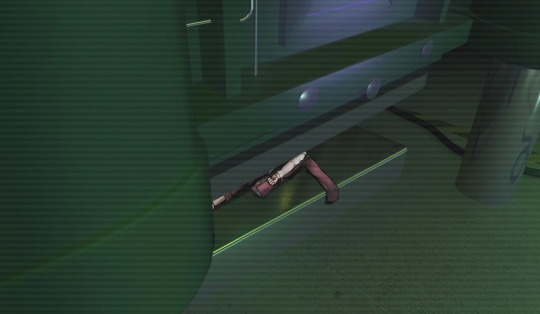
This is how Momota’s arm looked in the original CG from chapter 5, shown when the camcorder is provided as evidence that it’s “Ouma” under the press.
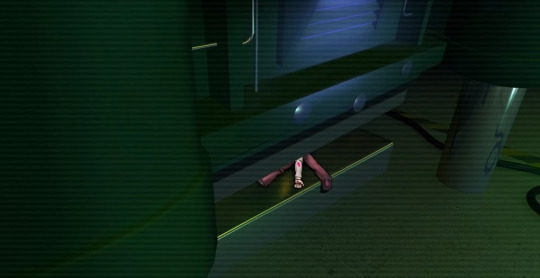
And this is how the localization edited it to look. I can understand and even sympathize with adding the bloodstains, but… changing the entire arm itself? Moving it to be sticking out from under the press? To put it nicely, this change doesn’t make any sense and actually makes it harder to understand Ouma and Momota’s plan.
The whole trick behind their plan was that nothing was supposed to stick out from under the press, other than Momota’s jacket. They waited until the instant when the press completely covered every part of Momota’s body, arms and all, and then performed the switch to mislead people. But the edited version of the CG in the localization just has Momota’s arm sticking completely out, hanging over the side, meaning it would’ve been impossible for the press to hide every part of it and the whole switch feels… well, stupid and impossibly easy to see through in the localized version.
Again, this shows a total disregard for presenting the facts as they actually appear and actually makes things more difficult for English players of the game, because they’re not being given accurate information. I really don’t understand why these changes were necessary, or why the bloodstains couldn’t have just been added without moving Momota’s entire arm.
7.) In Conclusion
This has gotten extremely long (nearly 10 pages), so I want to wrap things up. I want to specify that my intention with this masterlist isn’t to insult or badmouth the translators who worked on this game. I’m sure they worked very hard, and I have no idea what time or budget constraints they were facing as they did so.
Being a translator is not easy, and typically translators are not very well-paid or recognized for their work. I have the utmost respect for other translators, and I know perfectly well just how difficult and taxing it can be.
I am making this list because these are simply changes which were very different from the original version of the game, and which I believe could have been handled better. Personally, I disagree with many of the choices the localization made, but that does not mean that they didn’t do a fantastic job in other places. I absolutely love whichever translator was responsible for coming up with catchphrases and nicknames throughout the game: little localization decisions like “cospox,” “flashback light,” “Insect Meet n’ Greet,” and “cosplaycat criminal” were all strokes of genius that I highly admire.
I only want to stress that the Japanese version of the game is very different. Making changes to the way a character is presented or portrayed means influencing how people are going to react to said character. Skewing the information and facts presented in trials in the game means changing people’s experience of the game, and giving them less facts to go off of. Equating fictional gods to real-life ones can cause real harm and influence perception of real indigenous peoples. These are all facts that need to be accounted for before deciding whether a certain change is necessary or not, in my opinion.
If you’ve read this far, thank you! Again, feel free to share this post around if you’d like, since this is probably the most comprehensively I’ve ever covered this topic.
#danganronpa#new danganronpa v3#dangan ronpa#ndrv3 spoilers //#ask#anonymous#this isn't meta but it's IS a comprehensive masterlist of translation comparisons#so i think it's okay to post in the tag#okay to reblog
717 notes
·
View notes
Note
Slightly random TFATWS question here, but I'd be interested in your take on it. If the point of the supersoldier serum is that it essentially amplifies your existing qualities and makes you More of what you already were - as Erskine says, good becomes better, bad becomes worse - then how would you say it's affected Bucky? His actions as the WS were the result of Hydra's brainwashing, not the serum, and he doesn't seem to be affected by it in the way Walker or even the Flagsmashers are.
It's difficult to say for a variety of contributing factors.
Factor #1: Steve Rogers (and Johann Schmidt)
It's important to remember that both Steve and Red Skull were the only two that got Erskine's serum directly. And, if Schidmt got the same style of treatment as Steve did, then they were both the only two that we saw who got multiple doses of the serum, as seen below...

Steve was also the only one we saw who got the combination serum + Howard Stark's Hottie Machine, so we don't know what effect that tech might have had on administering the serum.
Every other person that we saw (or didnt see) had a single dosage of a modified serum - an attempt at recreating Erskine's original success. Such as, the Flag Smashers...
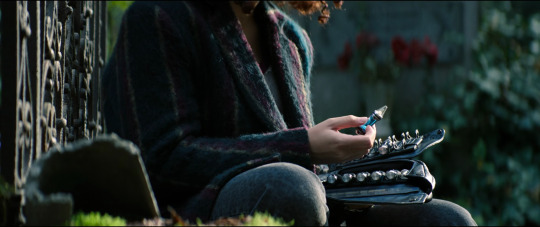
... or John Walker...
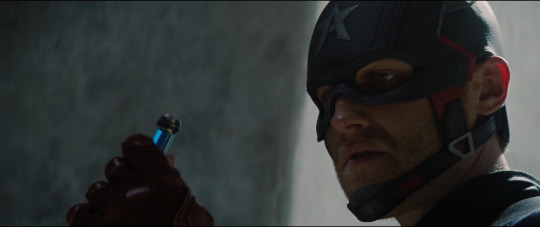
... or even the five other Winter Soldiers.
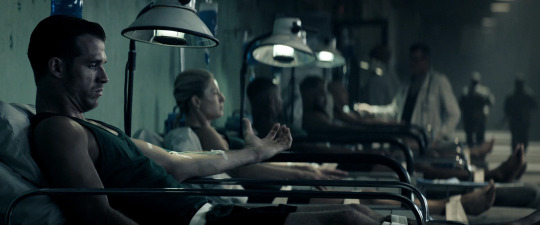
The only exception to this that I can remember was Emil Blonsky from the Incredible Hulk (I know we all try to forget that movie), because he had multiple doses over multiple treatments of whatever version of the serum Ross had cooked up trying to recreat Steve Rogers and Bruce Banner.
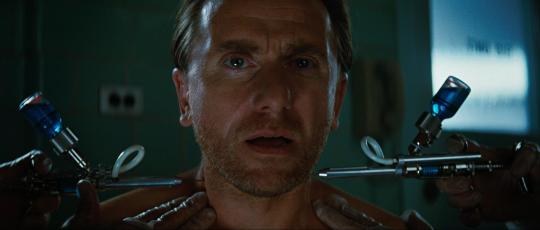
And much like Steve (and presumably Johann) it required extra steps to administer than just a shot or an IV drip, relying on Gamma Radiation to help "complete" the process.
The bottom line here is that, there have been no two versions of the serum that were the same that were administered in the same way. Steve Rogers was a unique occurrence in more than one way.
I also have a theory that the original serum was derived from the heart-shaped herb from Wakanda, given the similarities between the two when it comes to the enhanced physicality.
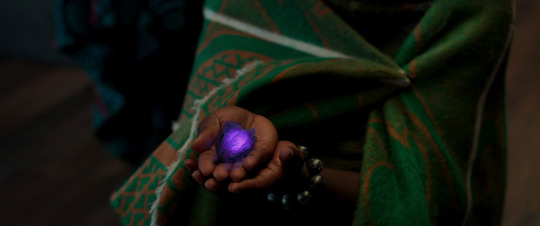
Maybe Erskine and Schmidt got their hands on an herb and refined it until it was just the physical (blue), excluding the more mystical attributes (red), such as the aspect that allowed Wakandan kings to communicate with their ancestors. (I have a theory about the heart-shaped herb, too, but I'll save that for another time)
It's also very important to remember that the only super soldier to experience any kind of major side effects was Schmidt.
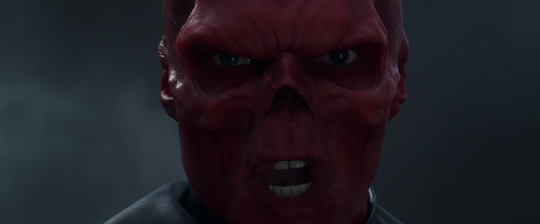
No other super soldier looked like this
Factor #2: Hydra
Aside from the fact that Bucky didn't receive the same super soldier serum as the others, but whatever concoction that Zola managed to cook up in his attempt to recreate the serum (interesting to note that Schmidt seemed to take a more hands off approach to this, choosing instead to focus on the Tesseract and it's capabilities). As such, Bucky, as we saw him in The First Avenger, didn't exhibit any of the enhanced physical capabilities (or even an enhanced physicality) that Steve did after his experiment. In fact, the only evidence we have to confirm that Bucky had received some version of the serum was the fact that he survived the fall from the train, which we didn't get confirmed until The Winter Soldier.
The combination of Hydra having Bucky for over seventy years and him not presenting any attributes of the super soldier serum until after all says to me that he went through more experiments once he was back in their care, possibly some of the precursors to what they did during the Red Room and Black Widow programs.
Factor #3: Psychological
Now this last one is just my hypothesis, which is what you asked for, but I wanted to get the other variables out of the way first.
My personal opinion here is that, despite what Erskine said, I don't believe there is a psychological aspect to the serum. It is purely physical. The psychological component to these experiments - how the recipients handled their newfound power - was down to the individual. Steve Rogers didn't go through any radical ideology or personality shift. He was the same scrappy kid from Brooklyn who stood up to bullies and refused to back down from a fight, except now he had the muscle to back it up.
Same with John Walker, as controversial as that may sound. We had three whole episodes with Walker before he took the serum, and in that time, we already saw he was quick to anger and had aggressive tendencies. All the serum did was give him the power to back it up.
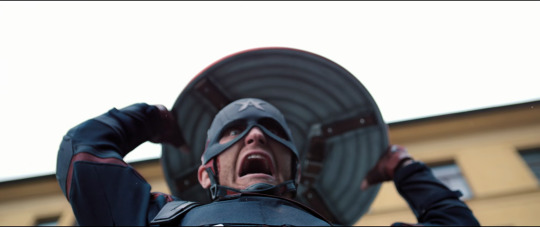
Earlier, he and Lemar were talking about what they could have done with the serum, saving their fellow soldiers, and we saw in the immediate follow up that Walker was trying to rationalize what happened, telling Sam and Bucky that he had to do it, that he killed a terrorist. That kind of mindset isn't something that can come about over night. That was something conditioned into him by the military, something he later shouted at them during his disciplinary hearing, telling them he was what they made him to be.
The Flag Smashers were fighting for what they believed in, for those the world forgot after the Snap (I refuse to call it The Blip, I'm sorry), and suddebly they had the muscle to stand up against those who would push them down.
Karli in particular was a scared kid backed into a corner, lashing out. Was a lot of what she did was wrong? Absolutely, but she wanted to send a message and used the only means that the governments hellbent on suppressing them seemed to understand. And, as we saw after that first bombing, this extremism wasn't shared by all the Flag Smashers.
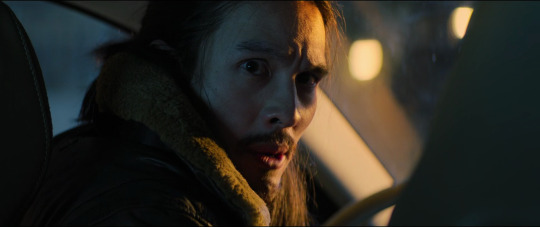
It's like all those shows or movies or books where a mousy wallflower is given superpowers or turned into a vampire or werewolf and suddenly they have the power to push back against their oppressors. A great example of this would be the three werewolves introduced in season two of Teen Wolf, those being Isaac, Erica and Boyd, who all went from being shy loners to being cocky and arrogant because they had the power to stand up for themselves physically now.
You give someone power and you'll see who they really are.
To circle back around to the point I've been trying to make (sorry for the scenic route), it's that Bucky never showed any sign of extremism, whether for good or evil. And that had to do with a combination of who he was as a person - he was more or a follower, latching on to Steve and Sam as his guiding star - and Hydra's machinations and manipulations during his time as the Winter Soldier. By the time he was finally free of them, he just wanted to be by himself and deal (or not deal) with his various traumas.
The Bucky that we met at the beginning of The First Avenger was very quickly buried under war and tragedy. Who he was, because of what he went through, changed. And I think that was the point Erskine was trying to make, though he definitely could have worded it better. The serum makes you more of who you really are, shows your true colors, not because of any chemical response, but because of how power has been prioritized in society. The notion that you don't have to fear physical repercussions anymore, because who's strong enough to stop you?
#ask and ye shall receive#marvel cinematic universe#bucky barnes meta#bucky barnes#steve rogers#johann schmidt#karli morgenthau#john walker#super soldier serum#the falcon and the winter soilder#tfatws spoilers
166 notes
·
View notes
Text
Why Ethical Fashion Doesn’t Need to be Boring (In the Words of a Shopping Addict): Lookbook no.14
Hi to anyone reading,
Arghhhh.
I never know how to start posts when I literally just uploaded the other week because I tend to follow the very formulaic approach of summarising what I’ve missed due to sporadic posting…I mean, don’t get me wrong, I’m still posting sporadically, it just so happens I’ve had more content to get up recently-sometimes lightning strikes twice, ya know, and I have a brief, if chemically fuelled, reprieve from the permanent state of exhaustion. It’s not like there isn’t stuff to talk about- the last month has seen a horrific murder and public outcry in response. There are a lot of important conversations going on about women’s safety and misogynistic violence that I really cannot do justice to in a paragraph and feelings that have been brewing for a long time that I can’t articulate yet and will not attempt to offhandedly do so in this post. Right now I just wanna say that I stand in solidarity with all those with histories of experiencing violence at the hands of men, those who aren’t here with us anymore as a result of that violence such as Sarah Everard, and those marginalised women whose stories don’t make national news. It’s very telling the way Sarah’s vigil was responded to by the same police force that have allowed mostly male anti-mask protests to go ahead with protestors unscathed, and solidarity with the women who were treated with such an unjustifiable amount of force at the vigil too.
That being said, women’s rights are something I wanted to talk about in this post, with regards to the way it ties into ethical fashion. None of us are perfect and it’s easy living in a first world country to detach yourself from the issues stemming from fast fashion, especially when you don’t have the time or money yourself to be selective about where you buy from. Don’t get me wrong, I do treat myself to some new clothes from fast fashion companies like ASOS and Urban Outfitters a few times a year so this is NOT coming from a place of preaching, but I have drastically reduced that to buying about 90% of my new clothes either second hand from Depop or charity shops or clothing stores that are upfront about their outsourcing practices. I love putting outfits together and updating my wardrobe and I don’t want to abandon that as a medium of self-expression because it does bring me joy, but to continue to update my wardrobe with the frequency I do by buying from fast fashion retailers on such a regular basis I accepted was going against the things I care about; around 80% of textile workers on poverty wages in developing countries are girls and women (opensocietyfoundations.org), and whilst fast fashion companies in the West continue to outsource manufacturing to said countries to cut costs and there is little regulation enforcing employers to pay women the same amount as men or even adhere to a minimum wage, they will continue to be forced into these roles where they are subjected to horrific working conditions, impossible production targets and frequent abuse (according to an article published in the Guardian in June 2018, 540 incidences of abuse, often of a sexual nature, were reported by women working in factories supplying the retailers GAP and H&M when they were interviewed on the subject). There is no denying that the fast fashion industry depends on and perpetuates the subjugation of women and systematically prevents them from making steps towards gender equality in their countries, be it through greater financial independence or the freedom to pursue higher education; the popular current practice by western fast fashion companies of outsourcing manufacturing to factories unhindered by workers rights and gender equality laws by association condones the sexual and physical violence that occurs as a means of punishment for not meeting targets, the exploitative pay which affords women little independence from husbands and families dominated by patriarchal values, and the long, exhausting hours which women have little choice but to take in order to avoid their contracts being terminated and to put food on the table. No, one individual completely abandoning fast fashion isn’t going to put an end to these unethical practices but if all of us make a conscious effort to reduce our consumption at least a little and make it clear why we’re doing so, we put greater pressure on fast fashion companies to act in a more responsible way. There isn’t going to be any kind of miraculous change of heart, so to force them to change we have to hit the industry and the people at the top who benefit from such practices where it really hurts: their profit.
SO, for this post I thought I would highlight some of my favourite more ethical online clothing companies to buy from; the more popular these more socially responsible brands become, the more apparent it becomes to fast fashion companies relying on an exploitative business model that how they treat their workers is of growing importance to consumers. It’s all very well and good Missguided and PLT talking about empowering women and making “girl boss” slogan tees but we need to make it clear that we’re aware of the hollowness of the gesture, and that we want less hypocritical talk and more action to actually enhance the lives of the women that work for them, not just the ones they show in their flashy offices on TV. I’ve included my favourite Depop shops too, because if you can shop second hand, that’s even better; though I like to treat myself to new clothes now and again, I’m aware that the impact the manufacturing process in general, whether or not the company acts in an ethical way with regards to their employment practices, has on the environment is more often than not detrimental. Depop has really been my saving grace this past year-if you know what you’re looking for and have the time and patience, you can find so many gems, and at this point the balance of my wardrobe is tipped firmly in the favour of the reuse and recycle approach to shopping. In the vein of reusing fashion, I thought I’d also include a mini lookbook for a cardigan I got from one of my favourite online retailers, The Ragged Priest, just as a reminder that 1). The best way to be sustainable is to rewear and 2). That with tweaks, one piece alone can give you multiple completely different outfits. Like honestly, outfit repeating doesn’t have to be a literal repeat. Sometimes it’s worth spending a little bit extra on something that looks good with everything, and making that investment into your ability to fool people that you’ve got your shit together by wearing something cool as fuck.
Quickly before I get into it, I’m aware that some ethical companies are a bit out of the average consumer’s price range, and so I wanted to sort them into price point categories which will work as follows:
£= most of their stock is £40 & under ££= most of their stock is between £40-£100 £££= most of their stock costs upwards of £100
Now, in no particular order (and starting with online retailers before moving onto Depop shops), here’s the list!
1. THE RAGGED PRIEST
PRICE POINT: ££

Using recycled fabric to construct their pieces where possible and releasing clothing in small drops designed to sell out rather than following the typical fast fashion model of outsourcing the production of vast amounts of clothing overseas, the Ragged Priest is my absolute favourite clothing brand out there. It’s *semi* affordable and because they are all about those bold, in your face, your-grandma-will-probs-think-it’s-ugly kinda pieces, just one can do SO much for your wardrobe.
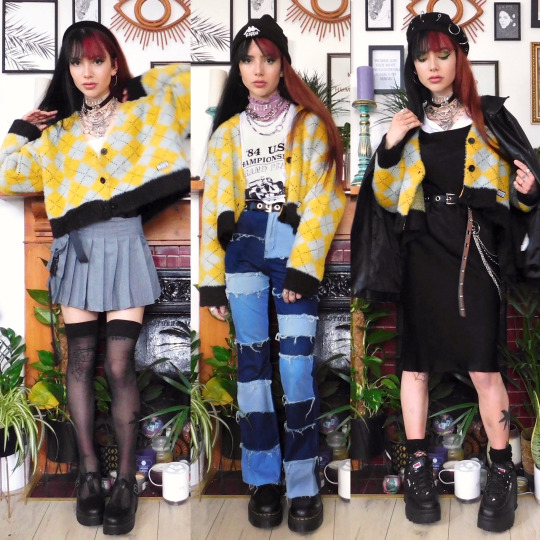
I recently bought this cardigan from their The Simple Life drop and had so many outfit ideas for it that I thought I’d put a few of them together for this post just as an example of how you can take the same piece over and over again and still make it interesting, even when you don’t feel like straying too far from your personal style preferences. While we’re at it, I also wanted to use this mini lookbook to point out how fucking great Depop is! Literally everything in these outfits is from there apart from the shoes and the jewellery, the leather blazer on the right I bought a few years ago and then the top and skirt in the outfit from the far left which are both from Ebay. The shoes with that outfit are from Koi Vegan footwear-I didn’t include them in this list because I wanted to keep it consistent and focus on ethical clothing companies rather than retailers that focus on one specific thing such as shoes or jewellery, but they are my favourite place to buy shoes from and focus closely on ethical production too so definitely recommend.
2. MINGA LONDON
PRICE POINT: ££

Towards the lower end of the ££ price point, Minga is probably the closest you’re gonna get to an ethical version of the Dolls Kill Deliah’s range. Their focus on being a socially responsible business is a huge part of their ethos and their pieces are put together in Portugal, where they're based, by a small in-house team; the majority of their fabric is sourced from local Portuguese businesses and even more amazingly, they recycle the fabric of the pieces they don’t sell in new designs. They are just a generally amazing company and I wish more people knew about them because their pieces are fucking adorable and wouldn’t be out of place (or overpriced) in your local UO.
3. ELSIE & FRED
PRICE POINT: £

A small, black owned business set up by 3 siblings from Coventry, Elsie & Fred have earned themselves a reputation as a staple provider of the festival season wardrobe. Being an independently owned business, they have strict standards that their manufacturers must adhere to and a close working relationship with the owners of the two factories who oversee production in Guangzhou, China, to ensure fair wages and a safe working environment. On the environmental side of things, Elsie and Fred are working to incorporate recycled fabric into their designs as much as possible and have this year introduced compostable mailing bags.
4. HOUSE OF SUNNY
PRICE POINT: £££

Follow enough British instagram fashion influencers and you are bound to have heard of House of Sunny in 2020-snagging what is probably my all time favourite coat from there in 2019 before all the hype is a humble brag I will allow myself on the basis that I haven’t been able to afford anything since, lol. Along with kooky, one of a kind designs, being decidedly anti-fast fashion is a huge part of their branding; HoS only drop 2 collections of limited stock a year, thoroughly screen suppliers and on their website you can find a tonne of information on how they’re working to offset their environmental impact too. If you can treat yourself to a piece from there at any point, the quality of the garments truly make the price point worth it.
5. JADED LONDON
PRICE POINT: ££

Similarly to The Ragged Priest and House of Sunny, Jaded London go the route of dropping limited collections on a less frequent basis intending to sell out (particularly popular pieces are occasionally restocked) rather than needlessly manufacturing vast quantities of garments to flog for whatever they can get and cutting corners with fair employment practices to offset any losses. By employing independent staff in the manufacturing plants with which they liaise to ensure fair, dignified working conditions and also by working closely with charities such as the Trussel Trust and Stand Up to Racism, Jaded London demonstrates a level of commitment to corporate responsibility that set them apart from a lot of similar online retailers. They are at the top of their game when it comes to daring and experimental yet wearable pieces and so it’s cool that they recognise the need to conduct their business in a considerate way too.
6. THE HIPPIE SHAKE
PRICE POINT: ££

Owned by UK based bohemian queen Naomi Hession, the Hippie Shake is not only a great small independent business to support but is also the definition of slow fashion. With a limited number of opulent 70s style pieces, I have always wanted to purchase something from here. I’ve yet to do so but I’m gonna make it my mission eventually.
7. VINTAGE HEARTS
PRICE POINT: £

An affordable, gorgeous array of quirky handpicked vintage pieces that would probably take you forever to find in a charity shop or that you’d be charged a small fortune for if you found it in a high street second hand store, Vintage Hearts is where you should go if you want a timeless statement piece that may have otherwise ended up in a landfill. The added benefit of vintage clothing is that it is, by its nature, great for the environment, but you can also look fab and groovy as fuck as you do your bit for the planet<3
8. WE ARE COW
PRICE POINT: £

Offering both original vintage pieces and reworked pieces using recycled fabrics, We Are Cow has both basic branded second hand items but also handmade streetwear style original designs all for a fair price. You can tell that it’s all high quality stuff consistent with their modern, functional aesthetic and it’s clear that the team behind the shop has a real vision in mind when they’re designing.
9. OUT OF THE ORDINARY CLOTHING
PRICE POINT: £

In the words of Corrie Davis, founder of OOTO "I start with the belief that fashion will be always be worn differently by the individual that wears it. Every collection from Out of the Ordinary is different to the last but undeniably Out of the Ordinary. I champion flamboyancy and embrace the cultures I've experienced around the world, merging the two and creating popular style trends in exciting textiles, prints and techniques to bring to you something a little Out of the Ordinary." That pretty much sums up the vibrancy, vivacity and bold elegance of the brand’s aesthetic perfectly, which is reflected by Davis’ commitment to ethical manufacturing based on relationships forged between the founders and family artisans and the sourcing of fabrics from textile markets around the world. Everything you need for a boujie summer holiday in the Mediterranean-when leaving the country is finally allowed again, lol, EVERYBODY GET YOUR FUCKING VACCINE-is here.
10. WILD THING
PRICE POINT: ranges from £-£££ depending on the brand

Probs the closest thing you’ll get to an ethical ASOS, Wild Thing brings together a host of sustainable and independent clothing brands and puts them all in one place to present to us all a collection of the sickest festival style fashion out there. Whilst it’s super cool that this already exists and a slice of humble pie for myself to remind me that I am not in fact the revolutionary marketing genius I thought I was, I’m bummed to know that my idea of said ethical ASOS style website is already out there. Fingers crossed for the next grand money making scheme that comes to mind that I can use to distribute some wealth (yeah, there probably won’t be any because very few original thoughts enter my head, clearly, tehe) xoxo
11. SHOPFLUFFY
PRICE POINT: ££

I know it’s 2021 and we all kind hate the idea of girl boss feminism and the connotations of privilege and exploitation that come with it but can we bring it back when we’re talking about women who embody what it was actually all supposed to be about? Because the owner of ShopFluffy, @lulutrixabelle embodies everything good about the term. Somebody who genuinely does (cue Ramona singer voice here) empower other women through her celebration of powerful female friendship and free spirited sense of personal style that should inspire every one of us to wear whatever the fuck we want (clashing patterns and over-accessorising be damned), Lulu handmakes all the designs on her site and very much places an emphasis on slow fashion by releasing only a few collections a year which you can clearly tell a lot of painstaking effort and talent went into. ShopFluffy is on the pricier side but the adorable crocheted coords LuLu specialises in, reminiscent of carefree childhood days and picnics in meadows picturesque enough to be the backdrop of a Jacquemus runway presentation, are a bold and beautiful expression of playful femininity worthy of departing with a bit more than you’d usually spend. After all, if you are gonna spend that money on a piece of clothing, supporting an ethical, independent woman owned business clearly built on carefully honed skill, passion and authenticity is the way to go.
12. SHOPEASYTIGER
PRICE POINT: ££

It feels correct to follow up the ShopFluffy mention with ShopEasyTiger given the friendship between the former’s owner with Tigerlilly Winfield (is that not the most wonderfully storybook character sounding name of all time?), owner of Easy Tiger. Up there with my most revered style icons, Tigerlilly’s designs are as flamboyant and glamorous and daring and dramatic as her own personal style, and again, they are ethically made! If you want to get that psychedelic rock n’roll groupie that’s actually way cooler than the band itself kinda energy too, her shop is the place to start.
13. HOTTTRAMP
PRICE POINT: ££

Founded by the incredibly hot Belle_hott_tramp on Instagram, HottTramp is a collection of both handmade pieces and carefully selected vintage finds that blur the lines between 90s Courtney Love style grunge and 70s summer of love hippy that make me want to start my own all girl rock band and hire a camper van to paint black and road trip through the American desert. Given my complete lack of hand eye coordination, I’ll most likely never have the instrumental skills to do that but I never said it was a realistic fantasy, okay?
14. LAZY OAF
PRICE POINT: ££

Is it just me that always thought Lazy Oaf was within the same kind of price range as The Ragged Priest? Because it’s a lottt more expensive than I thought. That being said, if you’re going for a playful, toned down Molly Goddard kinda look, anything bright and youthful, Lazy Oaf’s clothes 100% fit that brief. You are paying more, but part of that markup is reflected in their transparency when it comes to their ethical code, which includes ensuring that statutory minimum wage laws are adhered to in the supply chain as well as that all workers are of the legal working age for their countries and that their working hours do not exceed the legal limit. They are also steadfastly committed to donating a portion of their profits to charities dedicated to improving mental wellbeing such as Mind, Rethink Mental Illness, and Young Minds, something that is hugely important to me given my own experiences and the line of work I want to go into.
15. NEVER FULLY DRESSED
PRICE POINT: ££

Similar in their aesthetic to Out of the Ordinary, Never Fully Dressed is big on colour, print, and elegance. They have both specially selected second hand pieces on offer and original designs too and the about us section of their website clearly states how passionate they are about their ethical manufacturing process, which takes place both here in the UK and in China.
16. TUNNEL VISION
PRICE POINT: ££

Offering the dreamiest, one of a kind vintage 90s pieces, Tunnel Vision could just as easily be a grunge girl band come the craft themed moodboard as it is an online retailer. If the 90s isn’t for you-I mean, I don’t wanna question anybody’s taste levels but…-they also have the option of shopping by era, which I think is a really cool feature I wish a lot of irl vintage shops would incorporate.
17. LOVE TOO TRUE
PRICE POINT: £

Everything on Love Too True is fucking gorgeousss and it is no surprise that they manufacture their garments here in London because I feel their brand totally encompasses that stereotypical 90s East End punk vibe perfectly with a shit tonne of chunky boots and show stopping plaid pieces that makes my heart ache for a riot grrrl renaissance. Yes, when it comes to feminism’s place in mainstream culture, making sure the political goals and structural changes we’re aiming for are visible to all is by far the most important, but let’s have a resurgence of the grunge girl’s armour along with that and PLEASE let’s leave athleisure in the 2010s. No more Kardashian nude leggings, I beg (I AM being lighthearted, wear whatever you want! We’re not policing women’s clothes in this neck of the woods).
18. NINE LIVES BAZAAR
PRICE POINT: £££

Eurgh. Nine Lives Bazaar. I want it ALL. Their clothes give me all the Etro, Zimmerman, Torey Burch, modernised Stevie Nicks vibes on a slightly more realistic budget, though unfortunately for me said budget just isn’t realistic enough. You would think pieces being ethically produced is just a given when it comes to clothes within this price range but that’s not necessarily the case and Nine Lives Bazaar is one of the ones you can trust to actually be considerate of their employees needs when it comes to their approach to business. To anybody who can afford to shop here, I am insanely jealous. The rest of us, for now, can just browse the website n feel the fantasy, channel a Valentina level of delusion and pretend it’s just the import taxes from Australia that’s holding us back from making a purchase.
-DEPOP SHOPS-
1. @HOUSE_OF_EROTIQUE
PRICE POINT: ££
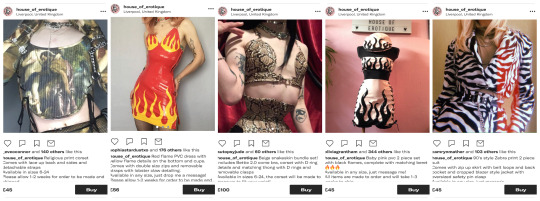
Everything handmade and latex and form fitting to make you the baddest bitch in the room, I’ve got myself a few pieces from this shop over the past couple of years. Customer service is a bit hit or miss and there’s been times when I’ve had to wait a while for my purchases to get to me but because they’re all one of a kind and custom made to fit, it’s worth it, and when they have messed up they were kind enough to add something to my order for free.
2. @SACREDHAWK
PRICE POINT: ££
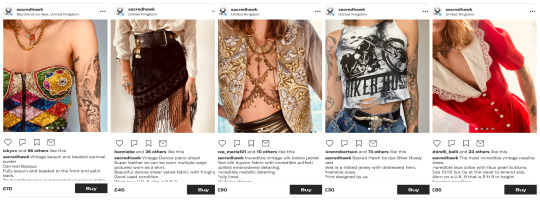
If you picture raiding the wardrobe of a biker gang, snatching the Coachella bound suitcases of the Revolve ambassadors at Palm Springs airport, and then jumbling all those clothes together, that’s probably your best bet at getting an idea of Sacred Hawk’s aesthetic. Formerly an ASOS concession, the brand is now available on Depop and is a collection of the most lavish glam grunge pieces, all vintage or reworked vintage. Some things are a bit on the pricey side but I would say they are all priced fairly considering how unique and ornate a lot of the pieces are, and I reeeeally wanna be able to say I own something from there one day.
3. @IDENTITYPARTY
PRICE POINT: £££
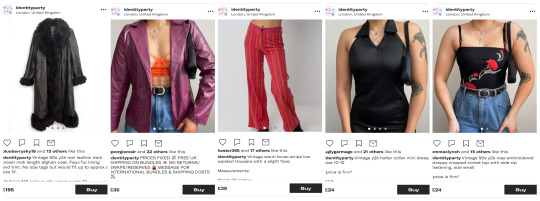
I struggled with how to categorise this Depop shop in terms of price point because although there are some fairly low-priced pieces, the standouts are the vintage coats which are understandably a lot more expensive-if you want to fully immerse yourself in the Almost Famous Penny Lane fantasy, you’re gonna have to fork out a little bit.
4. @RETRO_RAIL
PRICE POINT: £££
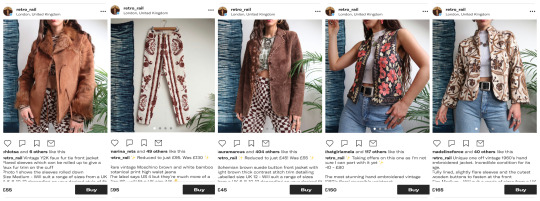
Retro_rail is of a similar vein to IdentityParty, in that the standout pieces are the vintage coats which are usually upwards of £100-if you’re looking for one-of-a-kind statement outerwear to invest in, I can’t recommend this shop enough. If you’re like me and you’re looking for something more within the £ to ££ price range, Retro Rail is still worth a browse as inspiration for the kind of styles you might wanna try and find elsewhere on Depop.
5. @5THSEASON
PRICE POINT: £
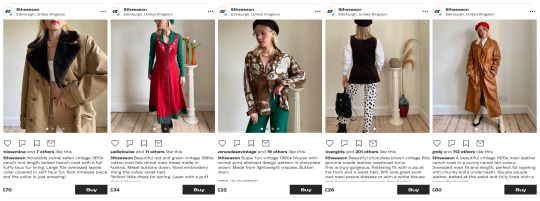
Most of the quirky vintage pieces you’ll find on offer on this Depop shop are within the £25 to £40 price range and though you’ve got coats similar to those you’ll find on Identity Party and Retro Rail and they are sill slightly more than the tops and trousers and dresses on sale etc., they are more modestly priced than the other 2 listed.
6. @DREAMERSREBELS
PRICE POINT: £££
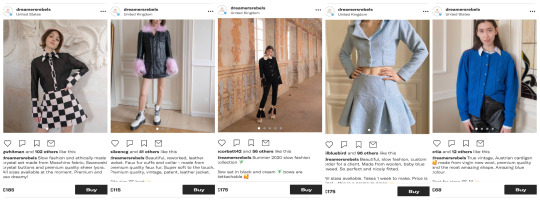
Another v pricey one, dreamersrebels specialises in the daintiest, most whimsical 60s style co-ords I’ve ever seen. Handmade upon purchase, which in turn guarantees little textile waste, you can find the kind of pieces you’d expect to see on a 21st century incarnation of Audrey Hepburn, all the soft pastels and timeless, retro silhouettes you could possibly wish for. I mean, wishing is pretty much all I can do rn but anyone with a near minimum wage retail job knows you need something to aspire to, lol. I managed to budget enough to treat myself to a Selkie dress so I’m manifesting that same level of self-discipline to get me a dreamersrebels piece next.
7. @AWKWARDPHASE
PRICE POINT: £
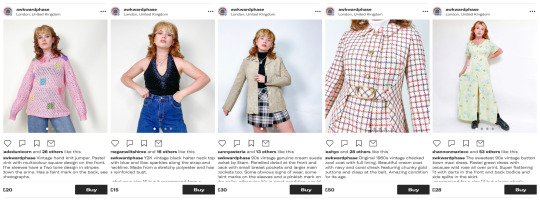
Very affordable vintage pieces that range from cutesy mid-century style dresses and coats to grungy 90s jackets, perfectly styled and presented too in a way that will have you wanting to order something for yourself to replicate that modern spin on old staples and give them a second life.
8. @EVIEHALLOWS
PRICE POINT: £
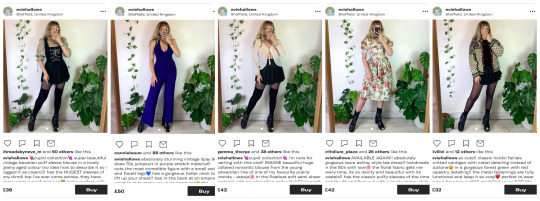
Another Depop shop where the clothes are styled so well, it’ll have you thinking you can make anything from a floral 1950s housewife style cardigan to a lycra jumpsuit look very intentionally on trend.
9. @JAHOOLI
PRICE POINT: £
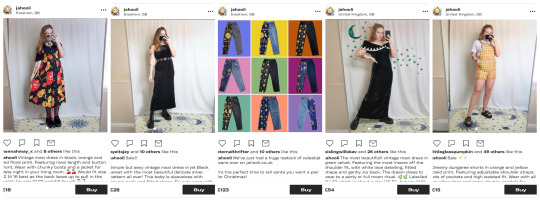
There’s also Jahooli, which I will just say ticks all the same boxes as the other two aforementioned stores to avoid repeating myself.
10. @LOVELYANDLOVELESS
PRICE POINT: £
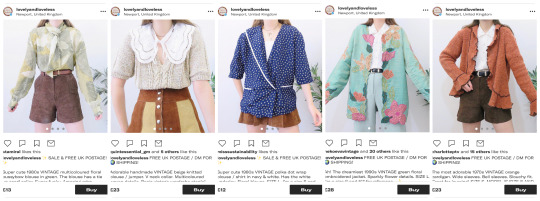
In terms of price, I would put Lovely and Loveless into the same category as Jahooli, Awkward Phase and Evie Hallows, the difference being that the clothes available are more on the dainty, classically feminine side. People who have a Pinterest board dedicated to the cottagecore or light academia aesthetic (whew, the gen Z is showing), this one’s for you.
11. @CHLOESTJOHN
PRICE POINT: £
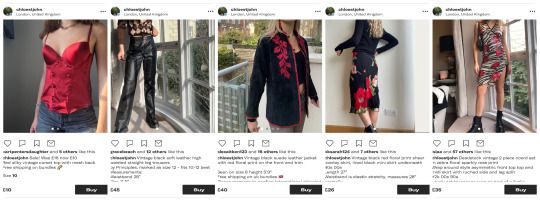
Finally, we have the ChloeStJohn Depop shop and it’s definitely a good one to end on; picture the wardrobe of Carrie Bradshaw if she’d lived in Camden instead of New York in the 90s and hung out with a slightly edgier crew than Charlotte, Miranda and Samantha and there you have it, the vibe of the pieces on offer. Does it belong to a girl who probs lives near Primrose Hill and has access to all the boujiest second hand clothes shops available which she most likely routinely raids to resell on Depop? Potentially, but hopefully not because I am very here for this whole red wine in one hand and a cigarette in another back when people were allowed to smoke inside bars aesthetic. I’m sorry that the gen Z part of me once again jumped out in such an aggressive fashion with that last sentence, but I know you know what I mean.
And that’s everything!
I did wanna close off the post with a reminder of how nuanced a discussion this is-having the time and money to be more conscious about your ethical footprint when you’re buying clothes is in itself a privilege; fashion shouldn’t be an interest reserved for only those who have the means to pay extra or spend time scouring the internet. It’s also important to be aware of the lack of size inclusivity-a lot of the “trendy” sustainable fashion brands tend to not stock anything larger than a size 14 and attempt to deflect attention away from this by categorising clothes as either XS, S, M, or L, which is in itself a bit of a pisstake considering that 12-14 is the average clothing size here for women in the UK, and so in no way large. Shopping from Depop and Ebay is hard too when so many brands fail to understand how to fit a non-straight size body which in turn necessitates trying stuff on before you buy it, something that isn’t possible when you’re shopping second hand. A lot of Depop shops fail to offer returns and even with those who do, chasing up that return can be a time-consuming and generally all round frustrating process.
Basically, when we’re having these kinds of discussions it’s important to consider everyone’s situations and avoid sitting on some kind of high horse. I feel like things have become even more complicated lately- with the recent closure of once popular high street stores such as Topshop and Miss Selfridge, it has got me thinking a lot about just how many people’s income here in the UK is dependent on fast fashion retailers too and their popularity. The job scarcity resulting from these kind of closures, which are often all that is available to a lot of people with the demands of the job market seemingly becoming more and more impossible each day even for those who have been in higher education, is clearly an issue when the kind of support you can expect from the government as someone out of work is so woefully inadequate and likely to become even more so as the conservatives push for further cuts to UC and PIP. The past year has really shown us just how shaky the ground that an intensely capitalist society stands on is and how quickly everything can go tits up when we don’t invest in a safety net for those who are struggling. People seem to have realised more than ever the extent to which those whose jobs we deem “low-skilled” are actually the backbone of society, and yet even here, whilst the situation may not be quite as desperate as it is elsewhere, we still haven’t seen pay rises that reflect that. Turns out all the clapping WAS an empty gesture, who’d have thought it (for fuck’s sake)? Fair wages really are a global issue that starts with paying people enough for them to comfortably live on and in time should lead to a shift in consciousness away from the concept of profit before everything else and towards an equal playing field for everyone, something we should take every opportunity to speak up about and demand from our “leaders”, however shit a job so many of those leaders do. It’s frustrating how the focus on making ethical purchasing choices is so often on the overconsumption of things that women historically are more actively interested in such as clothes and accessories and make up when the reality is that the wealth of every industry titan on this planet, NOT just the ones who dominate the fast fashion sphere, depends on them continuing to get away with exploiting people-we should be looking at how we can show our dissatisfaction in all areas. Maybe I’m perpetuating that with this post, since a lot of the online retailers I mentioned only sell women’s clothing, but that being said, I’m not about to do men’s work for them, lol-they should make the effort, if possible, to research into sustainable clothing alternatives too.
Anyway, that’s the end of this post! If you read to the end, thank you so much! If I’ve made any errors in my research or there are more sustainable clothing brands that I could’ve mentioned, feel free to inbox me them too, and I can add them to this post if Tumblr allows. It’s usually a little bitch when it comes to editing long posts but I’ll try my best:) Again, thanks for reading! And if you are, I hope you are safe and well!
Lauren x
#sustainability#sustainable#sustainable fashion#fashion#fashion inspo#style#style inspo#grunge#grunge aesthetic#the ragged priest#lazy oaf#depop#second hand#lookbook#vintage#thrifting#mingalondon#minga#vintage finds#vintage fashion#jaded london#house of sunny
198 notes
·
View notes
Text
Marcella (Season 2,2018) and Dead to Me (Season 1, 2019): The flipside of two sympathetic, explosively volatile women and what it means for me
Before Season 3 of Dead to Me was released earlier in November, I rewatched seasons 1 and 2 and saw a crucial parallel to another series I’ve rewatched multiple times over: Marcella (only seasons 1 and 2 because season 3 wasn’t real tbh). I’m not reviewing these shows today, especially not Dead to Me because I can imagine that everything good to be said about it is already out there, and Marcella, well, because season 3 kind of made me not want to talk about the show ever again. But there is a small connecting thread between the lead characters Jen (Dead to Me) and Marcella (Marcella) that I’d like to talk a little about, especially because of how it relates to me and my expressions of self.
I believe one of the three people reading this blog has not seen these shows, so for some context, I looked for some description of these two characters where their anger or more socially unacceptable demeanors are described as their key traits:
Dead to Me
So, every aspect of the show is absolutely fucking phenomenal, but the writing and acting in particular are off-the-charts flawless. Christina Applegate and Linda Cardellini play Jen Harding and Judy Hale, an unlikely pair united by a web of tragedy and bad decisions made by good people. Free-spirited Judy befriends cynical Jen at a grief group after Jen’s husband is hit and killed in a hit-and-run accident, and chaos ensues.
[...] I think the thing in Dead to Me I connect to more than anything else though, is Jen Harding’s unfettered rage. [...] She’s just generally over people’s bullshit and expresses it in ways most of us either can’t or won’t. I mean, at one point she literally bludgeons someone to death when he pushes her too far with his woman-hating bullshit. Is there a woman out there who hasn’t entertained this fantasy? Jen’s honest, naked fury is the reason I think so many have fallen in love with the show and with this character in particular.
https://www.scarymommy.com/jen-dead-to-me-unfiltered-rage-queen
Marcella
DS Marcella Backland, played with coiled spring intensity by Anna Friel – isn’t the chirpiest of characters. And nor is she all that fun loving or easy going, either. In fact, it’s a small wonder anyone in her life likes her at all, really.
Actually, come to think of it… No one really does. Her soon-to-be ex-husband Jason has now moved out properly and is due to marry his new girlfriend. Her children seem to tolerate more than love her. And she still runs about her place of work, barking at colleagues, undermining her boss and harassing suspects. Even her on/off boyfriend, colleague Jamie Bamber, seems to have a few issues with her behaviour.
In a way, it’s kind of reassuring to see that Marcella the person is still just as thoroughly brusque, surly and uncivil as ever. Just as reassuring as it is to see that Marcella the TV programme is still just as thoroughly dark, distressing and downright depressing as ever.
https://www.deadgoodbooks.co.uk/seasons/marcella-series-2-review/
So it is precisely in how ‘unlikable’ Jen and Marcella are that they charm and engage, where it is a welcome experience to bask in the fantasy of uncouth (yet highly successful), seething (but understandably so), feminist women. Aside from how they are generally in their day-to-day interactions and in their perspectives on the happenings in their lives, I am speaking specifically about how this ‘anger’ (generalising here because I can’t be bothered to explain all the way this manifests or all the different undercurrents, all the layers of the submerged iceberg beneath this anger, so just imagine a very very very deep and complicated and moving and sad and hurt compounded anger) led these two characters to committing irreversibly tragic actions. Jen, in a fit of misdirected hurt/rage/annoyance kills her best friend’s ex-boyfriend (as bolded in the text above), and Marcella, whose anger mostly seems self-directed, smashes the head of her loving, warm (and handsome hehe) colleague who had moments before just stopped her from attempting suicide, chains him to a toilet stall, cuts all her hair off and slices through the sides of her mouth (think Joker-but cooler idk I’ve never seen Joker or Batman lol), before living under a bridge for weeks in the cold. (See pic below for the shocking, terrifying iconicity of Marcella’s self-harm.) While the manifestations of these unprocessed, unmanaged unhelpful emotions are different, both Jen and Marcella are clearly volatile, “unhinged” women.
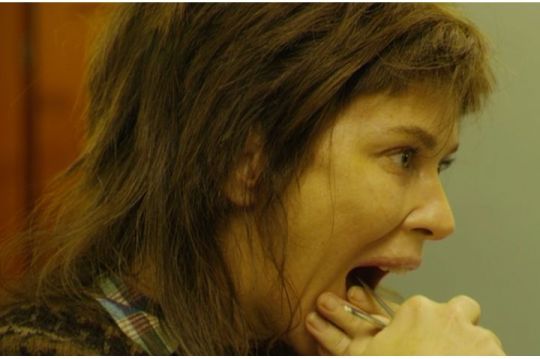
A few nights ago I was in the car giving my colleague a lift home after work, and it’s a long drive so we usually have good time to start and finish serious topics before she gets off, and this is a part of my week-day routines I have come to enjoy very much. So on this particular drive, my colleague gave a recent stressful experience in her life as an example of how anger does not sit well with her, both in her personal and professional selves, and how sadness is something she’d much rather languish in. And I commented that I am very much the opposite, not that I am avoidant of sadness, but rather anger feels comfortable and nature and very much like something core to who I am. I have thrown cups and bottles on the ground and my phone more times than I can remember, I have smushed my pen-tip into my diaries since I was a teenager causing ink to bleed out, and slamming doors is something so easy for me to resort to, any day any time. And I know that certain media makes it seem empowering for women, otherwise discouraged from expressing non-warm/loving emotions, to start showing these types of behaviours as a supposed reclamation of that which we have had to abstain from with much intentional restraint, but we know honestly that there are not healthy or respectful methods of coping / managing.
Back to Jen and Marcella, being me watching these two beautiful, strong, epic, swaggilicious women behave in the ways they do without thinking twice.... of course that’s immediately inspiring and relatable, right? Because it’s something I can already see myself doing, see myself being if given free rein. But my post today, the important point that has been on my mind for months, is why this isn’t okay. Doing the work that I have done (just for 2+ years but hopefully many many many more to come!!) and also just generally maturing as a young adult has shown me that it’s not cool for anyone to cause distress in others through such expressions; it’s not cool to “lost control” (itself a myth mostly), and it’s not cool to ummmm murder haha or to attempt it...
Which is precisely why Jen and Marcella had to go to such extreme lengths. Let’s imagine that these two women continued about with their lives as the cool, iconic, irreverent, highly intelligent, brave legends that they are, and express themselves with the rudeness/disrespect/”craziness” that they do, save for killing someone/attempting to kill others+themselves. If that was it, then it would really have been so, so so easy to continue to pedestalize them as the women most of us other women dream to be. It would be so easy to think hey I could be like that too, and in fact I should because I deserve to! And this is not wrong either. There are a million ways in which women can act that would likely benefit all of society, with such freedom of expression. But the peak of the mountain (murder, to generalize) should never be reached; that is not a height to be scaled and I think that’s why it was so important that it was. Do you know what I mean? What I mean when I say the shocking brutalities* are necessary is that audiences needed to realise that there is always a flipside to being this ‘cool angry bih’. And sometimes that can include awful awful awful tragedies. Me most of all, I needed to realise it too.
* - Dead to Me invested a lot into showing the hurt caused by Jen’s murderous action, where the shock and realisation of how immoral and unacceptable it was doesn’t come all at once, but slowly through the impact shown on many many lives. And ultimately we (and authorities) forgive her for it, but the weight is always known.
I might come back and add on to this in a while, but it’s a Sunday night now and as always I’m anxious about starting the work week because more often than not it includes weights I am not prepared to carry. But I’d like to say most importantly more so than the non-revolutionary singular point I’ve made in the too-many words above, that I love love love love love both of these shows. Finishing season 3 of Dead to Me last week, I cried on the way back home a few days later suddenly thinking about how sad and vast and simple it was.
Love you all!
------------------------
Update:
Omg I just realised something hilarious hahahaha I was scrolling through my few-and-far-between old posts and saw that I had very roughly talked about Dead to Me in May 2021, and omg... I am part of the fucking problem guys!!!

This is so funny omg.... ignore everything I said pls hahahahaha.... Killing an innocent man is not ok wtf!! Maya wake up!!!!
Ok but saying “you can die” when someone asks you what they can do to help is still quite iconic ngl.
5 notes
·
View notes
Text
Trouble in paradise - Part 4
Summary: This part takes place 5 months after the blip. Things get difficult when you and Bucky get a guest.
Warning: non; just fluff
Pairing: Bucky Barnes x angel!reader
Author's note: Took me ages to write that. I’m introducing you to two new characters. ;) Thanks again for everyone who is reading my story. English is still not my first languages
Part 1
Part 2
Part 3

Bucky felt weird, deprived. It has been 5 months since the blip and now everything was different. He wasn’t in Wakanda anymore, reading all those letters you wrote to him.
Steve wasn’t there anymore. He stayed in the past and Bucky knew the reason. Steve loved you so he couldn’t stand to see you happy with Bucky. He fled from the painful reality into a past where you weren’t present.
You and Bucky moved in together one month after the big war. It should have been awkward to move in with someone you barely knew but it wasn’t. Everything with you was easy and harmonic. And Bucky enjoyed the levity.
5 years ago, after the snap, you started to work as a teacher. It didn’t matter that you had no qualifications. The schools were so desperate because of the sudden disappearance of several teachers and you were fantastic. You still work there and to everyone else you and Bucky seemed like a normal couple.
Bucky just finished therapy when he noticed a person with a hoodie who was following him.
He slipped into an empty alley and ambushed for the person to come. Bucky didn’t need to wait long for it.
He attacked the hooded figure pressing it to the wall. A soft squeal left the mouth of the person.
„Who the hell are you and why are you following me?“
„I… I mean no harm.“ The voice of a woman spoke, timidly and softly.
The figure raised both hands to the sides of her hood and pushed it a little bit back, but it was enough for Bucky to be stunned. He could see the (y/h/c) hair shining under the afternoon sun. Her hair reminded Bucky of yours. Glossy, soft and so slick, that the fabric of the hood went slithering down. This girl in front of him looked like you. The same (y/e/c) eyes and the same small nose. Just the lips had another shape-they were slightly thinner. Without doubt, the girl looked like she could have been your sister.
„Who are you?“
„My name is Charlie and I’m here because I really need your help.“
„Why do you think I’ll help you?“
„It’s HYDRA, and angels. They are targeting my family.“
„I don’t believe a single word you say. HYDRA doesn’t exist anymore and why would I even care for your family.“
„Because… I can’t believe I’m telling you this. You are my family. You are my father.“ Bucky let go of the girl like he got burnt.
„I’m not a father. I don’t have a child. You’re completely mad.“
„Yeah, you’re right. You are not a father and you don't have a child yet but one day you will and that kid will be me.“
„So you’re saying you're from the future? You’re out of your mind.“ Bucky started to walk back to the main street, leaving her alone.
„I can prove it.“ Charlie hurried after Bucky.
„When you can’t sleep at night, mum makes you hot chocolate and reads a book to you. And every time I have a nightmare you do the same procedure.“
„That doesn’t prove anything.“
„Two weeks after the blip you bought an engagement ring for mum. You carry it in your pocket and you wait for the perfect day, the perfect moment to ask her. And you told me that one day you woke up and just knew that this particular day would be the one. Here.“ The girl was searching in her bag. She pulled out a picture.
It was an indescribable strange feeling to look at a picture of something that hasn’t happened yet. The picture showed you and Bucky on your wedding day. You both were kissing each other. It was a soft yet freeing kiss. All these years of waiting and longing were put into this kiss. Bucky wasn’t sure if others would interpret the same thing or if this was just his current feelings; still waiting impatiently for the to come. In the background he saw Sam and Pepper and another woman who he hasn’t met yet. The laughed and clapped happily their hands.
Bucky sat down on a bench, that was nearby.
„Am I… am I a good father?“
„Of course you are. You are the best.“ Charlie lay her hand reassuringly on Bucky’s.
„So what’s going on in the future?“
„A lot. It’s pure chaos. The war of the angels isn’t up there anymore. They now live on earth, they are fighting on earth. And they have multiple allies.. HYDRA or SWORD. They are after us. You and mum are desperate and helpless because you both don't know how to protect our family. So mum thought about sending me to Olympia… to Ikaris.“
Bucky snorted. He didn't like the Eternals and especially Ikaris, who was a handsome and powerful man. But it was his arrogance and his closeness to you that made Bucky despise him. Every time Ikaris came to visit you, which happened on a regular basis since the Blip, Bucky felt minor in his presence. Like a loser. Even Sam and Steve didn’t like Ikaris. They met him when he came to warn you about Thanos upcoming arrival. „He’s the Prime Eternal“, you always said to Bucky. „Of course he’s a bit arrogant but he’s also sincere, loyal and fair. I’ve known him for so many years, I’ve stood side by side in his war against Apocalypse. I trust him, and you can trust him too.“
„Wow, even in the past you can’t stand him. Anyway, we didn't make it to Olympia. They knew we were coming, Michael and Rafael were already waiting for us. So you and Mum had no choice but to fight. You gave Capt… I mean Sam the stone and just said 2023 and that I should look for a prophecy? And then Sam and I tried to flee but they were everywhere, so he gave me the stone and suddenly I’m here.“
„What stone?“
„This one.“, Charlie showed Bucky a small green stone.
„That’s an infinity stone! Where did you get this?“
„Don’t ask me! You gave the stone to Sam. I don’t know where you got this. But mum can’t know about this. She thinks, angels shouldn’t time travel, because we could misuse this power. “
„Put that away. If someone sees you with this you’ll be in danger.“
Bucky met Charlie every week this week which didn't get unnoticed by a certain person.
On the first day, it was a coincidence that you were there as well. You just picked Morgan up from Kindergarten. Morgan Stark was the daughter of Tony and Pepper and even thought you never were really close to them, one day changed this. You visited Tony and Pepper and suddenly Pepper went into labour. Complications came up and Pepper had to fight for her and for her baby’s life. But it had been your angel powers that saved both of them. Tony never forgot this and he made you the godmother of Morgan. You hated this name. According to you, no angel should be called a godmother or a godfather.
The first time you saw Bucky and her you didn't really think about it. But you were confused that Bucky didn't mention the woman he met this day and you couldn’t help but to be suspicious.
The next following 3 days you saw Bucky and this woman sitting too closely for your liking on a small bench and talking vividly with each other.
„Is that Bucky?“, Morgan looked at you as she pointed with her small pointing finger in the direction where Bucky was sitting.
„I think you’ll be the next Sherlock Holmes. C’mon, lets say hi to Bucky and his friend“
You were nervous and an uneasy feeling spread in your body.
„Hey, Buck.“, You grinned at him, recognizing how surprised he looked.
„What are you doing here?“
„Picked Morgan up.“ A strange silence grew between the two of you. That's why how you started to observe the woman, that was sitting on the bench. She was truthfully gorgeous. A fact that you didn't appreciated at all.
„Hi, I’m (y/f/n).“ You extended your right hand.
„Hi, I’m uh.. Charlie…“
Her hand was shaking and sweaty like she was nervous and when you touched her hand you felt her powers, her angel and you didn't like it at all. You pressed your lips together and faked a sweet smile. „Nice to meet you.“
You looked away from Charlie and into Bucky’s deep ocean blue eyes.
„So, how do you met each other?“
„Well… we… met… in therapy.“ Bucky stuttered.
You nodded slowly your head. „Are you sure or do you need another minute to come up with a better lie.“, you whispered.
Bucky ignored this and pulled you slightly away from the bench.
„I want to ask you something.“
„Okay?“, Morgan was still sleeping in your arms and you were afraid, that she would wake up from your fast heartbeat.
„I wanted to ask if you’d be okay with Charlie staying with us for some days. She doesn’t have a home and…“ Bucky was scratching his head as he looked unsure.
„Absolutely not.“
„Why not?“
"What did she tell you? What did she tell you to gain your trust, because whatever it was, it was a lie.“ A pause
„Did she tell you that she’s an angel? But she isn’t a normal one, she wasn’t created by Him. She was born, but she isn’t a Nephilim either.“
Bucky looked confused, not knowing what a nephilim is.
„A nephilim is the offspring of an angel and a human. They are half human, half angel and they are really annoying. But she is a real born angel which leads me to the conclusion that one of her parents must have been a really powerful angel… like an archangel. Bucky, I know every archangel and none of them has a child. She can’t be trusted and there is no angel who doesn’t want to see us dead… with all the chaos we provoked.“
You starred into Bucky’s face. No sign of surprise could be seen.
„She told you. You aren’t even surprised. Since when do you trust angels?“ Shocked about his sudden trust, you opened your mouth slightly.
„Well, I trust you, don’t I.“
Bucky regretted this sentence immediately as he saw your hurt in your big (y/e/c) eyes.
„I didn't mean it like that. I just… this girl has no one, no family, no friends. And I feel bad for her. You of all people know how difficult those times are.“
As a teacher you saw how desperate parents and kids could be. You knew that for several families the blip didn't make it any better, if anything it just made it worse.
„Don’t compare her life to those who really suffered, Bucky. She is not innocent. Angels are never innocent… I… Who is this girl? Who are her parents? Did she tell you anything about them?“
„She is scared and helpless. She’s still traumatized and doesn’t talk much“
You snorted.
„We can get her a hotel room for some time but I won’t let her into our home. That’s my final answer.“
You kissed Bucky on his cheek and walked with Morgan on your arms home.
„She will kill you.“ Charlie told Bucky as they both walked upstairs to Bucky’s and yours apartment door. „Probably.“
Charlie lay her hand on Bucky’s underarm which caused him to look into her face.
„Please, don’t get killed. Without you, there is no me.“ Even though she just said it jokingly, a warm and pleasant feeling went through Bucky’s body.
He opened the door and heard you preparing dinner.
„Hey Buck, I hope you aren’t upset…“, You stopped your sentence when you saw who Bucky brought with him.
„Oh for god’s sake. You’ve got to be kidding me.“
„I know you’re angry with me but I couldn’t just let her stay there in the park.“ Bucky tried to calm you down.
„Please, Bucky. Don’t let her into our home. She has more secrets than the Vatican“ You begged him.
„It’s just for a couple of days, yeah?“
You shrugged
„Well, you already made this decision on your own and I have no choice but to accept it.“ Bucky leaned down to kiss you but you turned your head away.
„You’re probably hungry. Sit down, please.“ You offered the girl a seat. Charlie was starving and it had been weeks since she ate a proper meal.
„What about you?“ Bucky asked worriedly.
„I lost my appetite but don’t worry, I won’t die out of starvation.“
You opened the door to a small room. The walls were painted in light blue and small and bigger yellow handprints of you and Morgan could be seen.
„Is it already morning?“ She asked sleepily, rubbing her eyes with her tiny hands.
„No, you just get an upgrade. Go back to sleep.“ You whispered softly as you carried her to your room and left some minutes later with a pillow and a blanket which you put onto the couch.
„Charlie, you can sleep in that room and you“ You turned your head towards Bucky.
„You can sleep there.“ With your head you're nodding to the red, comfortable couch.
„You’re kicking me out of our bed?“ Hurt and disappointment could be heard in Bucky’s voice.
"Did you really think that after everything you’ve done today I want to sleep next you?
Good night.“
Two weeks had passed and Bucky was on edge to the therapist’s sorrow. Charlie was still living with you.
„Trouble in paradise?“ Ikaris saw the blankets on the couch as he entered your apartment. Since the blip the Eternals were at war with the Deviants again. Ikaris used his getaways to meet you, asking for your support in his war.
„Don’t get me started. This woman just infuriates me.“
„Tell me about it.“ Ikaris sat down, watching how you prepare dinner.
„Well… 2 weeks ago Bucky brought this girl home because she’s helpless and innocent.“ The last part of your sentence is full with cutting irony.
„But you don’t believe it?“ Ikaris dug deeper.
„How can I. This girl is an angel.“ You put a glass of water in front of him.
Ikaris eyes widen due to your confession.
„And not just a normal angel… she has a soul... I felt it when I touched her hands.“
Ikaris swallowed the water and snorted.
„How is that even possible?“ He asked when he gained back his control of his breathing.
„I have no idea and I don’t think that this never existed before. That makes her kinda dangerous. And to be honest, I don’t like how close she and Bucky are.“
„So, you see her as a threat of your security or your relationship with James?“
„I don't know. Even though she is powerful she can’t kill me with her powers, but she has Bucky wrapped around her finger with her annoying angel charm. And that will eventually kill me.“
„Maybe she has the same friendship like you had with Steve. You told me, that in the beginning none of the avengers trusted you, except Steve.“
„That was different. I was always honest.“ You said defending yourself.
„But they didn't know that. You are extremely strong, immortal and gorgeous. You had Steve wrapped around finger.“
You crossed your arms, not liking Ikaris’ reasons.
„Here they come“, You mumbled as you heard the apartment door to open.
„Hey, James!“ Ikaris greeted cheekily Bucky
„Ikaris.“ Bucky nodded
„So, where is the wolf in sheep's clothing?“
„Ikaris, I swear I’ll k…“ You were masaging your temples.
Ikaris swallowed again
„Damn woman, you didn't mention that she looks exactly like you. Are you both related?“
„As if, I’m definitely not related to this.“ Your voice was cold, which earned you an annoyed glance from Bucky
„So tell me, where are you from?“ Ikaris looked interested and attentive.
„I don’t know, I can’t remember.“ Charlie's cheeks blushed as she shrugged.
You snorted
„See, I told you. The worst liar on earth.“
„I thought out of all angels you would understand me not remembering my past.“ It was the first time that Charlie really spoke with you and it surprised you as much as it angers you.
„Are you trying to compare your stupidity with me getting my memories burnt out in the most agonizing pain? You do remember, you're just not telling us. That’s a damn difference.“
Tears welled up in Charlie's eyes as she ran into her room.
Bucky looked at you reproachfully and went after Charlie.
„I’ll better go.“ Ikaris stood up.
„What? No, please don't leave me here. At the moment, you are the only sane person here.“
„If I want to eat with this much tension I’ll just eat with my ex-girlfriends.“ He chuckled.
„Talk with him. You both love each other, you will find a solution. And maybe trusting her… just a tiny bit would make her more talkative.“ Ikaris kissed you on the top of your head and left.
Bucky leaned against the kitchen counter, staring at you.
„Why are you so mean to her?“
„No. The question should be: Why are you so nice to her?“
Bucky walked slowly into your direction
„You want to know the truth? She reminds me of you. She’s smart and strong but also extremely vulnerable. And because of that I feel the need to help her, to protect her.“ His voice was deeper than usual.
Moments later Bucky stood before you and put both his big rough hands on the wall on each side of your head. He cornered you against the wall.
„I’ve been deprived of you. Of your kisses, of your touches“ Bucky murmured in your ear, his lips slightly touching earlobe. He could smell your sweet, fruity fragrance that made him dizzy.
„Promise me, that no matter how angry you’re with me, never stop kissing me. I need those. They're keeping sane.“
„I promise“
After hearing this, Bucky pressed his cold lips onto your soft and warm ones. His urgent tongue was invading your mouth, as he was pressing himself closer to you. Your hands were in his brown short hair trying to pull his head even closer to you.
Bucky groaned.
You both tried to catch your breath when you both heard a woman’s voice straight out of the tv.
„Did you know Steve Rogers?“
„… I followed his career very closely as an Avenger. I like to think that I modeled my work after his. I liked that what I was doing would make people feel safe. Steve Rogers was the kind of guy who could do that, he gave me hope. Even though I never met him, he feels like a brother.“
Bucky clenched his jaw, not believing what he sees. You covered your mouth with your hands, shocked to see a new Captain America.
@jessyballet @geek-and-proud @xlostinobsessionsx @cataves @intothesoul @beminetokeep @ebxny27 @ceo-of-daichi @bluemoon-icecream-blog @peterbparkersbae @bbl32 @stormi-ames @intothesoul @avoxzy @ferxaniti @daughterofthemoon92 @bebudaful @kaitieskidmore1 @harrystylesandthegoobs
#bucky barnes fanfiction#bucky barnes feels#bucky barnes fluff#bucky barnes imagine#bucky barnes x reader#bucky barns x reader#sebastian stan x reader#marvel
86 notes
·
View notes
Text
Neurodivergency, and Sephiroth
Right, I’m going to see if I can try and explain why this reading appeals to me.
For some background, I’ve watched a full silent LP of the OG, watched Advent Children, and am largely familiar with his characterisation in Crisis Core(though it gets a bit patchy in some areas). I am not familiar with his characterisation in KH, Dissida, or any other spinoff appearances.
I’m going to be looking at this with an autistic lens, as, hey, I’m autistic, however much of these patterns aren’t exclusive to autistic people by any means and thus are fairly applicable to other labels.
This is an explanaition on why I find this element worth considering, and while I hope that others can relate or take away something from this, in many ways it is highly personal and not intended to be a decleration on Sephiroth’s ‘true nature,’ as it were. I’m not claiming that this was intended by the writers-- Infact, I’d be very surprised if they considered it, at all --As many of the traits he exhibits could be brushed aside as due to his upbringing.
That being said, let’s get into it!
1. Alienation
A common thread in neurodivergency, autism in particular, is some form of alienation. This doesn’t necessarily mean being outcast-- I, for one, have been largely accepted by those around me, and yet there is still that sense of being ‘other‘ that’s always been there, long before I even had a word for it.
Now, of course, in Sephiroth this is more related to his lineage, and how it’s expressed in... well, everything. Even still, I find value in expanding that, and considering just how getting the sense you’re implicitly divided from your peers.
There is, of course, the matter of Sephiroth’s literal isolation-- However, as fun as those scenarios are to play around with, I don’t think Sephiroth was raised wholly, or even mostly in the labs. The reason being that it would be nigh impossible to have hid just what made Sephiroth different, especially knowing how observant he is. It’s clear that Sephiroth had had extensive contact with other children, as epitomised by the line:
“I knew ever since I was a child, I was not like the others. I knew mine was a special existence. But this is not what I meant!”
Sephiroth was painfully aware that he is different, even if he didn’t know exactly how. It is at once an oddly thrilling, and lonely sensation. Thrilling, because-- Hey! --You can do and see things others can’t and/or wouldn’t; and lonely, because it makes it hard to relate to others or have them relate to you.
2. Socialisation
I would like to start off by saying that, while I find it a tad more faithful and endlessly less grating than Sex God Sephiroth, Sephiroth is not a complete and utter social failure. While it’s clear he has difficulty articulating emotions and understanding others, it’s very clear even still that he knows how the game works, and knows how to play it.
This is going to dip far more into speculation territory, so buckle up.
A thing that, perhaps, I don’t see talked about often enough online when it comes to neurodivergent experiences, is that many things that are considered ‘normal‘ get experienced as systems that we need to actively learn and maneuver-- Socialisation especially!
Now, of course there is always some degree of social interaction being a give and take, a step forth and step back, regardless of neurotype, but it’s dialed up far more when you deviate from ‘the norm.‘
If I can give my own example, a thing I struggled with when I was little was humour! Not because I didn’t find things funny, or didn’t know what it was, but because I had issues grasping at the machinations of what made something funny. This lead to alot of nonsensical jokes that left my siblings confounded, until I picked up a joke-book, and started analysing from there. It was mostly alot of puns, which! Due to their simple structure, are a great way to learn the basics! I didn’t even know this was unusual, until my mother pointed it out to me years later.
And that method goes for alot of things.
Sephiroth, above all else, is observant. He makes efforts multiple times throughout the OG and Crisis Core to check up on others and ask how they’re doing. He asks Cloud how he feels returning to his hometown, and about seeing his mother, and urges Zack to check up on Aerith in Crisis Core, to name some notable examples. Even if you get the sense that his attempts are, perhaps, a little ungainly, it makes it clear more than anything that Sephiroth tries.
I think the reason that people have leaned alot more into the overly-awkward perception of Sephiroth in recent times, is because it humanises him. I feel there’s been far more of a shift within fandom to focus on the mundane, on relatability, on humanity. A veneer of endless, effortless confidence really isn’t that sexy anymore-- When sexual-appeal even comes into the matter, at all.
That being said, this section more than anything, I think, is very easy to brush aside due to his... interesting upbringing. Depending on how you construe the timeline, Sephiroth got sent to war as early as twelve, and wouldn’t have had much of an oppurtnity to develop these skills in a healthy and timely manner.
Even without that, a degree of social awkwardness is far from exclusive to any particular neurotype-- It’s the way it arises in him, though, that piques my interest.
3. Analysis and Obsession
This... I think, is the one where I’ll be grasping at straws the most.
While, yes, the obsessive research demonstrated in the OG during the Nibelheim incident and even before that to a lesser extent in Crisis Core could be some indication of a degree to absolutely immerse yourself in a subject in that Very Autistic WayTM, more than anything these are brought on by dire circumstance(the former especially by the question of his very humanity), and as we don’t see Sephiroth as a child, it’s uncertain as to whether he displayed these behaviours as such and to this degree under ‘normal‘ circumstances.
Even so, I get the feeling that Sephiroth is very analytically-minded, in a very Stranger In A Strange World sort of way(not in any way referring to the 1961 novel by a similar name, lmao). I get the feeling he’s the type of person to pick up some highly-esoteric text just for fun and come away with a menagerie of strange and unusual and obscenely specific factoids that he’ll remember for the rest of his life.
Like, someone might mention a topic offhandedly, and though he’d keep his mouth shut because He’s Like ThatTM, a slew of all the little bits and pieces he’s seen or read on the matter over the years would just jump to mind.
What I’m trying to say is, I think Sephiroth would take joy in painstakingly pouring and mulling over topics that not many people would have the consideration nor the mind to hold any long-term, inimate interest in.
If the last point was easily brushed aside, then this one you’d merely have to breathe and it’d fall apart. Nonetheless, I feel that within fandom’s current common framework with how we perceive Sephiroth, this wouldn’t be too much of a stretch.
I, however, want to make it clear that I can see the issue with labelling Sephiroth as neurodivergent. He could all too easily fall into the cliché of cold, emotionally and socially-inept, often rather callous depictions we see all too often in the heavily-neurotypical media that sees us as Missing Something; less than. Things have gotten better, but even still, there’s such a tendency to flatten us down to the things we can’t do, or lawd as us Potential Einsteins in spite of it-- Which, just, while it happens, on the whole it isn’t very helpful or realistic to expect this from us.
We are by no means a monolith, and while I take comfort in the idea of a neurodivergent Sephiroth, I understand that for some, it can feel like taking on a label to a character that vaguely fits the stereotype, and thus, perhaps, insinuating that to be autistic you have to look Like That-- And when it comes to villains in particular, it’s all too easy to dip into demonisation.
This isn’t even getting onto some of the issues that’d have this fall apart, were we to look at other symptoms. The first that comes to mind, and one that even I, as innocuous as I am, experience: sensory overload.
While it is entirely possible that Sephiroth learned to deal with it accordingly in life, or was forced to surpress it, because Shinra’s Science Department(cough cough Hojo) has been shown time and time again to force its subjects into little boxes and blame them for any failures expressed, the fact is that such a symptom could make fighting on the battlefield downright impossible.
Again, this is something that could’ve been given a ‘solution‘(as much as you can or even should think about long-term surpressing your basic thresholds), it nonetheless remains an issue.
I just hope that, on the whole, this served as some food for thought.
TL;DR: Sephiroth is autistic because I Vibe With It.
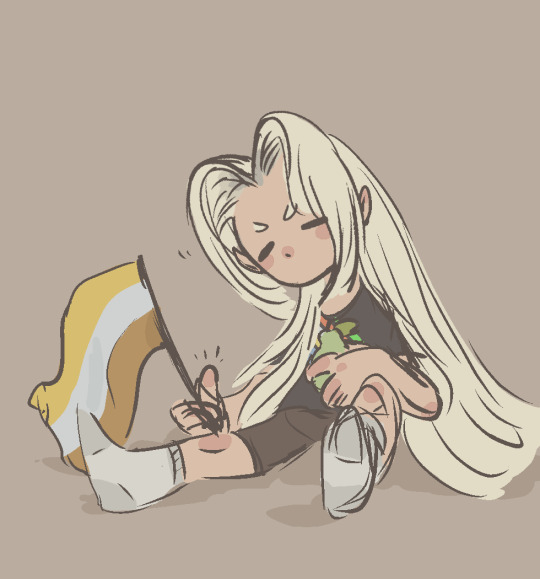
Also, happy Disability Pride!
62 notes
·
View notes
Text
Restless Rewatch: The Untamed Episode 14 first part
(RR The Untamed Masterpost) (Canary’s Pinboard - more Masterposts)
Warning: Spoilers for All 50 Episodes!
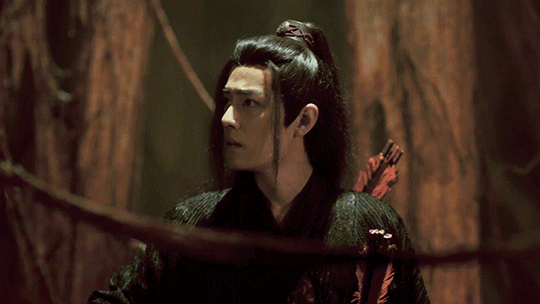
Murder Turtle, Continued
Lan Wangji wakes up after a good night's sleep leaning against a rock wall, to find that his leg is no longer splinted, and his perfectly clean and unbloody headband has been put back on his head while he was sleeping.
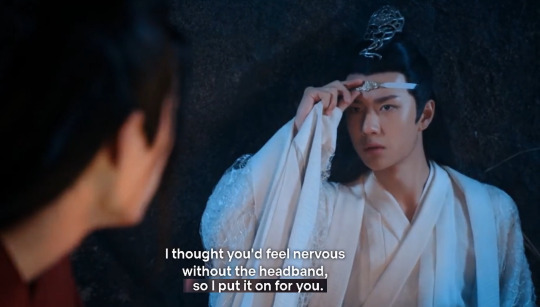
Leaving aside the "not waking up" part of things, how, exactly, did Wei Wuxian get his headband on without mussing his hair? Did he bring a crochet hook?
Wei Wuxian gives him a sitrep and then they cozy up and have an extended conversation about the nature and history of the Tortoise of Slaughter. Wei Wuxian is interested in everything Lan Wangji has to say, and Lan Wangji talks a lot more than usual; they are completely on the same wavelength here and are enjoying swapping obscure knowledge.
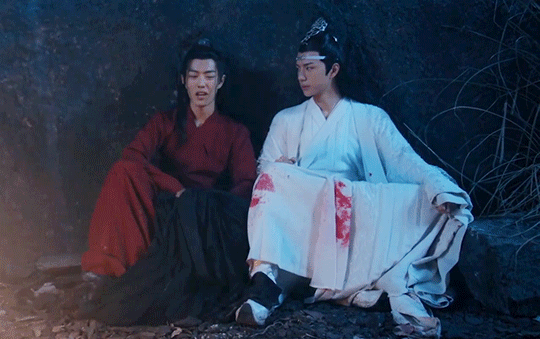
Lan Wangji: My lacerated leg and I are actually super aware that it has big teeth, but thanks for the reminder.
In the course of the conversation, Wei Wuxian mentions his plan to 1. sneak into the tortoise's shell and 2. drive it out of its shell so they can attack it.
OP did a little tortoise research and learned that the only species of turtle that can leave its shell is the Koopa Troopa.
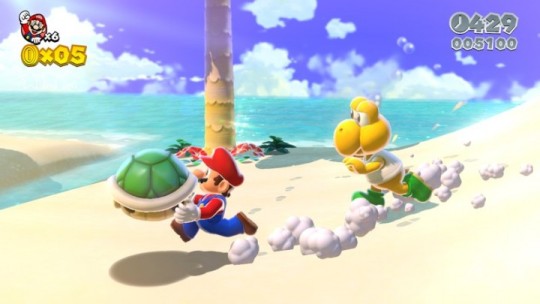
Good news for Wei Wuxian: If you jump on its shell in the right spot, you can rack up a pile of extra lives.
Does that make the Tortoise of Slaughter a giant Koopa Troopa? Perhaps...the king of the Koopa Troopas?
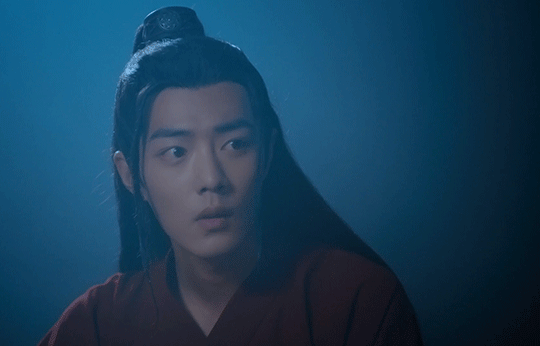
I'm gonna say yes.
(More after the cut)
Let’s Go Killing
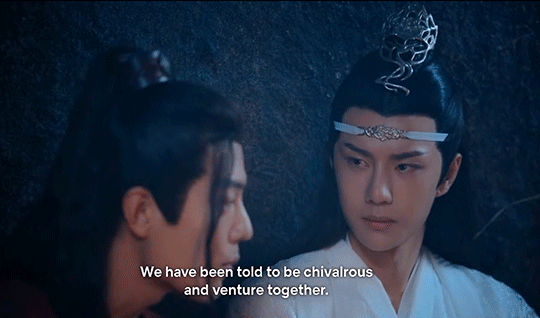
Wei Wuxian is exhilarated by the idea of fighting a giant dangerous monster with Lan Wangji. Some day Wei Wuxian will found the Nike clan, because his motto is definitely "Just do it."
It's sweet how, in his romantic notions about chivalry and Lan Wangji, he's completely elided the original reason they were (sort of) told to venture together.
Wei Wuxian: I'm still on the "find the Yin Iron" quest; I'm just skipping the "suppress it" part.
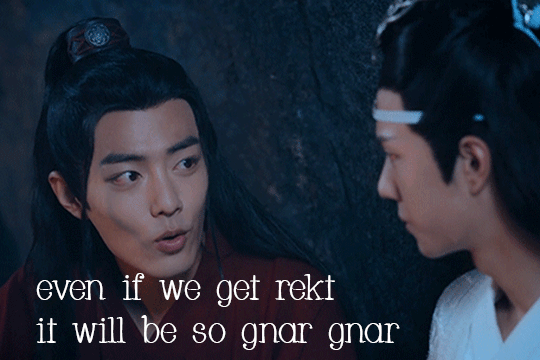
Wei Wuxian weighs up their chances against Bowser and tells Lan Wangji that even if they die, it will be badass to be killed by a famous monster, so they won't have to feel embarrassed.
This is the exact moment that Lan Wangji's feelings for Wei Wuxian go from "smitten" to "gagging for it."
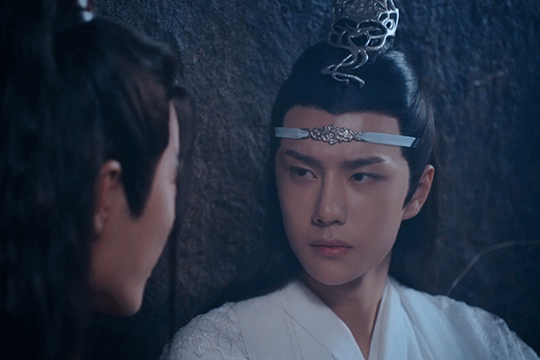
Lan Wangji: as soon as we get out of here I'm going to borrow a whole lot of books from Nie Huaisang
The boys come up with a plan that involves a rather long montage of collecting archery equipment and deconstructing it. This potentially-dull montage is fun to watch because they are both very, very good looking.
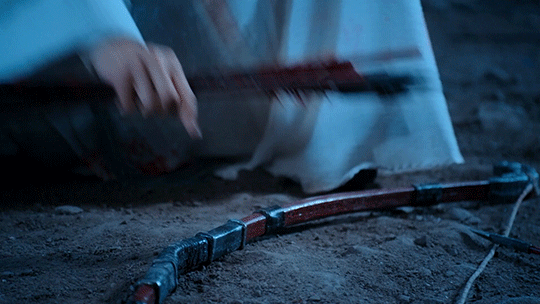
Artists who want to draw Wang Yibo as an elven archer, this is your episode.
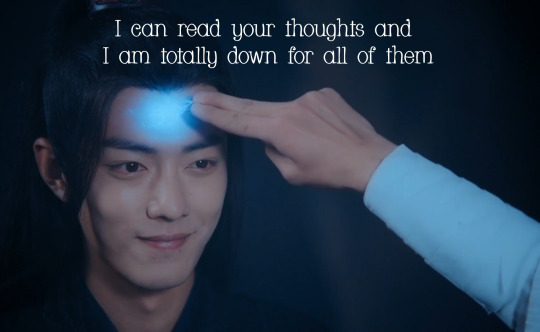
Now we suddenly have, with zero explanation, telepathy. Ok, sure. It seems to work kind of like a phone conversation, in which they say specific things to each other, rather than like Cherry Magic telepathy where you can hear everything the other person is thinking. Or at least, neither of them is embarrassed, so I assume they are maintaining some mental privacy.
Club Ruohan
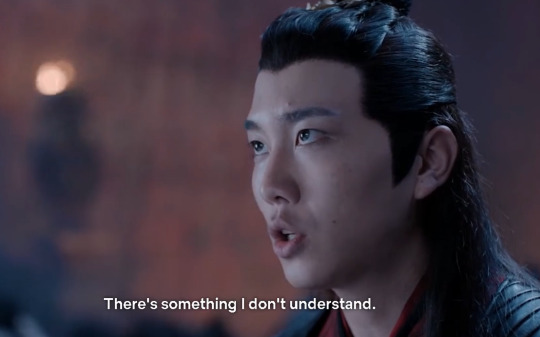
Same, Wen Chao, same
At some point there is a boring sequence at Club Ruohan. Wen Ruohan doesn't know where Xue Yang is, but really wants his hunk of Yin Iron. Wen Chao thinks that WRH's 3 pieces of Yin Iron should be able to beat Xue Yang's 1 piece, but apparently he is dumb and that is not how math works. O...kay? OP does not understand this either but whatever, Wen Ruohan is boring, moving on. This scene is really just here to make us think about Yin Iron before Wei Wuxian jumps into Bowser's shell.
Bigger On The Inside
So then Wei Wuxian climbs into Bowser's shell, which is, to quote The 12th Doctor, bigger on the inside.
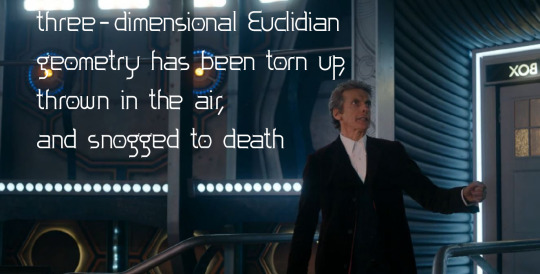
Bowser’s shell is the approximate size of my entire house. It is also bathed in a hellish pure red photo filter, which OP has done her best to remove for these gifs, because it gives me eye strain and it obscures Xiao Zhan's hotness.
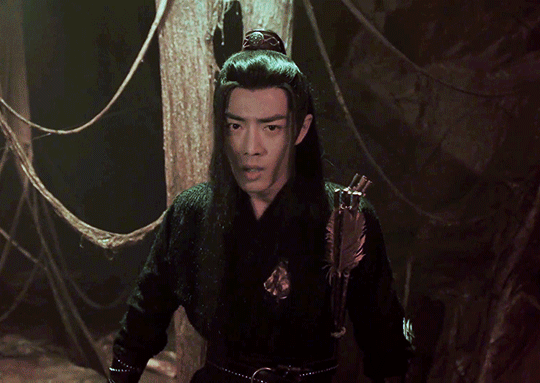
Camera Operator: What did I do?
Wei Wuxian wanders around inside, finding random corpses encased in slime cocoons. Tortoise, spider, xenomorph, whatever. There are also random curtain things hanging all over, and then at one point Wei Wuxian stares into the face of a corpse, and then does a jump scare response at the camera operator even though nothing particular happened.
I imagine the corpse was supposed to open its eyes and say "killl meeee" but it got censored. He also makes about 8 other faces at the camera operator, so we get that the inside of this TARDIS-like tortoise shell (must...resist...temptation...to...say...TORDIS) is yucky.
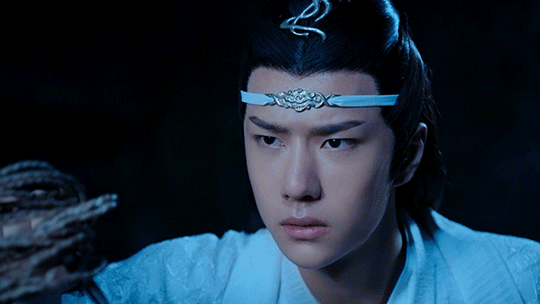
Lan Wangji waits outside listening to Wei Wuxian telepathically complain about the smell. He is anxiously clenching a bundle of string and an arrow, and wishing he could clench Wei Wuxian Bichen instead.
Serendipitous Yin Iron
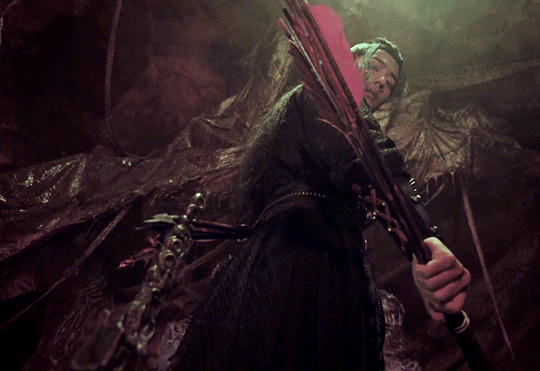
Wei Wuxian backs his way through the TORDIS until his butt bumps into a sword that is steaming with resentful energy. That's right: Wei Wuxian is about to pull a piece of Yin Iron almost literally out of his ass.
He grabs it and is overwhelmed by its screaming resentful energy and has to let it go again.
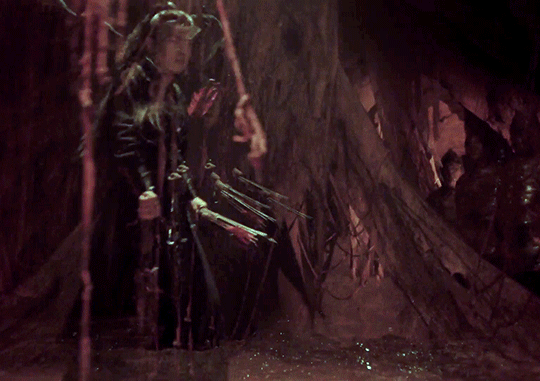
So this is what a vibrator with 4 batteries feels like
When Bowser comes looking for him, however, he quickly decides to go for it, grabbing the sword and singing "I've Got the Power (Gonna Make You Sweat)"
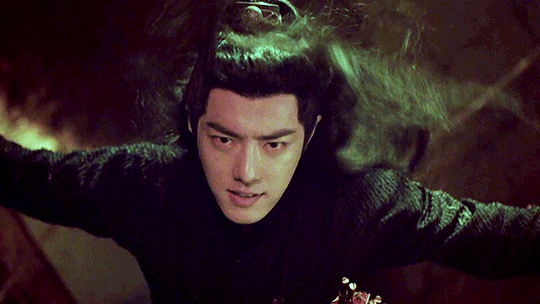
Wei Wuxian plunges the sword into Bowser's lower jaw, and Bowser pulls his entire head out of his shell with Wei Wuxian attached, while leaving the rest of his body and all rational laws of physics inside the shell.
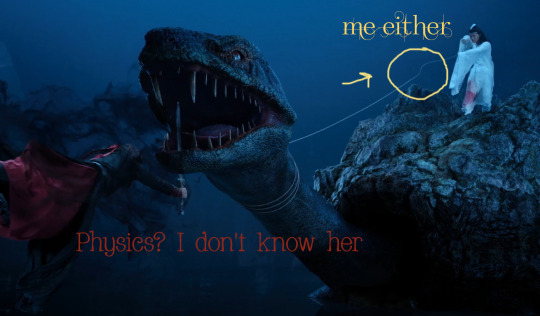
Gamera Versus the Cultivators
What follows is one of the more ridiculous action sequences in the history of the world, and I say that as someone who likes Mothra movies.
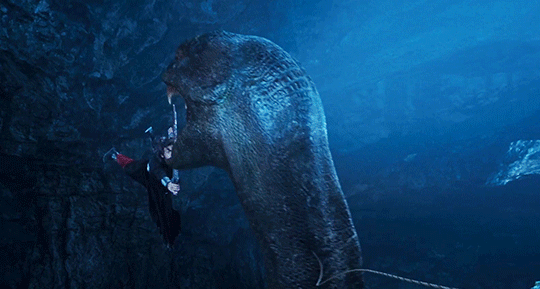
Wei Wuxian hovers in a perfect horizontal plank while “hanging from” the sword, which is held well below the level of his torso. While Bowser spins him around. For much of the time, Bowser keeps his head still and just waves his neck around.
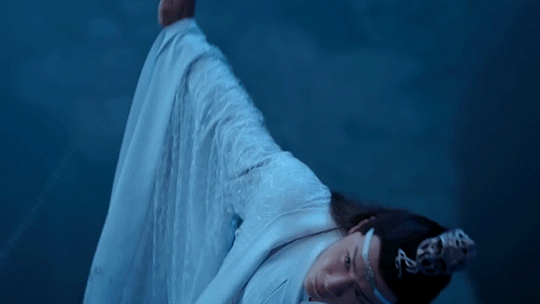
Lan Wangji and the camera operator do everything they possibly can to make "guy pulls on string" look interesting.
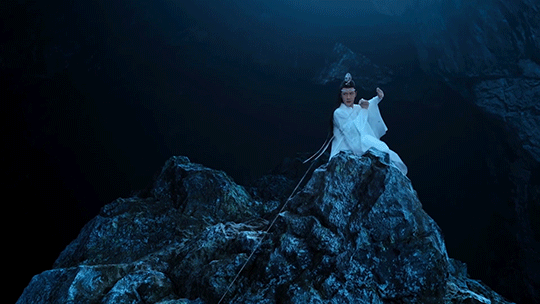
Everybody tries really, really hard and the actors are great at pretending something is there when it isn't, but this whole sequence is just horribly conceived.
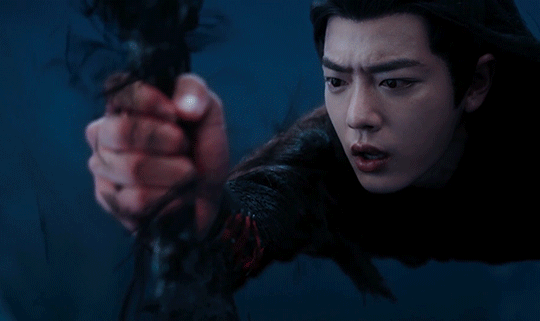
What works well, though, is the Yin energy and Wei Wuxian's wrangling of it. He starts off being frightened and overwhelmed, and looking like it's too much for him; I dont' know if they made his face puffy on purpose or if that's just what happens when you spend days hanging from the ceiling fighting an imaginary monster. But he looks slack and unwell as he grapples with the iron sword.
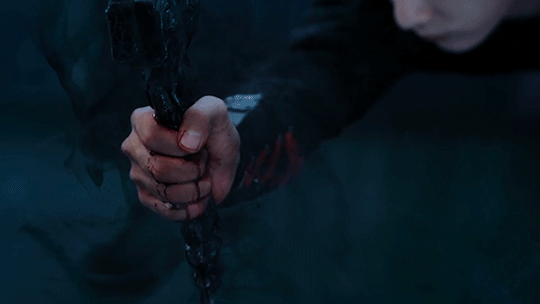
Which makes this moment, when he gets control of it, deliciously creepy. He uses the power of the Yin Iron to stick a bunch of pokey things into Bowser's neck.
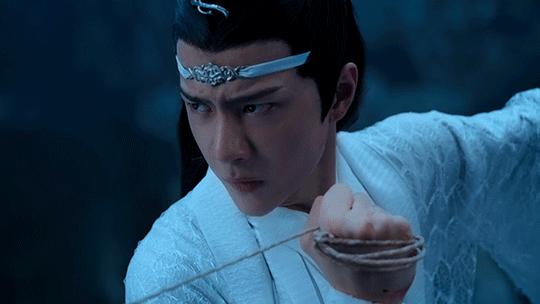
Lan Wangji has seen him struggling and now sees him...not struggling. Which scares the piss out of him, and he moves to finish the fight as quickly as possible, slicing up his hand and breaking the string. Combined with the pokey things, this does the trick and Bowser dies while Wei Wuxian faints and falls into the water.
Do the Whumpty Whump
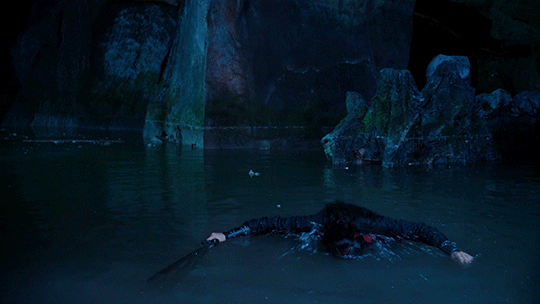
Lan Wangji rescues him and wakes him up, and Wei Wuxian clutches the Yin Iron sword and tells Lan Wangji that he was knocked out by the screaming of disembodied voices.
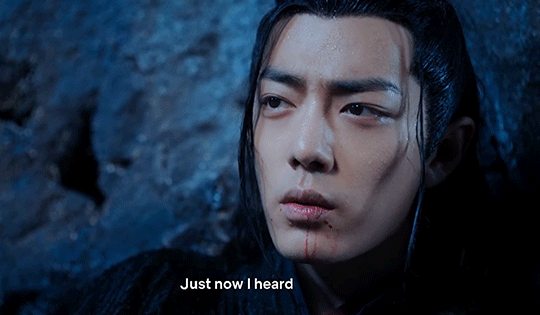
This certainly sounds like a strange and dangerous phenomenon, so Lan Wangji carefully asks him to explain everything.
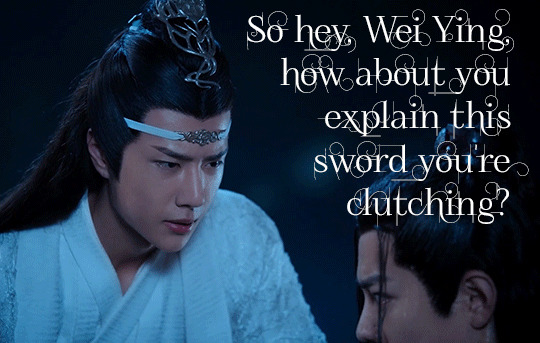
Ha ha ha j/k. Lan Wangji asks him exactly nothing about the strange sword or the black smoke or his weird evil smile or his new power over pointy objects. Lan Wangji appears to have a Star Trek: TNG level of unconcern about strange phenomena happening directly under his nose. But in fact he has noticed what's up, which is why he will be instantly distressed when he sees Wei Wuxian's flute moves at the Wen Corporate Headquarters.
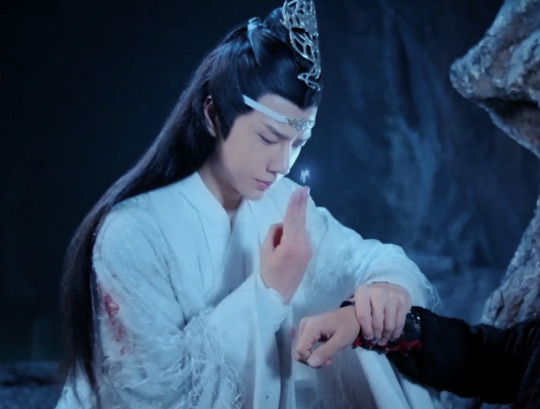
Wei Wuxian has a fever (stay positive test negative) and comments on Lan Wangji's being so nice to him.
Wei Wuxian: I could never have imagined Lan Er Gongzi acting this concerned about me. Lan Wangji: what else have you never imagined me doing, while we're on the subject?
Lan Wangji transfers a stream of spiritual energy to him. Lan Wangji has so much spiritual power he can be a battery for Wei Wuxian without breaking a sweat or, like, noticing whether Wei Wuxian has a golden core or not, for that matter.
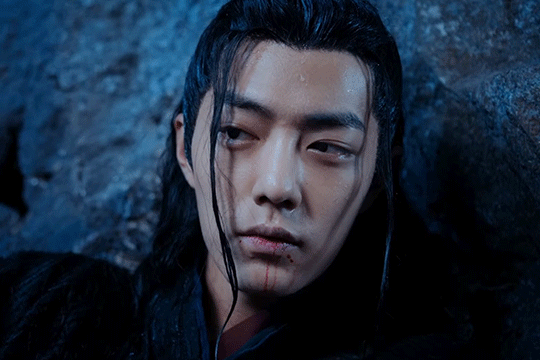
Wei Wuxian basks in the nice feeling of gigajoules for a while but then decides he's bored. So then he pouts, whines, and cajoles Lan Wangji in exactly, EXACTLY the way he whines at Jiang Yanli. I think this, while annoying of him, is a leap forward in his relationship with Lan Wangji.
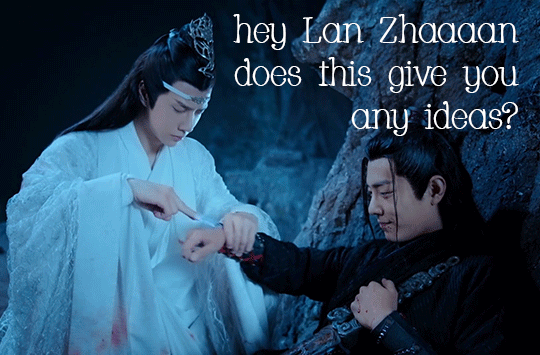
He's letting his guard down and not just allowing Lan Wangji to take care of him; he's demanding to be cared for on multiple vectors, when he asks the guy who's already busy healing him to sing to him as well.
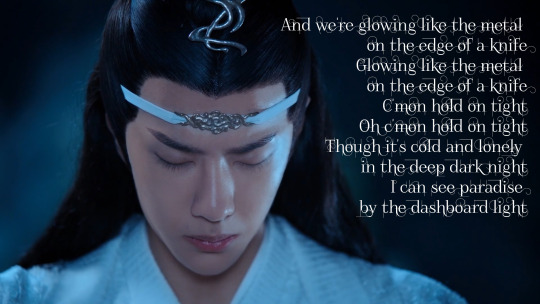
Lan Wangji obliges, singing him the song he composed about their love cultivation journey, while Wei Wuxian (or possibly Lan Wangji) (or possibly both) has a flashback to assorted sexy interactions that they've had so far.
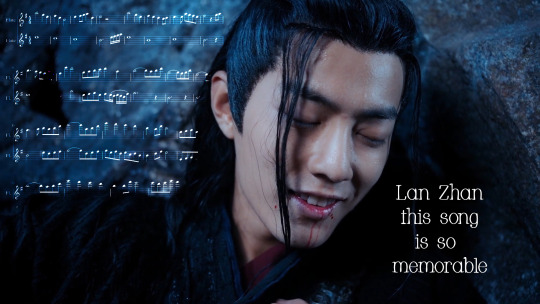
Wei Wuxian memorizes the song perfectly on one hearing, before passing out.
Writing Prompt: Baldur’s Gate III / Untamed Crossover AU featuring elf archer Lan Wangji
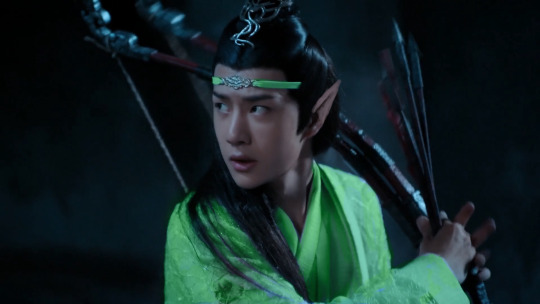
I DARE YOU
Soundtrack: 1. Everybody Dance Now by C+C Music Factory 2. Paradise by the Dashboard Light by Meatloaf
Wei Wuxian fainting tally (cumulative): 3
#fytheuntamed#the untamed#wangxian#the untamed gifs#the untamed meta#the untamed spoilers#restless rewatch the untamed#my gifs#canary3d-original#asian whump
325 notes
·
View notes
Note
please read the article 'How White Fandom is Colonizing "Character-Coding"' by Shafira Jordan and quit while you're ahead
Okay, so I read it and see the problem, and I’ll try to address all their points in order because I don’t wholly agree with the article. I know it’s a lot to read so I’ve put tldr; sections at the end of each :)
Misusing the Term Reinforces Negative Stereotypes for Marginalized People
The article essentially argues that labeling characters which are villainous as POC-coded is bad because they’re not morally pure and doing so "reinforces the idea that people of color are naturally dangerous and not to be trusted.”
Which is fair as you don’t want all the representation to be of ‘bad’ characters, but I also don’t believe all representative characters have to be ‘good’ either as it would be equally racist to divide good/bad in such a way. Not that I would place Loki under ‘bad’ to begin with, but arguing that characters shouldn’t be labelled as POC-coded for reasons unrelated to what’s presented in the narrative or because they did bad things is :/ even if lack of good representation is a prevalent issue in current Western and influenced media.
Ideally there should be a range of representative characters that fall into ‘good’, ‘bad’, and ‘anywhere in-between’ because variety and complexity in character types should, in theory, be treated as common practice (which can only happen with a multitude of representation!).
And a bit unrelated but... within the fictional context of Thor 1, all the Jotnar (sans Loki) are presented to the audience as ‘bad’ by default. They desperately want to get their Casket back to the point of attempting stealing it (from the ‘good’ characters), they fight the heroes and even when the gang and Thor (’good’ characters) are enjoying or going overboard with taking lives it’s inconsequential, Laufey wants to kill the opposing king (who just happens to be a ‘good’ character) and will resort to low-handed methods to do so, etc. The narrative itself is from the frame of reference of the ‘good’ and we only see warriors of Jotunheim though so we understand why it’s like this, because regardless of their race/experiences the narrative carries, even if it most definitely would be seen as racist from our real-life perspectives if the ‘monstrous’ race were presented by actual people of colour, even if it would make sense for the people on on different realms living in different environments to be different from each other, and realistic even for that to be the root of some conflict.
tldr; not using a specific label to prevent negative presentations of the characters seems a bit strange to do when the coding would be based off the text, but with limited representation available I see why it would be done, even if I still believe minority-coding is free game to expand/interpret.
Improperly Labeling a Character as “POC-coded” Suggests the Experiences of All People of Color are the Same
The article argues that labeling Loki as POC-coded “suggests that all people of color have the same experiences, when in reality, people of color come from different places, have different cultures, and have different traditions.” And while it’s true that the term doesn’t go into detail about which particular experiences (and these experiences can vary vastly due to diversity!) the appropriate measure would be to remove the umbrella term POC altogether as people of colour tend to also vary. But that’s also exactly why it’s an all-encompassing general term? It’s a way to denote anyone who isn’t “white” and has the associated cultural privilege that comes with the concept of white supremacy.
And, obviously, in the fictional setting presented, the concept of white supremacy is not prodded at, but cultural supremacy is definitely one that makes recurring appearances, right next to the parts about Asgard being a realm built on imperialism with ongoing colonial practice.
My take on this is that Loki’s narrative features a struggle with identity after finding out he’s of a different race and was being treated differently his entire life and being Jotun was presumably a part of the reasoning even if he didn’t know it. He’s basically treated as of less worth for inherently existing differently. I do believe that racism is a common-enough POC experience, but that while Loki was born with blue skin he passes/appears white which is why I don’t say that Loki is a POC, just that he has been coded/can be interpreted this way.
There’s also the entire thing with Loki trying to fit in and prove he belongs by trying to fit the theory and be The Most Asgardian by committing genocide (which ultimately makes no difference as he’s still not the ‘acceptable’ version of Asgardian), and the denial/rejection of his birth culture in destructively lashing out towards them (which even Thor is confused by because Loki isn’t typically violent), and the fact his self worth plummets and he is passively suicidal upon finding out he’s Jotun (internalized racism? general drop in self-worth after finding out he’s adopted and has been lied to? Bit of both?), but what do I know, I’m sure none of those are, at their base, common experiences or relatable feelings for anyone or decent rep because we see such themes on-screen presented wonderfully in different lights all the time.
tldr; every set of experiences could be different, some types of discrimination could overlap, if you limit an umbrella term to only very specific circumstances then it’s no longer an umbrella term.
Suggesting that White Characters are Meant to be Seen as People of Color Ignores the Actual Characters of Color that are Present in these Stories
I don’t agree with most of this section, but that may just be the way the arguments are put together, which I don’t blame the author for.
“ Implying that Loki is a person of color completely ignores Heimdall and Hogun, the only Black and Asian Asgardians who appear in the movie. ”
Characters such as Hogun and Heimdall which are played by actual people of colour have smaller roles in the films and any prejudice they could face for being POC in-universe isn’t made apparent, while Loki at the very least comes to the realization that something he couldn’t change (race, parentage,) was having him treated differently his whole life and had to come to terms with it. The Vanir/Aesir are also both treated similarly on-screen, and Heimdall having dark skin isn’t plot relevant, whereas Jotnar are treated as lesser consistently and are relevant through the movie (breaking into the vault, Thor and co. attack Jotunheim, Loki’s deal with Laufey, the attempted regicide (and the successful one XD), destroying jotunheim, Loki saying he’s not Thor’s brother,).
I also see including characters as POC-coded as... more representation? In all canon-compliant interpretations of the characters Hogun being Vanir is always explicitly mentioned because it’s a fact that just is, up to the appearance and even the world-building of Vanaheim in some fanworks use particularly East Asian culture as inspiration. I have never come across a Marvel fandom Heimdall interpretation where he’s not Black... but because these characters are more minor/side-characters of course they get less attention!
“ In Loki’s fandom, Heimdall’s name sometimes gets thrown in to suggest that it was he all along who was the real villain due to his “racism” against Loki and the rest of the Jotun. It is, of course, ironic to suggest that somehow the only Black Asgardian to appear in the movie can oppress the privileged white prince. “
I... don’t know where to start with this. But the example of theorizing given in the article wasn’t suggesting Heimdall was bad or trying to explain his actions in Thor 1 by saying he is Black... and just looking at a character’s actions shouldn’t be done less or more critically because of skin tone in my opinion. Heimdall may have been trying to do what was best and protect the realm but if the audience didn’t know that Loki was up to dodgy things then the coding would be switched around because he was trying to spy and committed treason and then tried to kill Loki. People... can hold feelings towards others... regardless of skin... and suspect them... for reasons other than skin... although I do still have questions about whether Heimdall knew Loki was Jotun or not. (Even if I personally don’t think it’d make a difference to how he’d treat Loki?)
Some Loki fans have also suggested that because Jotuns have blue skin that this alone makes him a person of color (even if the audience is only allowed to see Loki in his true Jotun form for mere seconds of screentime). This, again, shows a lack of understanding when it comes to race. It doesn’t matter what skin color the Jotuns have.
Race can differentiate between physical and/or behavioural characteristics!! Not being blue all the time doesn’t make him any less Jotun!! He’s got internalized stuff to work through and is used to being Aesir!! At least 1 parent is Jotun so even if Loki was passing as Aesir he’s probably Jotun!! (I don’t know how magic space genetics work for sure but Loki being Jotun was an entire very important jump-starting point in Thor 1!!). It’s a fantasy text and typically things like having different coloured skin indicates a different race or is sometimes if a species has multiple then is just considered a skin colour. That’s how coding works!! The Jotnar are very specifically the only race we see in the movie with a skin-tone not within the ‘normal’ human range, which alienates them to the audience from the get-go!! They’re an “other” and on the opposite side to the ‘good’ characters.
Both Loki and his birth father, Laufey (Colm Feore), are played by white men, and it is impossible for a white man to successfully play a character of color.
The specification of men here bothers me, but yes, you don’t get ‘white’ people to play characters of colour if it can be avoided. (And it can be avoided.)
This also connects with the previous point made that people of color come from various places. There is nothing specifically about the Jotun that could be traced to any specific person of color, and even if there were, there would be no way for white men to portray them without being disrespectful.
This is where arguments about the definition of coding and how specificity/generalizations and do/don’t come in. I know I’m subjective and lean towards the more rep the better, but while I agree ‘white’ people wouldn’t be able to respectfully play a POC I don’t think that rule should have to carry over into fantasy-based fiction. I know texts reflect on reality and reality can reflect within texts, but if contextually there is racial discrimination and there are similar ideas which resonate with the audience’s own experiences I’d say it’s coded well enough to allow that.
tldr; Thor 1′s narrative revolves mainly around Thor and Loki, of which race is kinda kinda a significant theme in Loki’s part of the story. Not so much explored with less-developed side characters such as Heimdall and Hogun, even though their actors are actual people of colour.
How Much of this is Really Well-Intentioned?
In the fantasy space viking world Heimdall and Hogun don’t face any on-screen prejudice and their appearance is not mentioned (which is nice, for sure! good to have casual rep!) but adding on to the roles they play in the narrative the explicit fantasy-racism in the movie isn't aimed at Asian/Black characters, but towards the Humans -to a lesser extent- and the Jotnar, including Loki, who only just found out he comes under that bracket.
The article mentions how fandom space toxicity often “reaches the actors who portray the characters,“ which is true, and it’s shameful that people have to justify their roles or presences are harassed for the pettiest things like skin tone/cultural background, but I don’t see coding characters as removing the spotlight from interesting characters such as those which are actually POC, rather expressing a demand for more rep, since well-written complex characters which are diverse are often absent/minor enough in the media, and therefore can get easily brushed aside in both canon and fandom spaces.
tldr; It’s obviously not a replacement for actual representation, but, if a character is marginalized and can be interpreted as coded, even if they would only be considered so within the context of the textual landscape, I don’t see why spreading awareness through exploring the coding as a possibility for the character shouldn’t be done, even if the media is being presented by people who are ‘white’ or privileged or may not fall into the categories themselves, as long as it’s done respectfully to those it could explicitly represent.
#please don’t patronize me by asking to quit while i’m ahead#it doesn't help anyone#so anyway i've summarized my opinion on the coding thing here for the many anons whose answers could be answered in this ask alone#i think i covered everything?#the article started out okay but I found it kinda :/ in places even though there were valid concerns#I do believe that in-universe context and creators of the media should be taken into account#and that if marginalized themes can be touched on by non-marginalized groups then... great? fictional texts can help people understand#i do also think that rep being presented should if not on-screen have people working on the product to support and ensure it's done well#the world is cold and harsh and cruel and i just wanted a desi Loki AU but here we are#I've got to try and summarize how I think Thor 1 presents Loki's part of the narrative well with POC-coding there because of fantasy-racism#even if the POC-coding is ignored the themes of racism are far too apparent to ignore#loki spends the entire film being a multi-dimensional character and having an entire downfall fueled by grief and a desire to be loved#I don't think attaching a label to such a character would be a negative thing... but perhaps for casual watchers it'd be a bit :/#apparently not everyone takes into account the 1000+ years of good behavior around that 1 year of betrayal/breakdown/identity crisis/torture#MetaAnalysisForTheWin#MAFTW#ThisPostIsLongerThanMyLifeSpan#TPILTMLS#AgreeToDisagreeOrNot#ATDON#poc-coding#yes i ignored everything not about loki in the article what about it#hmmm I know people are going to disagree with me with what should and shouldn't be allowed#I know some people are okay with it but some don't like the poc-coding thing#and that's fine#completely understandable#makes me uncomfy to talk about fictional space racism in comparison to real life but I do think that lack of rep is why coding is important#for some people coding is all that they get#but also!! @ifihadmypickofwishes suggested the term racial allegory and I do believe that is also suitable here!! so I’ll try using that too#rather than poc-coding even though I still believe it applies
141 notes
·
View notes
Photo
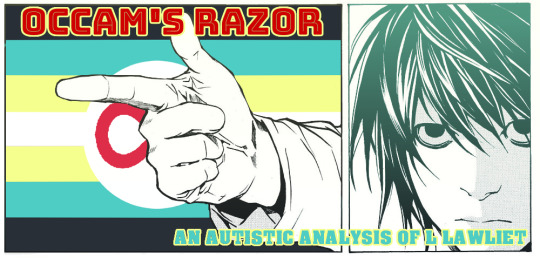
Occam's razor is the principle that, of two explanations that account for all the facts, the simpler one is more likely to be correct.
this post is going to cover traits specific to the manga and the television drama, since those are the best adaptations to showcase L’s autism. THIS POST is required reading before you read anything i’m about to type, because it explains what kind of character niche L falls into--an unintentionally autistic coded character. i’ll talk more about that at the end.
i’m going to talk about manga L first, since he’s the original version after all. i’m going to go in order of physical traits, to behavioral, to his character writing. also, tumblr eats posts that have outside links, so i’m going to have my non-tumblr sources in a separate post, here.
anyways, more under the cut!
MANGA/ANIME:
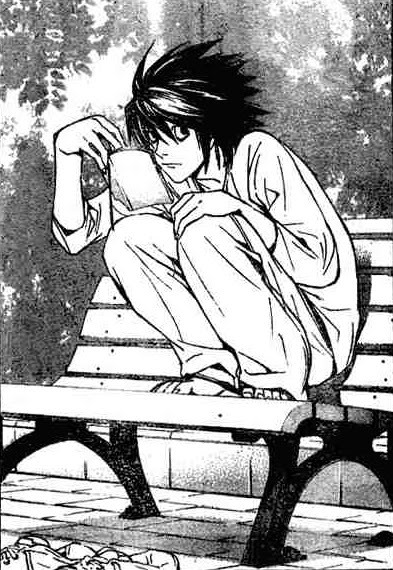
sitting with his legs up and spine bent / sitting on the floor
this is such a big one and its extremely common in ppl with autism. sitting in chairs normally is uncomfortable to outright painful w many ppl with these disorders, myself included. L sitting like that (which, to recall, is a blatant homage to sherlock holmes, another character that is so blatantly autistic coded you can find absolutely ridiculous amounts of writing on the topic) and being like "I HAVE TO SIT LIKE THIS TO THINK PROPERLY" is so autistic. like sitting in a certain way to give you specific sensory stimulus/avoid distracting discomfort and pain is a thing. i found this post (1) written by an autistic person on the topic of sitting in chairs being uncomfortable, and it says as much:
“I suspect that seating discomfort is common in autism (though by no means limited to autistic people). Many of us, particularly as children, benefit greatly from chairs designed to be non-stationary: rocking chairs, “fidget” chairs, and so forth. These can improve focus, compensate for proprioceptive hypo-sensitivity, and alleviate restlessness. In short, many “attention issues” can be fixed simply by providing a little motion for the person sitting. Small change, huge results. That's what accommodations do at their best. They make (often minor) adjustments that have profound impacts.”
so when L says that sitting the way he does, for a specific sensory experience, improves his ability to think, it’s perfectly in line with this idea. Also it’s a good pressure stim.
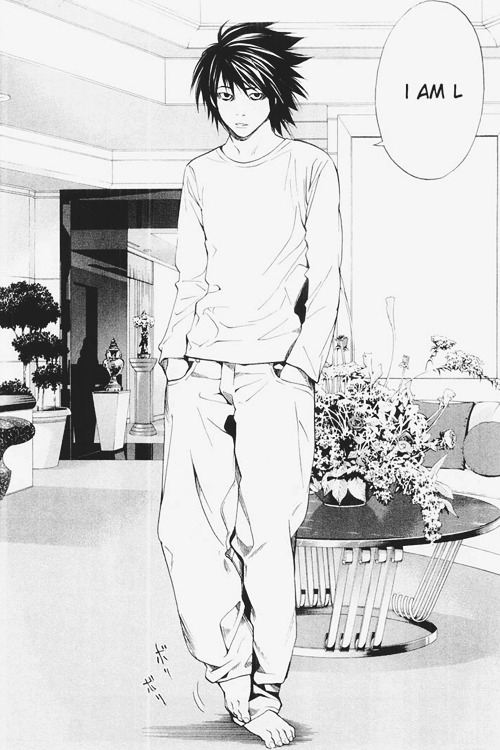
standing with a slouch / shifting his weight around
to begin: yes! it’s very common for autistic people to stand or walk oddly for a number of different reasons, from physical comorbidity to other issues such as dyspraxia (see: movie L). From an article by YAI (2), an I/DD (intellectual and/or developmental disabilities) community program:
“Kyphosis (a curved spine), collapsed chest, dropped shoulders and even scoliosis are observed in many of our patients. These myriad of postural issues may result from reduced strength, decreased biomechanical stability, or from a sensory impairment, such as apraxia.
Depending on the scene, L has mild to severe kyphosis which is very common in autistic individuals. Other things mentioned in that article if you want to click on it is instability in standing, where you sort of shift your weight around a lot between your feet or rest all of your weight on one foot, which L is literally doing the first time we see all of him.
speaking with a monotone voice.
i obviously can’t show a picture for this one and it honestly depends on the voice actor you find for L, but in the anime in particular L has a very flat tone. a lot of this is bc he has a dry sense of humor but. just know that it’s very common for autistic people to have a flat affect (or go the other way into being too loud/emotive).
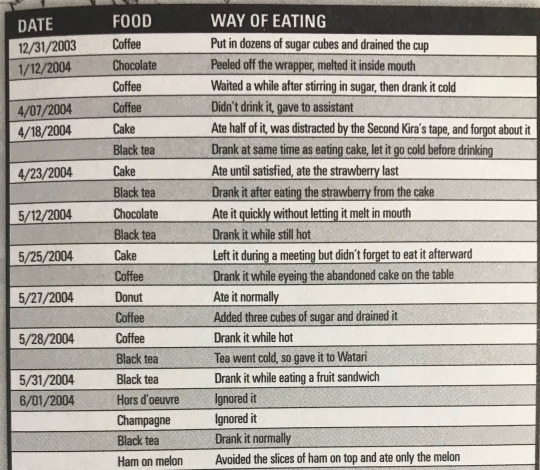
his eating habits.
a lot (a LOT) of autistic ppl myself included can only eat certain kinds of food for texture and flavor reasons. HOWEVER there’s a term in the autism community called “samefoods” which is really well put by tumblr users candidlyautistic and autism-asks:
“Samefoods or samefooding is a community word to describe the autistic trait of eating the same food over, and over and over . . . It is part sensory, part routine driven in most cases. A lot of times we samefood because we need that particular mouthfeel / texture / taste, and a lot of times even after that need passes, it turns into a need for routine until you actively dislike that food again.”
“Samefooding on the other hand is closer to a special interest. When I have a samefood (chocolate ice cream, currently), I really, really want that food. I could eat that food endlessly and not get tired of it. I will get upset if I’m not able to have the food in a day. For me, it usually is kind of routine based as well. For instance, with my current samefood, I have some in the evenings and it’s become part of how I wind down from my day.”
we don’t know exactly why L specifically desires sweet food or if he considers it part of his routine, but what we do know is that he really wants to eat sweet food and avoids eating anything other than sweet food, so it could either be that he’s a picky eater and can’t handle savory or he’s samefooding on sweets!
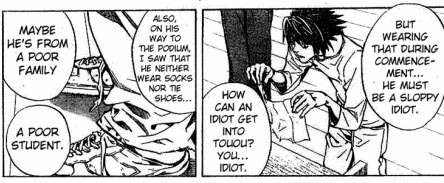
wearing the same clothes
L wears the same clothes every single day. It’s also worth noting that what he does wear is baggy, too-big clothing, the kind that wouldn’t be tight and uncomfortable. once again, sensory issues are a huge thing for autistic individuals. one of my favorite aspects is that in no adaptation does he wear socks. even L wears shoes, he wears them like slippers, not putting them on all the way. people comment that he seems like he’s poor, but we know for a fact that he’s very rich and that wearing these clothes is a personal choice he made.
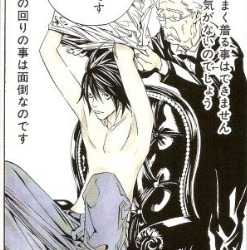
not caring for himself/outsourcing his self-care
i don’t think one day is exactly canon, rather it’s an exaggeration of what might actually happen--i.e. L doesn’t have a huge closet full of the same outfit, but he does have several versions of the same outfit on rotation; L doesn’t use a human washing machine, but Watari might help him/encourage him to bathe regularly. One Day is a parody comic, but it was made by the creators for a reason and that reason is that L pretty obviously relies on a caretaker (Watari) for his personal needs. Watari, in the manga proper, cooks and cleans and does most things for L. we’ll come back to this topic when we get to the drama though.

doing stimming behaviors
if you don’t know what stimming is, it refers to self-stimulating behaviors, usually involving repetitive movements or sounds. everyone stims to some extent, but in autism it tends to be more obvious, go on for longer, and sometimes be more disruptive to others. it’s often used to help deal with sensory overload, or used to express feelings--think of an autistic person being happy and flapping their hands in the air.
there are a LOT of instances of L displaying stimming behavior, from stacking his food or things on his desk, to spinning in his chair, to biting his fingers/using them to press on his lips, to wriggling and tapping his toes. here are some specific instances:
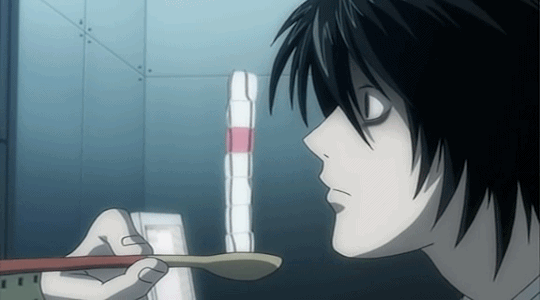
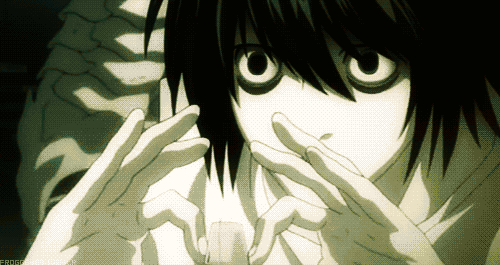
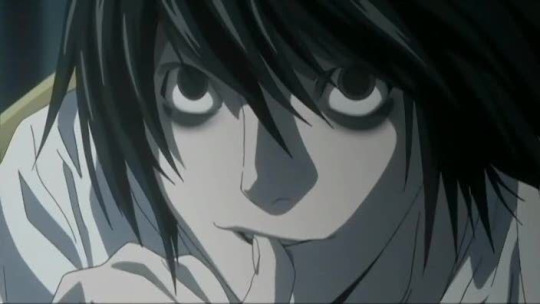
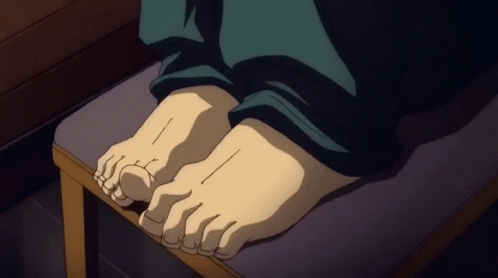
there are a lot more. i’ll talk about more when we get to dramaverse, but if you rewatch/reread death note it’s definitely worth noting whenever L does something like this!
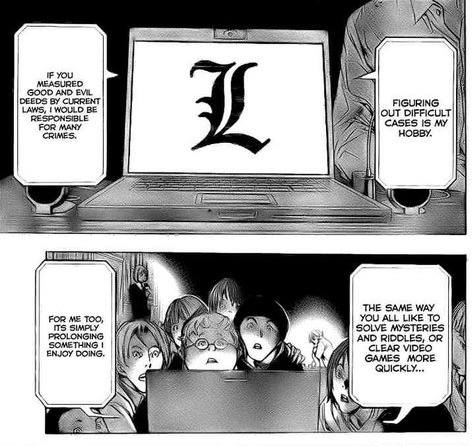
detective work as a special interest
ok, first and foremost i want to establish what a special interest is. Tumblr user cartoon has my favorite explanation of what a special interest is that i’ve seen to date:
“To have a deep, intense, passionate and incredibly focused / narrowed interest in a certain area of study, subject, topic or thing - to the exclusion of other interests. This interest is something that exists for the long-term, most often lasting for multiple months, years, or even you’re entire life “
L says that he only does detective work because it’s a hobby, and he finds it entertaining. We’ve also seen that he’s been at it for quite some time--if you take side content (the wammy’s house comic, LABB) seriously, then he’s been at it since childhood, with unwavering interest. it definitely comes across to me as L having a special interest in detective work, rather than it just being a normal hobby or a job for him, especially since he says it isn’t out of any moral obligation.
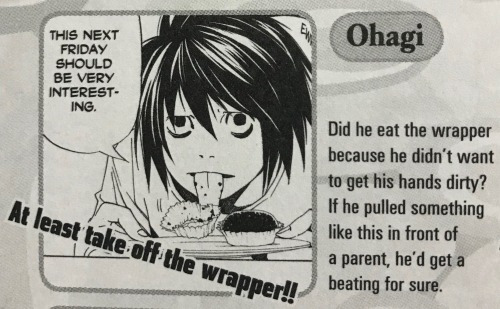
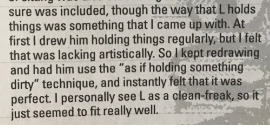
germaphobia
Germaphobia is very common for individuals with autism. a lot of the time it’s actually sensory issues associated with “dirty” things, and a lot of the time it’s because features of OCD are heavily comorbid with autism, including contamination OCD and such fears. regardless of the reason, though, L’s aversion to touching Bad Things is a very autistic behavior, and so is his resulting quirk that he tends to hold things in a very odd manner!

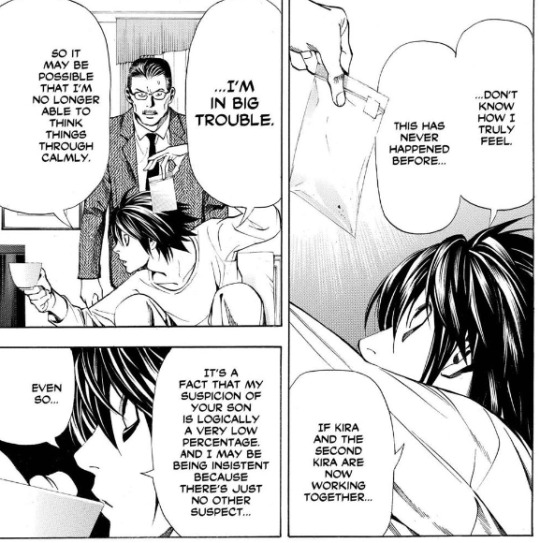
muted emotional expression
this is getting more into L’s character, but L tends to feel and express emotions in a very muted way. not to say he doesn’t have them, but for instance in the example above, L doesn’t have a solid grasp on what exactly he’s feeling. he thinks he might be acting irrationally and overemotionally because he logically should be afraid, but he isn’t sure, and none of these emotions present themselves visibly.
i’ve also seen it said that Ukita’s death is another good example of his muted response to emotion--he tells Aizawa to stay rational and his voice doesn’t waver as he tells him as much, but he holds himself tightly. for someone with poor emotional competence, these physical signs of distress can be hard to read in oneself, but Aizawa (a man who is extremely in-tune with his emotions) can tell immediately.
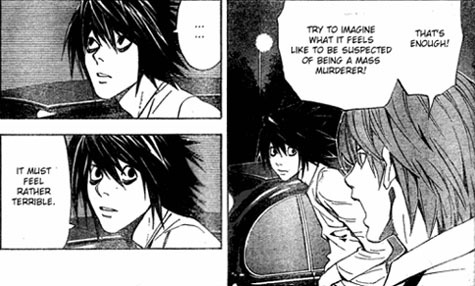
high logic, low empathy
L is also a character who, like many autistic people, lacks a certain degree of empathy. it’s not that he doesn’t have any, but it’s limited enough--and he values logic over it enough--that he’s willing to make extreme decisions and take a “ends justify the means” approach (such as using people as bait.) in the example above, L takes a moment to work through what it must actually feel like, which rings as very autistic.
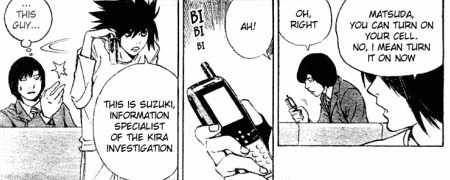
bluntness/not caring about social convention
there are so many examples of this i honestly could list them all day, but L is a character who is very to-the-point and doesn’t care about mincing his words. he can be outright rude to the people around him, especially if he considers them not worth basic courtesy. see: Matsuda.
DRAMAVERSE
if you all knew me you should have known this section is inevitable. i’m not going to talk about every single adaptation because i do not have the time and the only other adaptation that is meaningful in that regard is the movieverse (i am fairly certain that movie L is dyspraxic) but on account of the fact that i don’t care about them i won’t subject you all to them here.
anyway, drama L shows much the same traits as animanga L above (they are, after all, technically the same character) but he displays them in different ways.
he has a much more advanced degree of germaphobia, with Watari saying he’s sensitive to outside air and spraying everyone who enters his space with disinfectant, but not making them wash their hands or anything like that, so we can kind of tell that his issues are more rooted, again, in a fear of germs rather than any actual medical issue. he wants to feel as though he is clean, not necessarily actually be clean. this is very common in contamination OCD, which has a high comorbidity with autism. (my girlfriend has a very good headcanon post about drama L and OCD that isn’t so much analysis than just plain fun, but it’s worth a read!)
he stims, but he has a different array of stims than animanga L--he chews on his jelly pouch bottles,
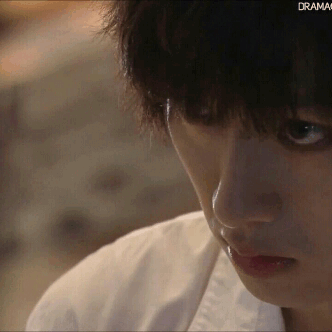
he tosses it between his hands,
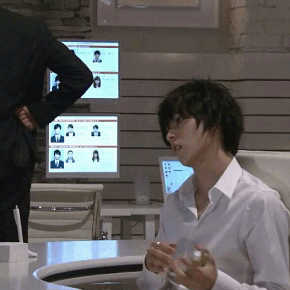
he kicks his feet,

and he bounces in his chair.

he still sits in an unconventional manner. he still samefoods, this time even more exclusively--he only eats Lucky Charge jelly pouches and nutritional bars. Watari onscreen puts his shirts on for him, as well as cooking, cleaning, and mending his clothes for him.
however, there are a few traits that are drama-exclusive that i think really add to an analysis of his autism!
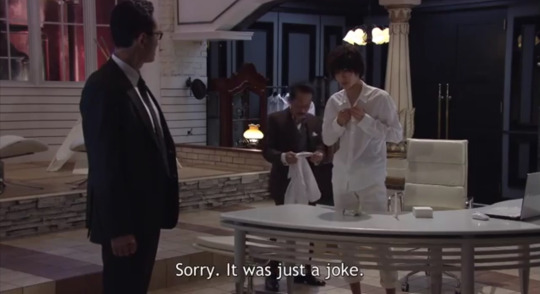
social scripting
social scripting and echolalic scripting are both commonly described as “scripting,” but are very different! echolalic scripting is like echolalia, but echolalic scripting is the recitation of longer passages of dialogue from things the individual has heard before. but social scripting is when you memorize common conversations so you can rattle it off without worrying too much! this can be very handy, such as exchanging basic pleasantries or ordering food, but it can also backfire if someone responds in a way your script’s not set up for. you can find more information on the difference in this video (3).
now, this relates to L in that there are two separate scenes where L says the same thing, rather inappropriately:
L: When I consider Kira’s personality, could it be that the strong-willed daughter is Kira? Or could that sweet-looking son of yours surprise us by proving to be him? You never know what humans are hiding beneath the surface... Soichiro: Enough. L: Sorry. It was just a joke.
-- Episode 2
L: Light-kun. Oh, I’m sorry... If I called you “Yagami-san,” it would be the same as what I call your father. Light: That’s okay. Call me whatever you want. L: Then what about Kira? (silence) L: It's a joke.
-- Episode 4
one could say that L just has a terrible sense of humor--and, of course, having a poor grasp of humor is common with autistic individuals--but the fact that he says nearly the same thing as a defense twice makes me feel as though he has it rehearsed as a defense when people react poorly to things he’s said, which happens often.
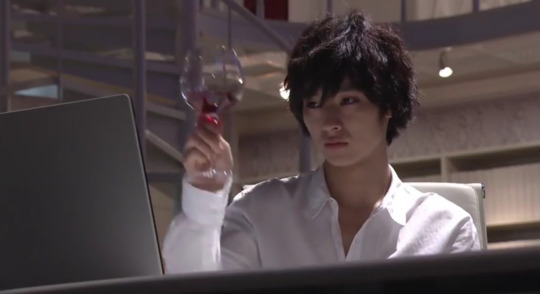
mirroring and echolalia
echolalia was briefly covered in the previous example, but for those unaware, via wikipedia (4):
Echolalia is the unsolicited repetition of vocalizations made by another person (when repeated by the same person, it is called palilalia). In its profound form it is automatic and effortless.
mirroring, on the other hand, is explained as such, also via wikipedia (5):
Mirroring is the behavior in which one person unconsciously imitates the gesture, speech pattern, or attitude of another. Mirroring often occurs in social situations, particularly in the company of close friends or family. The concept often affects other individuals' notions about the individual that is exhibiting mirroring behaviors, which can lead to the individual building rapport with others.
both of these are very common in autism, and they’re exemplified while L’s character is established watching his favorite TV show, Owarai Paradise. On one occasion, he’s watching the show and this dialogue happens:
Hiroshi: Despite never telling her how I felt, I still got dumped. I am Hiroshi. Watari: Who was this one again? L: He is Hiroshi. Hiroshi: I am Hiroshi. I am Hiroshi.
-- Episode 2
it’s important to note that in Japanese, “He is Hiroshi” and “I am Hiroshi” are said, at least in this instance, exactly the same, so L is echoing precisely what he’s heard.
On another occasion, L is again watching the show with a glass of wine (seemingly acquired simply to imitate the characters onscreen, as he never drinks it) and when the characters onscreen toast their glasses, L does the same, mirroring them.
CONCLUSION
I linked a post at the very beginning of this analysis talking about how characters are unintentionally autistic coded, and it’s important to understand how this unintentional coding is different from a headcanon--i didn’t make up these traits. they aren’t something that only exist in my head that i ascribe to L for fun.
i made this analysis both because i wanted to share L’s autistic coding in one cohesive place, because plenty of people have made lists before, but none that i could find that included so many examples with images and explanations--and i also made it because of the old ryuzaki persona “theory.”
for those unaware, the ryuzaki persona headcanon suggests that L faked all of these traits in order to make people uncomfortable, to put them off-guard and better mask his identity. i’ve seen posts about people claiming that nobody could actually behave in these ways, that L would surely be unhappy and uncomfortable sitting like that, or eating like that, or engaging in any of these behaviors. I’ve seen some people outright say that L isn’t autistic, but his persona is--that is, he’s pretending to be autistic.
i named this essay “occam’s razor” because, to me, L being autistic is the simplest answer to account for all of these traits. claiming that an autistic coded character is faking it is ableist and it just doesn’t make sense with anything else we know about his character.
but if you want to know more about that, i recommend reading eyecicles’ first!L tag. it’s debunked it in more ways than i ever could.
anyways, in conclusion
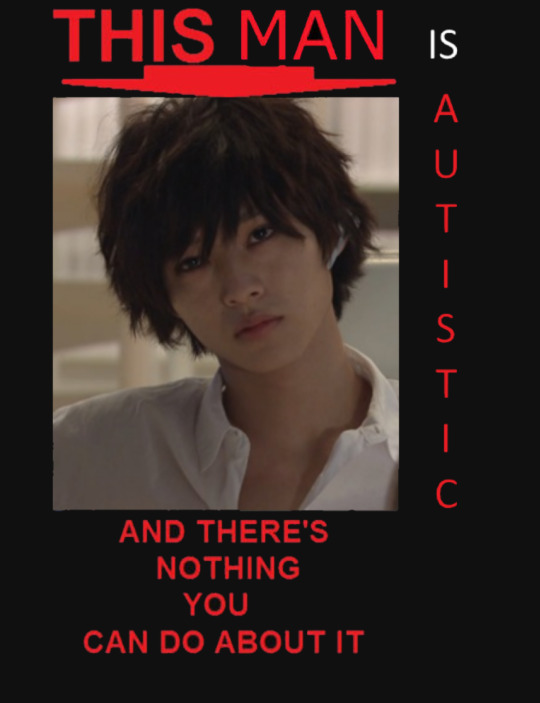
352 notes
·
View notes
Text
Random thoughts on ZSJL after 1st viewing
So dear DCEU fans, before I sit down to re-watch Zack Snyder’s Justice League again tonight, I thought I’d share some of my first impressions and thoughts on the film. I really wanted to take part in the watch party yesterday, but I knew I wouldn’t be able to give the film my full attention if I did so, especially since it would be my first viewing.
But now that I know what was inside my birthday gift (my birthday was March 18th), I can chat about it with others and discuss to my heart’s content.
However, this is NOT that post. This is not a review. It’s just some of my initial thoughts and reactions, which may or may not change after multiple viewings.
And yes, I will mark this post as “ZSJL spoilers” for anyone trying to remain unspoiled until they get a chance to watch it at their own pace.
Here we go ...
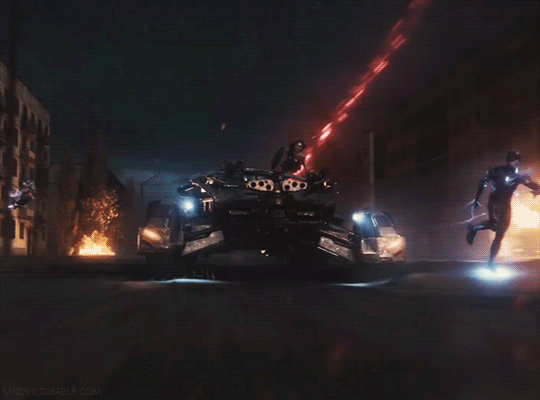
Question #1 - Why does Barry only burn out of his shoes, but nothing else he’s wearing when he moves to save Iris? Is it the friction against the floor? Or is it just convenient for the sake of visuals? We know the suit he made is designed to withstand wind and heat resistance when he moves, so when he’s not wearing it, are his clothes in danger of getting shredded if he moves fast enough?
This isn’t snark. I’m genuinely curious. :-)
Reaction #1 - I know it’s blasphemous to speak positively about the theatrical release, but I kind of miss the opening credit sequence with the song playing over the images and interactions of people arguing, fighting and falling into despair after Supes died. I felt it was an apt response in the world in the wake of his death, and it suited Zack’s overall tone connecting BvS to this film from the start. I’m not saying the new opening is bad. Just that I kind of liked the theatrical one better.
Question #2 - Now this is kinda snarky. But does Arthur just leave sweaters and shirts littered all over the place whenever he goes below the surface? What if there’s no one there to pick it up like that lady in Iceland?
Reaction #2 - I’m love, love, loving the much bigger role of the Amazons in this version. That battle scene with Steppenwolf is still brutal to watch, but the extra screen time is much appreciated.
Reaction #3 - I’m now calling the arrow shot into the Shrine of the Amazons the “Hanukkah Arrow” because it was a miracle the fire stayed lit during its entire journey to the Shrine and how it stayed lit until a film crew caught it on the news.
R#4 - Even though I knew Victor’s car accident was coming, I was still shook when it happened. Like, I genuinely screamed when the other vehicle crashed into them. That’s how emotionally invested I was in that scene at the time.
R#5 - I liked the juxtaposition of going from Victor’s dysfunctional relationship with his dad to Barry’s sweet, but heartbreaking relationship with his dad. Way to mess with our emotions, Zack.
R#6 - “gorilla sign language” Tee-hee!
R#7 - Great placement with the suicide prevention billboard. It was both seamless and poignant.
R#8 - As a fellow tea drinker, I like that Alfred is particular about how tea is made, even when the cup of tea isn’t for himself.
R#9 - It’s interesting to see how jerky Victor’s movements are in Chapter 3. I know he will move more smoothly as the film progresses, but I feel like that growth and development in his movements were missed in the theatrical release, which is a shame because it’s a great mirror to his psychological development as well.
R#10 - It’s a shame how easily Steppenwolf captured the 2nd box thanks to King Orm’s incompetence. Ugh. I can’t stand that guy.
Question #3 - Why is Arthur responsible for retrieving the box that was lost on his brother’s watch? He’s not king yet, so why does it fall to him? Whatever. Orm sucks.
Question #4 - OK. So I know this was in theatrical release, but how is it that the other team members disappeared when Commissioner Gordon turned his back and Barry didn’t notice it happening? That technically should be impossible unless Barry was distracted by a squirrel or something.
Favorite Hell Yeah Moment #1 - Barry saving the kidnapped people from being hit by the falling debris outside after the team rescues them from Steppenwolf. Go Barry! Do that shit!!! You don’t need lessons on how to be a f*cking hero!
R#11 - So Barry did trip in the original script. Interesting. I still don’t like that. It’s in character for where he is right now on his journey, but I still don’t like it.
Question #5 - Architectural question for the design nerds out there. Why does Lois have a glass pane in her front door in an apartment building in a major metro area in the US? That’s an odd design. Is it a renovated office building? Was her apartment at one point the office of a private detective in a noir film? I need answers.
Favorite Hell Yeah Moment #2 - The J’onn J’onzz reveal is officially one of my biggest thrills of the entire DCEU franchise. Years ago, when people were speculating about who was the 7th in the phrase “Unite the 7,” I said it’s J’onn J’onzz, and fanboys corrected me and insisted it had to be Hal or at least one of the Lanterns. And I was like, “Nope. I bet you it’s J’onn. He could easily already be a part of the story and we don’t even know it.” This is the part where I say to you ... Called It! Like 6 years ago! I f*cking Called It!
R#12 - Yep, by Chapter 5, Victor is moving much more smoothly.
R#13 - Dude!!!!!! The “Not Impressed” moment was better than anything Supes ever did in the theatrical release. Anything. It was just so epic and smooth and smoothly epic. I’m accepting that scene as a part of my personal birthday gift. Zack did that for me. That’s why that’s in there.
R#14 - I know Barry got a couple of hero moments earlier in the film, but none of them compare to the actual reconstruction of f*cking time in order to save everyone. The way the ground literally formed under his feet as he ran had me holding my breath without me even realizing it. Thank you, Zack! Thank you for making Barry more than the comedy relief. Thank you for giving him this moment. He deserves this.
Favorite Hell Yeah Moment #3 - I know everyone is talking about how they cheered when the team goes charging into the building altogether (sans Supes). And don’t get me wrong. That moment is pretty f’cking sweet. But dude, my all-time favorite, jump-out-of-my-seat, and jump-up-and-down moment was when Arthur speared Steppenwolf from behind and lifted him up in the air. I was like ...

The fangirl in me was unashamed and unbossed. Arthur deserved that moment. He spent half the film being tossed around like a ragdoll or brooding like a hot stevedore. He deserved that shit! Yes, yes, he did.
Epilogue thoughts ---
Again, this is the longest film epilogue I’ve seen since LOTR: Return of the King, but I’m not hating, just noting.
The extra scenes with J’onn J’onzz and Deathstroke made my day after everything else made my night. They are 2 of my absolute favorite DC characters who were all but cut from the theatrical release. I’m taking those scenes as ... again ... my personal birthday gifts.
I know we may never get JL2 and JL3, but I felt like the cliffhanger was pretty good. It leaves you wanting more, but not feeling as if you’ve been left high and dry. For those who doubted Zack’s decision to keep it a cliffhanger knowing he may never get to finish the story, I say to you, “Aren’t you tired of doubting this man?”
#zack snyder#zack snyder's justice league#justice league 2021#zsjl spoilers#zsjl#dceu positivity#dceu#dc comics#martian manhunter#j'onn j'onzz#deathstroke#slade wilson#arthur curry#barry allen#victor stone
62 notes
·
View notes
Text
TL/DR - Catra is a uniquely complex and compelling character who has -so much going on- compared with most characters in any medium. Her character arc is psychologically astute, morally powerful and dramatically compelling, and it pushes the boundaries of the audiences sympathies in ways that are really groundbreaking for a kids show, and her arcs conclusion celebrates love, growth, and the power to change in a way that is all too rare in TV for grown ups.
Content note for mentions of suicidal ideation and self harm.
Well, now that the summary is out of the way, here’s a massive fucking dissertation on why Catra is such a great character.
This is the first of a series of posts outlining things that make She Ra a truly great show, one that stands out even 15 years into a golden age of TV animation for kids. This isn’t going to be a comprehensive account for why the show is great - the real answer is that this show has so many arcs and so many fully realized characters and they are all growing and changing in ways that interact with each other and complement each other so well. But I’m going to highlight some particular standouts, things that this show does better than anything else, things that made me step back and say ‘holy shit they did this in a show pitched at 10 year olds?!’
And so the first of these posts is about Catra. I’ve never seen a character in a kids TV show like Catra before. Depending on the season, she’s an anti-villain, an outright villain and an anti-hero and then, in the end, a hero. Being glib, I describe her in villain mode as a Saturday morning cartoon Supervillain as written by like, Dostoevsky. She’s got the trappings of classic villain camp - long speeches, sneering, over-complicated plans, she’s oddly ineffectual at times etc/ Yet all of this is underlaid and justified by something much deeper - her feelings of rejection, her desire to lash out at everyone around her, at her self-hatred and hatred of everyone and everything else (at least by Season 4. Good God.) And her actions are as dark as her motivations - she nearly destroys reality out of spite, betrays literally everyone who cares about her (often multiple times) and isolates herself so completely that in the season 4 finale she is a solitary, suicidal wreck of a person. Hell, in her last fight with Hordak, I was definitely rooting for Hordak (to say nothing of Glimmer, who is a pretty impressive antiheroine, like if Sparkles had just blasted her into glittery oblivion would we have held it against her?).
Let's start by discussing trauma. It comes up a lot with Catra for obvious and good reasons. But I almost feel like that word is insufficient for what's going on with Catra, or at least, we shouldn't stop with it (I know there are terms like complex trauma, but rather than simply using those I want to explain the difference between Catra’s consistent abuse and a single traumatic event). To use another example from a different show, Korra was also traumatized in season 4. But she was traumatized by a series of an events when she was a young adult. She had something horrible happen to her, and it fucked her up, and then she had exposure therapy with Zaheer and at least starts to get better. Catra...Catra is much more consistently abused. It's not just that shadow weaver traumatized her with the various acts of torture, but that Shadow Weaver taught Catra both an explicit worldview and a series of coping mechanisms that she struggles with through young adulthood. First, Shadow Weaver trained Catra to seek her approval. This is something she is particularly vulnerable to with Shadow Weaver, but also what she does with Hordak and to a extent Double Trouble. Catra's instinct when people mistreat her or show that they aren't trustworthy is to invest further in the relationship, until the breaking point. By contrast, when people treat her well Catra lashes out or takes them for granted. This is uh…a dymamic I am acquainted with among people who have been abused as kids, people whom I love. It is pretty rough.
She also developed a desire to prove herself. This starts off being tied to her drive for approval, but combined with her competitive streak (which is expressed in both healthy and unhealthy ways with Adora) it turns into a desire to beat Shadow Weaver and then Hordak at their own game.
At the same time, Catra learned by always being blamed for everything to evade and deny responsibility, no matter what. I think this form of self reassurance is tied to her self doubt (I think at some level she does think she is worthless) and her self hatred. It is also enabled by Adora’s martyr complex and willingness even act as Catra’s punching bag (as we see in the flashback in Corridors). This is a dynamic that actually repeats in an even worse fashion with Scorpia. Far from being arrogant, her constant evasions, put downs against others and preening speeches sound like the words of a woman who is trying to convince herself most of all. This tendency borders on narcissistic self delusion by season 3-4, which she begins recounting her version of events and possibly believing it even when it is obviously false, and everyone knows it.
When it comes to worldviews, Shadow Weaver taught Catra that love is about control and manipulation. We see this in seasons 1-3 where she congratulates herself for manipulating Adora when all she has done is take advantage of Adora's lingering love for her. Meanwhile, she’s learned that power is her only protection, and that the only way to stay on top is to abuse those beneath her.
The final kind of static tendency in Catra is her identity in the horde and her view of herself as one of the bad guys. This is something she rarely articulates but underlies much of her her decision to stay and not join Adora (at least at first). I think one thing to consider is that even if Catra never believed horde propaganda, it may have made her cynical and unwilling to imagine something better for herself or the world. Another factor is having struggled to belong in the horde for so long, she isn't going to give up now. At first this ties into her desire to win the approval of shadow weaver and Hordak, then it comes from her desire to prove herself better than them. Another factor is her self hatred. She sees herself as someone who hurts people, perhaps as a monster. She sees herself as a bad guy and so team evil is her side.
So yeah, our girl is kinda fucked up.
And yet Catra is never reduced to the sum of her traumas and bad habits. At every step of the way she is shown as a moral agent. She is shaped by shadow Weaver's abuse but she remains aware of and responsible for her actions. This is a double edged sword. She is fully responsible for her actions, but also she is never shown as broken by abuse or mental illness. She’s fully responsible, but by the same token is also redeemable, because she still has a choice.
So with that our of the way, let's go to Catra's arc.
I’m not going to recite everything terrible Catra does because I’m still on my first complete rewatch and I honestly find it hard to list it all. It’s a lot. So let’s talk about her shifting motivations. Early on, we see her desire for approval and recognition motivating her in ways that are so easy to sympathize with - she’s been told she’s worthless for years, and she wants to be worth something. We see how much she’s been scarred by Shadow Weavers abuse and by the ruthlessness and callousness of the Horde, and can sympathize with her desire to survive and advance since her own position is so untenable. We also see how, at first, she wants to be reunited with Adora. Her first huge turn into much darker territory is Promises, when she tries to kill Adora in order to permanently sever her connection with her own life and eliminate a possible rival for advancement (should Adora ever return). She’s told herself that she doesn’t want Adora back, and at least partly means it. Yet we still show her care for Scorpia and Entrapta and even Shadow Weaver in Season 2. It’s when Catra realizes that Shadow Weaver has chosen Adora over her once again that she takes her darkest turn. It’s not just that she destroys reality out of spite, it’s that she rejects her chance for a better and happier life, betrays every friend she has and focuses single-mindedly on hurting Adora (and arguably herself) and then on surviving when her attempt fails. Then Catra spends an entire season both fully inhabiting her role as a villain (and not a sympathetic one - really only our history with her leaves us sympathetic) and being utterly self-destructive and miserable. At the end, as mentioned, she’s a broken, suicidal wreck who has destroyed everything she’s strived for. If this was an HBO drama, we’d roll credits here and she’d go down as another self-destructive antihero. It would perhaps be too much to call her ‘Walter White as a catgirl’, but still. Of course, her story doesn’t end there.
Something that is incredibly dark that is happening in step with this is Catra’s hardening of herself, indeed, her dehumanization of herself. We see her struggle with her natural compassion, her kindness, her need for connection, her desire for happiness, and we see her ignore it all, stamp it down and nearly snuff it out. This is a huge factor in her descent into becoming a real villain (no ‘anti’ qualifiers needed). Every step of her descent is a struggle for Catra - not going with Adora in the second part of ‘The Sword’, trying to kill Adora in ‘Promise’, going back to the Horde, betraying Entrapta, lying about Entrapta, threatening Scorpia, destroying the world - but she always chooses evil. And with every step she becomes more isolated, more callous, and more cruel. Her default reaction becomes not just bravado and mockery and insolence, but threats, bullying and intimidation, until her management style is identical to Hordak’s, and indeed, is quite a bit worse. Catra starts off fighting for Hordak and Shadow Weaver’s approval and struggling to survive, and ends up cackling maniacally at her brutal and murderous conquests. She has very deliberately turned herself into a cruel conqueror, and a tyrant. This self-dehumanization is a huge part of evil in the world, I think, and it’s really powerful to see it so clearly in a kids show.
Meanwhile her insistence on evading all responsibility finally results in a self-serving, self-protective narrative that insulates her from responsibility or self-examination but also cuts her off from reality and other people. It’s always a bit unclear to what extent her various untruths (about Adora leaving her, about Shadow Weaver’s escape and her concealment of it not being her fault, about Entrapta betraying Hordak) are things she believes, lies she is telling to have power over others (mostly Scorpia) or things that she doesn’t quite believe but is trying to convince herself of. It’s probably all of these at various times, and in different degrees for each lie. The end result is that Catra is even more alone, because only she inhabits the safe cocoon of lies she’s built around herself. It also is the key to her and the Horde’s downfall - Catra is so isolated and in such denial that she can’t see how thin her forces are spread, and this crack shows up even in episode 1 of Season 4, with her insistence that the Princess Alliance is in shambles (when, in fact, it’s already rebounding, and proves more resilient than she allows herself to believe, and is led by a woman as ruthless and determined as herself). This part of Catra’s arc brilliantly shows how deception (of yourself and others) can feel protective by keeping shame at bay, but ultimately is destructive and strips someone of so much of the intellectual and moral qualities that we call ‘human.’ It’s also chilling to see since we’ve seen the end game of this mentality play out in US national politics, at the highest level.
I said at the opening that we’ve never seen a sympathetic character like Catra in a kids show. What about Zuko? I would argue that Zuko is never a cruel, or as callous, or as self-destructive as Catra is at her worst. Zuko is motivated by a desire for recognition from his abusive father (much like Catra is initially motivated by desire for recognition from Hordak and Shadow Weaver, and indeed Adora), and perhaps a desire to belong in the Fire Nation. All of this gets wrapped together in his ‘Honor’. He’s a young man with a very weak sense of what he truly believes, instead relying on external guides to what he should do. He’s also incredibly self-involved, and initially indifferent to anyone’s pain but his own and anyone’s needs but his own need to restore his honor. Uncle Iroh is there throughout to push Zuko both to see the needs of others and to become his own person. Zuko’s redemption arc, then, is a twofold quest to recognize other people and to find his own moral center and act from it. This is a pretty powerful coming of age story in that it is about him becoming his own person and throwing off the shackles of his upbringing. Politically, it’s a powerful story of a young man taking responsibility for his own actions in an authoritarian regime and refusing to participate in its imperialism any more and to embrace a new way forward both for himself and his nation. At the same time, in some ways it is easy to sympathize with Zuko because his greatest crimes are those of weakness - he’s not strong enough to stand up to his nation and his family until midway through the last season. Catra though...Catra does what she does, eventually, because she wants to hurt people. She’s cruel, and spiteful, and destructive in ways that are truly scary and which prevent any excuse or mitigation.
Which brings up the other comparison - Azula. But while Azula is (somewhat inconsistently) shown either as a monstrous child sociopath or a traumatized and broken child who can’t help it (and thus, perversely, as not a moral agent but something like a monster), Catra is consistently shown as a moral agent. Catra chooses her own path, every step of the way. She has so many chances to do something else - Adora’s offers to leave together in the two-part series opener, Promises, Scorpia’s suggestion that they dessert the Horde and become desert gang leaders, etc - and until season 5, she turns them all down. While Azula seems destined for evil and madness, with Catra we see a young woman very deliberately walk down the path into unmitigated evil with both eyes open. And then we see it destroy her.
And after she is basically destroyed, we see her build herself back. This process actually starts in Season 4 with the creeping realization that even when she is winning she is miserable and alone. She doesn’t even notice Scorpia is gone for several episodes, then she completely loses it. She spends the entire time when she is at her most triumphant isolated and raging and borderline incoherent, as ineffectual as she accuses Hordak of being. She’s won, and she’s alone, and she’s the most unhappy she has ever been, and I think for the first time she realizes that. And that’s the worst blow to her, even before all the external things come crashing down. She’s already miserable before Double Trouble and Glimmer deal her a triple coup de grace of destroying all her armies*, turning her and Hordak against each other and then Double Trouble’s epic evisceration. By the time Glimmer shows up, Catra is, as mentioned, literally suicidal. But she’s also already begun the process of changing in that she knows that she has a problem (her, and her self/other-destructive tendencies). Moreover, she knows, at some level, that what she really wants isn’t conquest, or to prove herself as the baddest leader of the Horde, but love - and she’s seen how she’s squandered that at every opportunity.
Let’s just pause for a moment to observe how much better Glimmer is at villainous machinations than Catra. In a couple episodes she makes a faustian bargain for unlimited power, kills all her enemies armies, sets her two chief foes at each other’s throats and literally cripples one while rendering the other helpless. And given her ironic non-answer about hurting Catra (‘we’re the good guys, remember?’ and the fact that she’d tried to kill Catra twice before**, she walked into Hordak’s sanctum fully intending to end Catra’s life, one way or another. She does all this through ruthlessness, recklessness and treachery, and she could give like, a TED talk on villainy. Of course it also blows up in her face and is actually way worse than the portal did in Catra’s, endangering the whole universe (I always assumed that the portal only threatened Despondos), dooming Etheria to invasion and all that. Of course, Catra pulled that switch and then fought Adora knowing that the world was ending, while Glimmer was just ignoring warnings from...just about everyone, including Shadow Weaver. So yeah, Glimmer, best kids show antihero since Princess Bubblegum***(unless we’re counting Catra as an antihero, which works for the first half of season 5).
Anyway, at the beginning of Season 5 Catra is adrift. Though some interpretations, like TV tropes, see her as immediately falling back into old habits and casting her lot in with Prime, I see her actions from the end of Season 4 onwards as more ambivalent. She seems to be kind of...going through the motions. She doesn’t have any of the drive or passion in her plotting that she once did, she seems to be maneuvering into Prime’s good graces out of habit. At best she’s back in the survival mode of early season 1, but without the ambition and desire to prove herself that motivated her. Some interpretations put a lot of stock in Prime being someone that can’t be bargained with or appeased, but...I don’t buy it. I take him, to an extent, at his word when he says that he was ‘exalt’ Catra (I am sure it is something awful). Catra actually gets what she wants halfway through “Corridors.” Only it’s not what she wants. She’s done jockeying for advantage, especially in a world where she truly would be alone because all she has is this psychopathic narcissist and his clones for company. She wants connection. She wants to do what is right. She’s suppressed all her humanity (felinitity? Anyway) for years and it’s made her miserable, and now she’s ready to embrace it. At the same time she confronts her own culpability, seeing just how much harm she’s done and admitting it for the first time. Her first lifeline is Glimmer, the only person she can actually talk to, the only other Etherian, the woman whose mother she doomed and who has nearly killed her three times. But Glimmer is also going through her own dark night of the soul - Glimmer and Catra’s character arcs were converging at the same time that Catra’s and Adoras and Glimmer’s and Adora’s were diverging. And they come together on either side of that forcefield, just talking and being people in an environment that is designed to be as dehumanizing as possible. Even this barest lifeline is enough for Catra to hold on to for dear life, and enough to inspire her to not just feel bad about the bad things she’s done, but do something good.
But the first way she does this is a cop out. Her plan, like Shadow Weaver’s in the finale, is to sacrifice/kill herself doing ‘one good thing.’ That way she doesn’t have to figure out how to live with the consequences of her actions, face the possible rejection of the people she loves whom she’s wronged, and do the hard work of building herself back up as a better person. She gets to die a hero rather than live as a villain. That said, unlike Shadow Weaver she does at least get off one apology, and it makes all the difference.
Then Adora fucks Catra’s sacrifice up, in glorious, space operatic, gay AF pulp fiction fashion, by saving the cat. Catra is mind controlled or unconscious for most of this episode, but what she does do is so crucial. When Adora comes for her, she reaches out to her, as soon as she is able. She doesn’t push her away, she takes Adora’s help, and her love, and Adora does the rest in badass fashion. The next few episodes plus the so perfect its canon Don’t Go are my favorite part of Catra’s entire arc.
She nearly falls back into her old habits, at least partly. Now that she has to live with what she’s done rather than just dying for it she just wants to run away again. But when she has to choose between losing Adora all over again and confronting herself and her past, she chooses Adora, and asks her to stay.
Catra then spends the rest of Season 5 slowly easing herself into the very human world of the Princess Alliance - the comaradery, the dedication to others and a cause, the goofiness. I’m going to talk a lot more about her relationship with Adora in my Catradora post, but I do want to highlight three moments.
The first is Catra running away again. This is actually a big change from what she’s done before - she’s not leaving because she’s angry, or bitter, or spiteful, she’s leaving because she doesn’t want to see the woman she loves sacrifice herself yet again (maybe this time for good) after being manipulated by the woman who had abused them both. But then she comes back. And then she confronts her abuser in a way that she has never done before - for the first time in the series, she not only calls Shadow Weaver out but calls her to do the right thing, and doesn’t give up until she does (this is after Adora also calls SW out and cuts her off forever, meaning that her two charges have finally called her on her bullshit and chosen each other over her, more in my Shadow Weaver Rant...and I guess my Catradora rant).
Then, at the end, Catra both stays with Adora through her potentially fatal harnessing of the Heart of Etheria and then her comes in and rescues her by challenging her to do something for Catra and for herself. Not to be with Catra, or to kiss her, or love her, but just stay for her. Needless to say, Adora responds far more enthusiastically than Catra had dared hope. (more on this in my Catradora rant).
Catra starts the show convinced she doesn’t need anyone except Adora, and she’s willing to even push Adora away if she can’t have Adora on her own terms. She goes down that path - ambition, manipulation, treachery, cruelty and isolation - until she has nothing left. She then slowly, painfully, turns around and reaches out and begins to heal the pain in Etheria and the universe rather than causing more. This is a psychological journey in many ways, but even more than that it is a profoundly moral one. It is a story of her accepting responsibility for her actions, facing reality, reaching out to others and making amends. It is in every sense a redemption. And while it works perfectly with Adora’s own development into her own, fuller, happier, healthier person, it works not because of Adora or the power of love, but because of Catra herself. Adora’s companionship, Adora’s rescuing of her and holding her to account, all of these are necessary for Catra to change for the better. But in the end it is Catra herself who chooses the right path, maybe for the first time in her life. And that’s what makes the romance work in turn - Catra is motivated to change not simply by a desire to impress her girlfriend or by Adora’s shining goodness (to the contrary, Adora’s a healthier and less self-sacrificing person at least in the finale...she comes around later than Catra) but by her desire to be true to herself and seek out what she really needs and wants - which is love, and connection, and to do good rather than evil. It’s a gorgeous story that takes an antihero all the way down to hell and then back again, and this makes it a truly unique redemption arc in all of kids TV - not just because of how far Catra falls, but how far she travels overall.
*(I know a lot of fanficcers talk about there being a lot of Horde Soldiers left but like...in the show...they’re nearly all dead, guys. Glimmer and company...okay mostly Mermista... just about killed them all in an afternoon. The cadet Triad survives because they deserted and weren’t there to get drowned/frozen/suffocated by plants when the grand invasion of Brightmoon went sideways)
**Okay, once she was only an accessory to Shadow Weaver’s attempted murder of Catra, the other time she leaves Catra for dead in ‘Pulse’
***I stan PB so hard guys. So hard. Machiavellian genius, mad scientist, god figure, possible Nietzschean Ubermensch? She’s so great. So great.
47 notes
·
View notes